New AI tools - Open Source
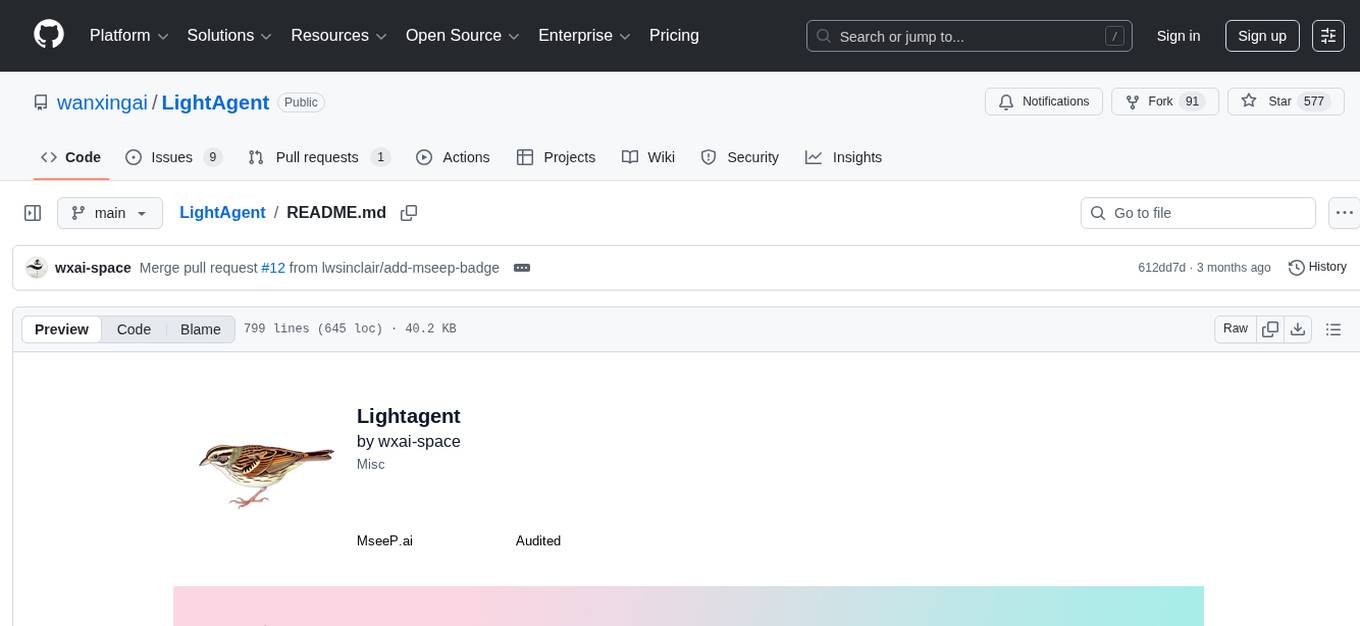
LightAgent
LightAgent is a lightweight, open-source active Agentic AI development framework with memory, tools, and a tree of thought. It supports multi-agent collaboration, autonomous learning, tool integration, complex goals, and multi-model support. It enables simpler self-learning agents, seamless integration with major chat frameworks, and quick tool generation. LightAgent also supports memory modules, tool integration, tree of thought planning, multi-agent collaboration, streaming API, agent self-learning, Langfuse log tracking, and agent assessment. It is compatible with various large models and offers features like intelligent customer service, data analysis, automated tools, and educational assistance.
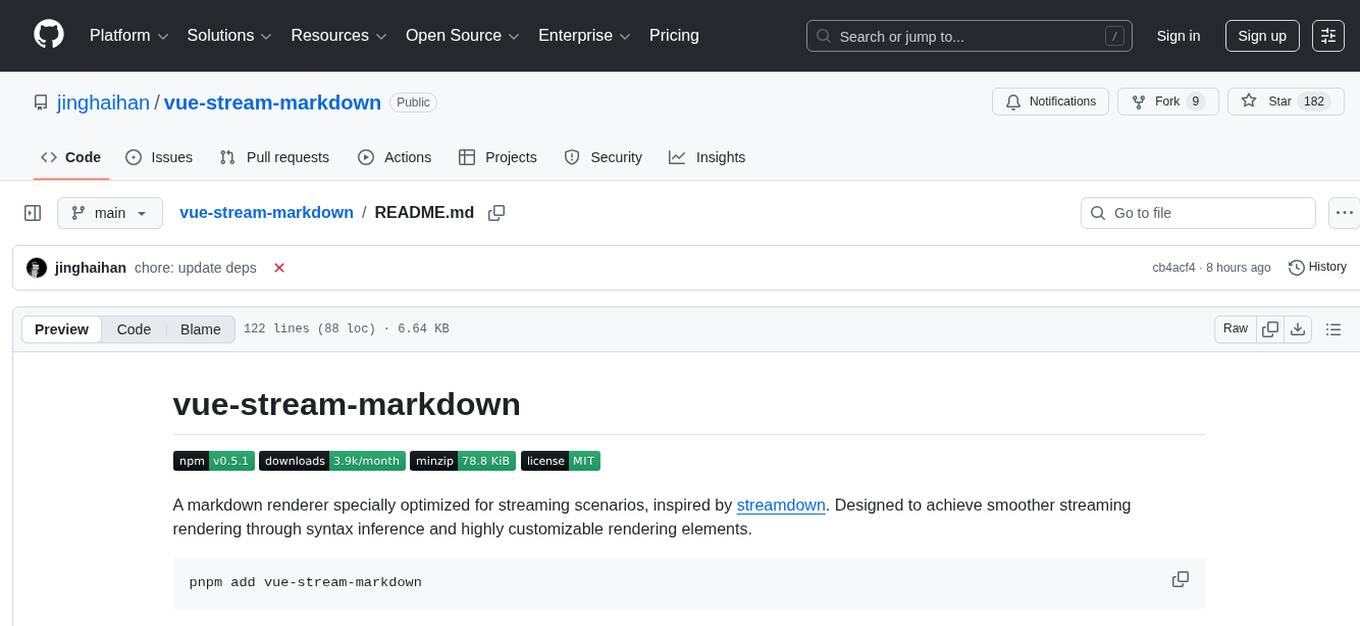
vue-stream-markdown
A markdown renderer optimized for streaming scenarios, providing smoother rendering through syntax inference and customizable elements. Features include streaming-optimized rendering, incremental rendering, progressive Mermaid rendering, streaming LaTeX rendering, interactive controls, full customization, theme-aware styles, built-in typography, content hardening & security, and SSR support. Inspired by streamdown, leveraging mdast, Shiki, Mermaid, beautiful-mermaid, KaTeX, and Remend. Acknowledges markstream-vue, ast-explorer, medium-zoom, markdown-sanitizers, and Dify. Troubleshooting support for debugging streaming rendering issues.
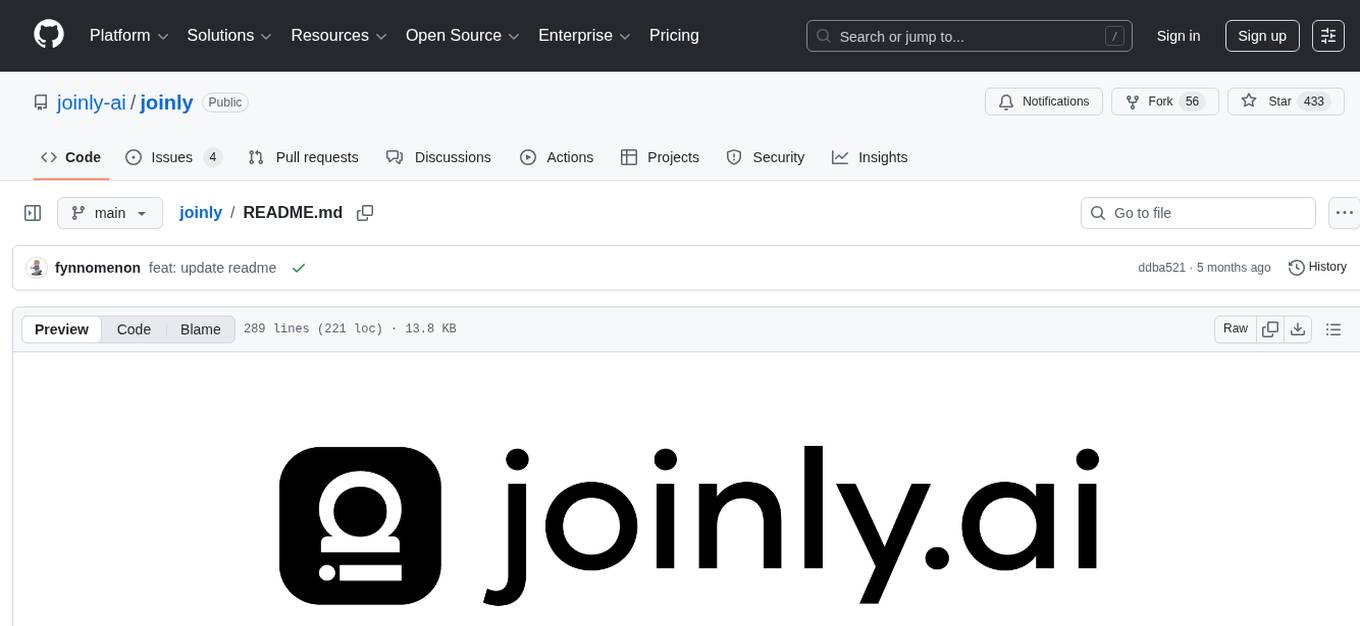
joinly
joinly.ai is a connector middleware designed to enable AI agents to actively participate in video calls, providing essential meeting tools for AI agents to perform tasks and interact in real time. It supports live interaction, conversational flow, cross-platform compatibility, bring-your-own-LLM, and choose-your-preferred-TTS/STT services. The tool is 100% open-source, self-hosted, and privacy-first, aiming to make meetings accessible to AI agents by joining and participating in video calls.
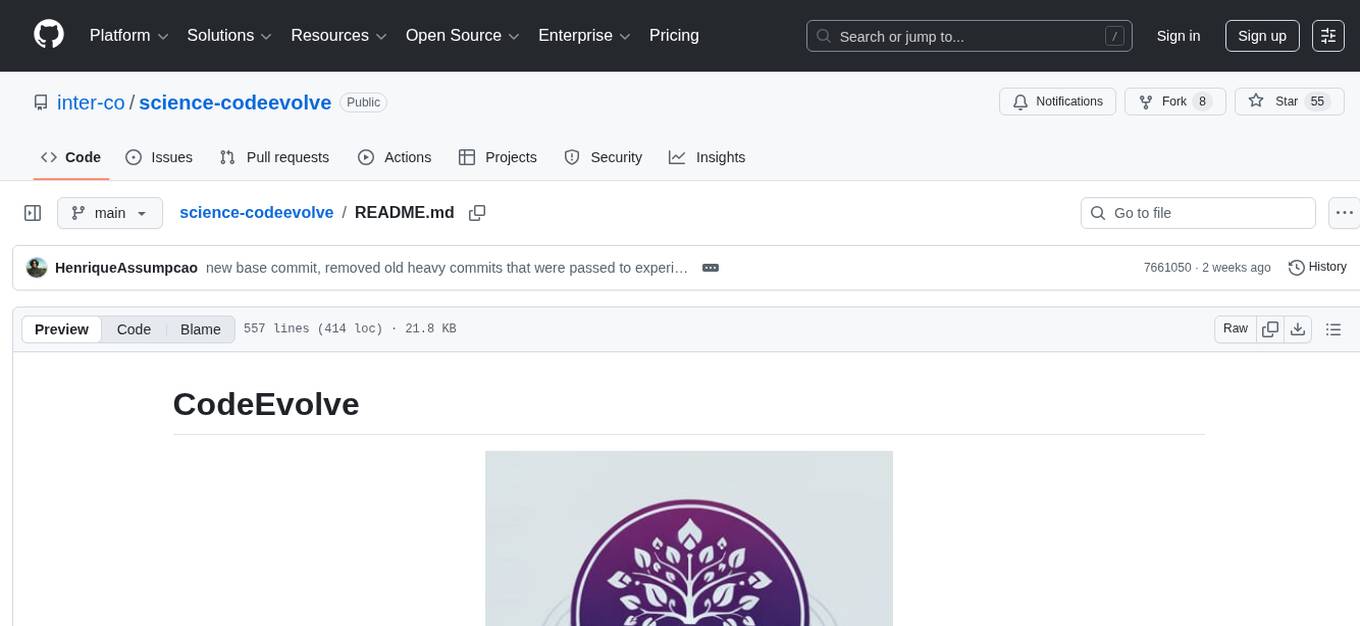
science-codeevolve
CodeEvolve is an open-source framework that combines large language models with evolutionary algorithms to discover and optimize high-performing code solutions. It democratizes algorithmic discovery by making LLM-driven evolutionary search transparent, reproducible, and accessible. CodeEvolve provides a modular foundation for automated code synthesis guided by quantifiable metrics, addressing meta-optimization tasks where complex optimization problems need to be solved. The framework features islands-based genetic algorithm, modular evolutionary operators, quality-diversity optimization, flexible LLM integration, and distributed islands for efficient exploration. Core components include CLI entry point, process runner, evolution engine, program database, exploration schedulers, evaluator, islands coordinator, LLM interface, prompt sampler, and utilities. CodeEvolve demonstrates superior performance on algorithm-discovery benchmarks and is suitable for mathematical discovery, algorithm design, scientific discovery, and software optimization. Reproducibility and determinism are emphasized, with seedable internal algorithmic decisions. Contributions from the community are welcome, focusing on new selection policies, LLM integrations, benchmark problems, documentation, performance optimizations, and bug fixes.
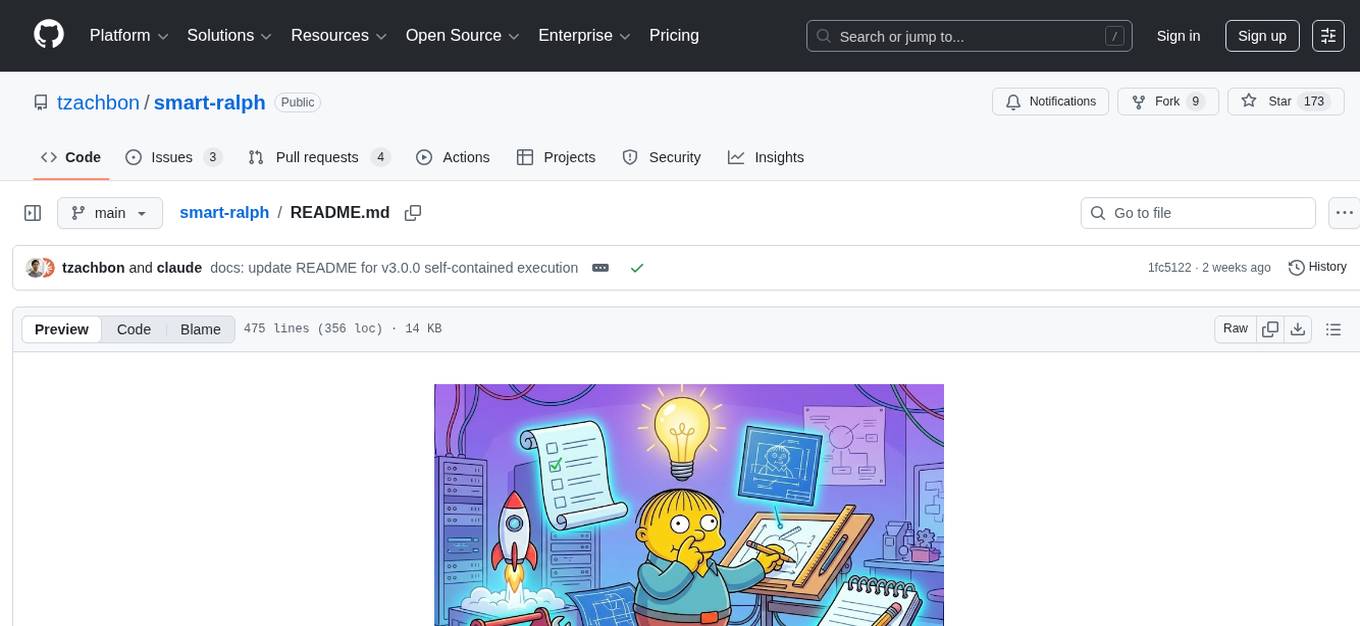
smart-ralph
Smart Ralph is a Claude Code plugin designed for spec-driven development. It helps users turn vague feature ideas into structured specs and executes them task-by-task. The tool operates within a self-contained execution loop without external dependencies, providing a seamless workflow for feature development. Named after the Ralph agentic loop pattern, Smart Ralph simplifies the development process by focusing on the next task at hand, akin to the simplicity of the Springfield student, Ralph.
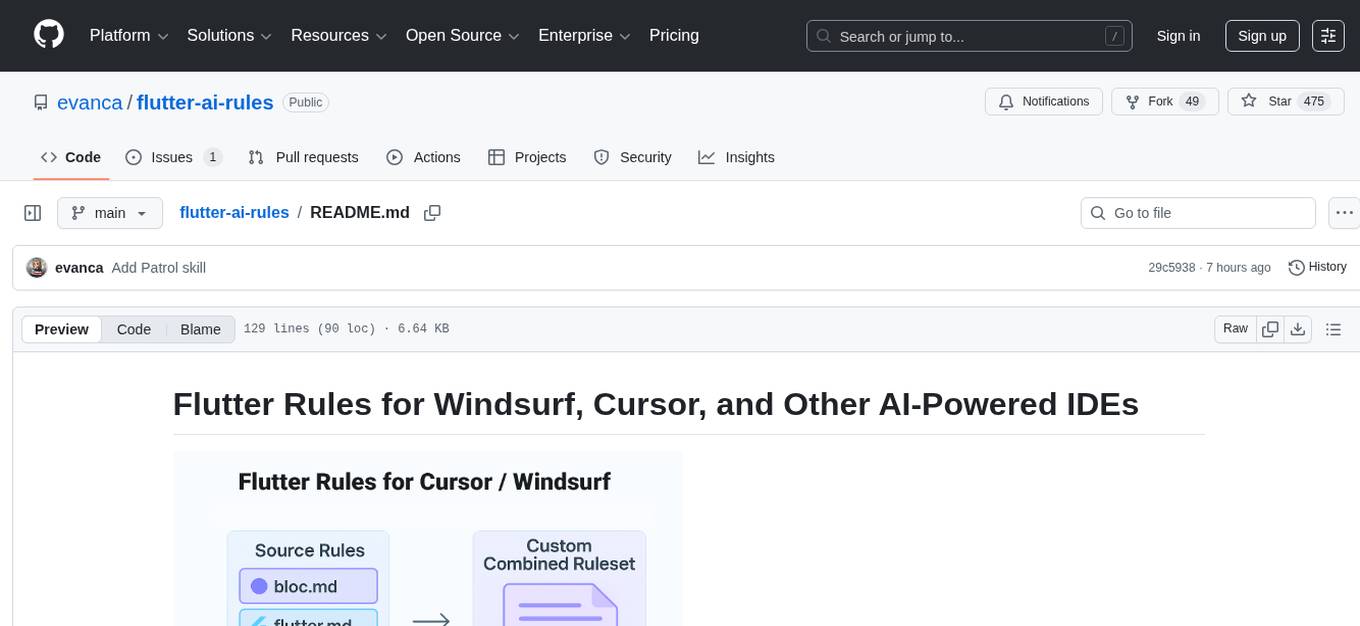
flutter-ai-rules
This repository provides a comprehensive collection of Flutter-related rules tailored for use with AI-powered IDEs like Windsurf and Cursor. The rules aim to improve development workflow, ensure consistency, and maximize the benefits of AI coding assistants. Users can choose pre-made combined rules or individual rule files to set up global or local rules configurations in their IDE. The rules are sourced from official documentation to maintain objectivity, and users can contribute by suggesting new rules or improvements following the provided guidelines.
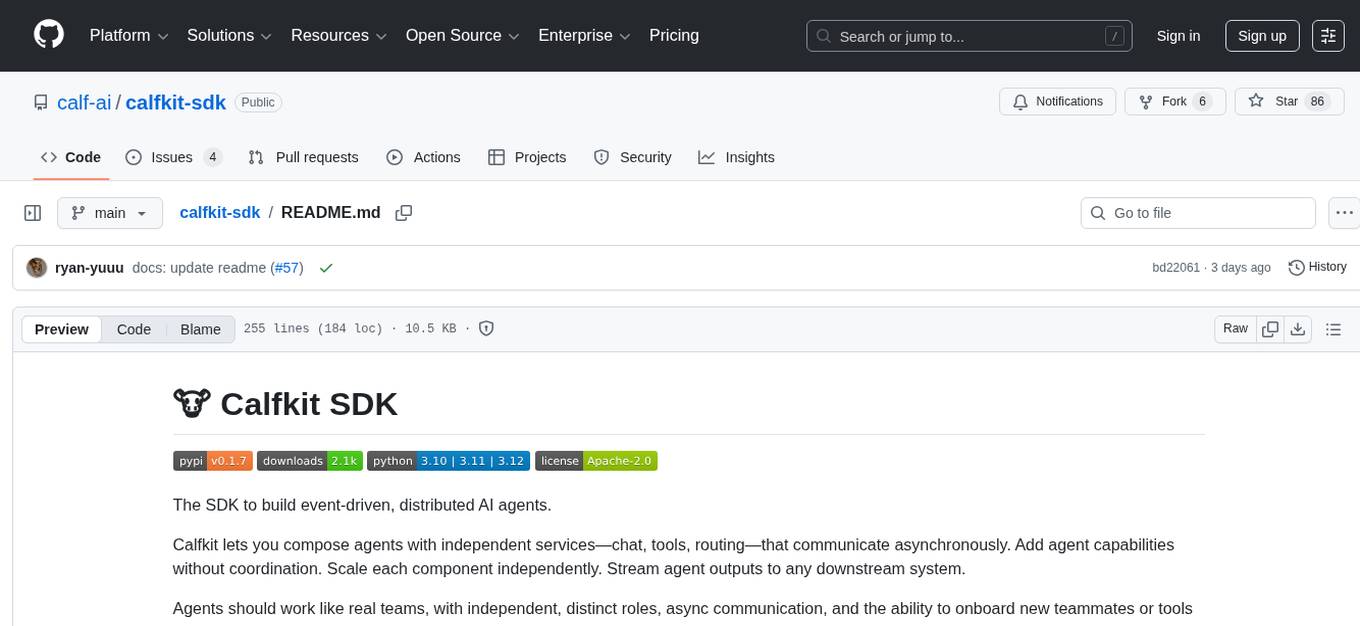
calfkit-sdk
The Calfkit SDK is a Python SDK designed to build event-driven, distributed AI agents. It allows users to compose agents with independent services such as chat, tools, and routing that communicate asynchronously. The SDK enables users to add agent capabilities without coordination, scale each component independently, and stream agent outputs to any downstream system. Calfkit aims to create AI employees that integrate seamlessly into existing systems by providing benefits like loose coupling, horizontal scalability, and event persistence for reliable message delivery.
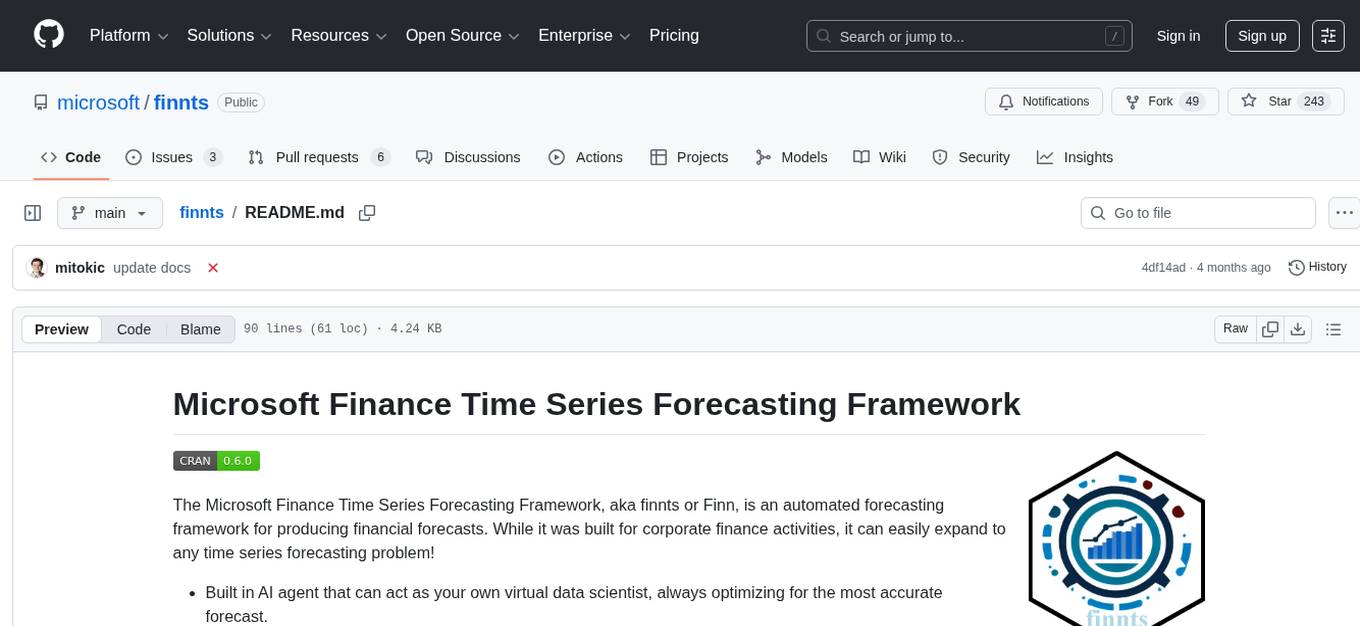
finnts
The Microsoft Finance Time Series Forecasting Framework, aka finnts or Finn, is an automated forecasting framework for producing financial forecasts. It includes an AI agent for accurate forecasting, automated feature engineering and model selection, access to 25+ models, Azure integration for parallel processing, and support for various forecast intervals and external regressors.
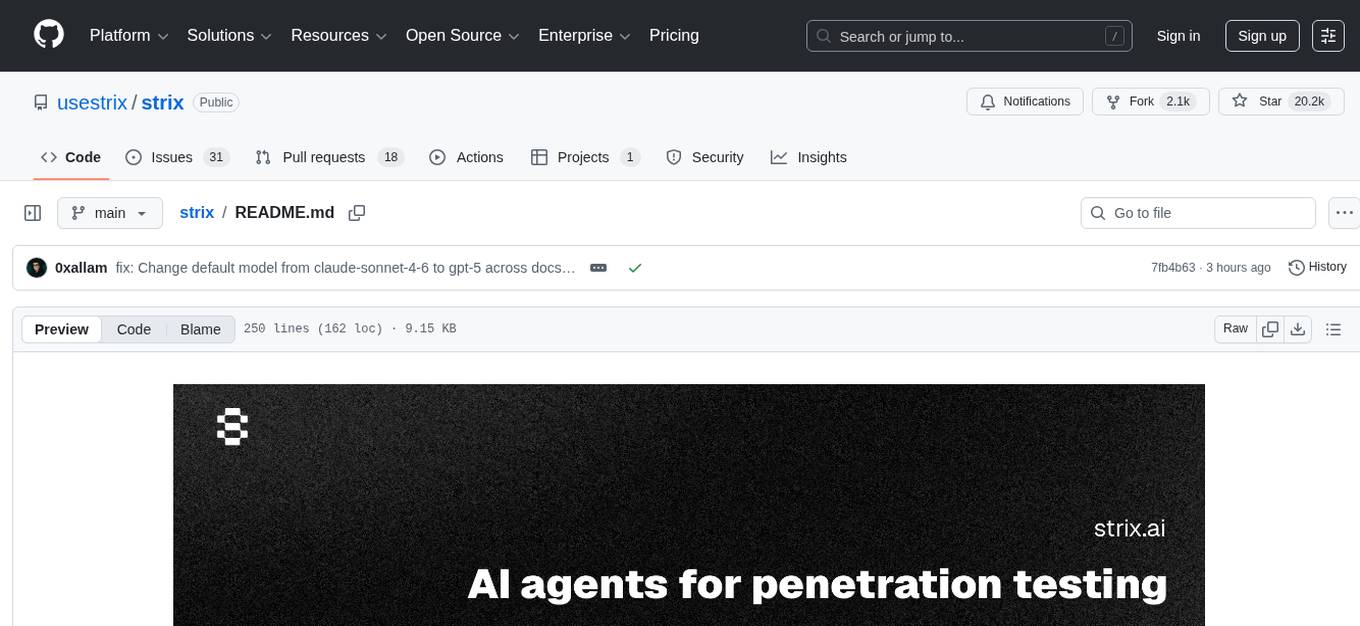
strix
Strix is an open-source AI tool designed to help developers and security teams find and fix vulnerabilities in applications. It offers a full hacker toolkit, teams of autonomous AI agents for collaboration, real validation with proof-of-concepts, a developer-first CLI with actionable reports, and auto-fix & reporting features. Strix can be used for application security testing, rapid penetration testing, bug bounty automation, and CI/CD integration. It provides comprehensive vulnerability detection for various security issues and offers advanced multi-agent orchestration for security testing. The tool supports basic and advanced testing scenarios, headless mode for automated jobs, and CI/CD integration with GitHub Actions. Strix also offers configuration options for optimal performance and recommends specific AI models for best results. Full documentation is available at docs.strix.ai, and contributions to the project are welcome.
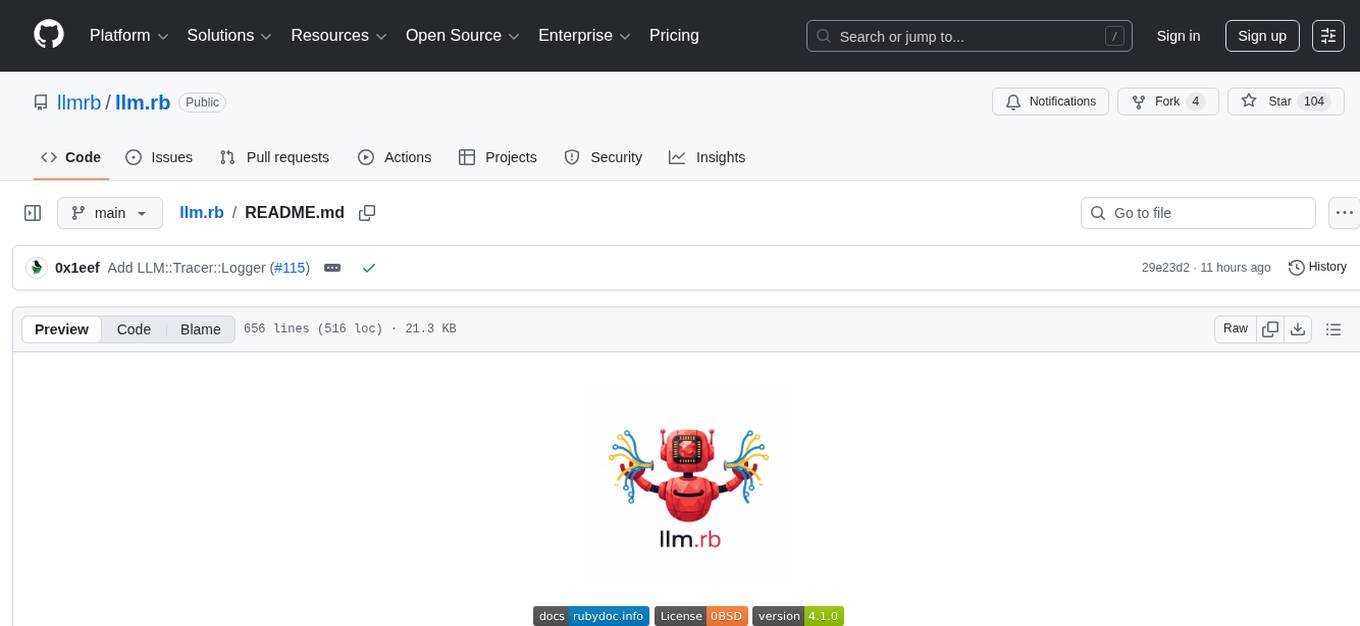
llm.rb
llm.rb is a zero-dependency Ruby toolkit for Large Language Models that includes various providers like OpenAI, Gemini, Anthropic, xAI (Grok), zAI, DeepSeek, Ollama, and LlamaCpp. It provides full support for chat, streaming, tool calling, audio, images, files, and structured outputs. The toolkit offers features like unified API across providers, pluggable JSON adapters, tool calling, JSON Schema structured output, streaming responses, TTS, transcription, translation, image generation, files API, multimodal prompts, embeddings, models API, OpenAI vector stores, and more.
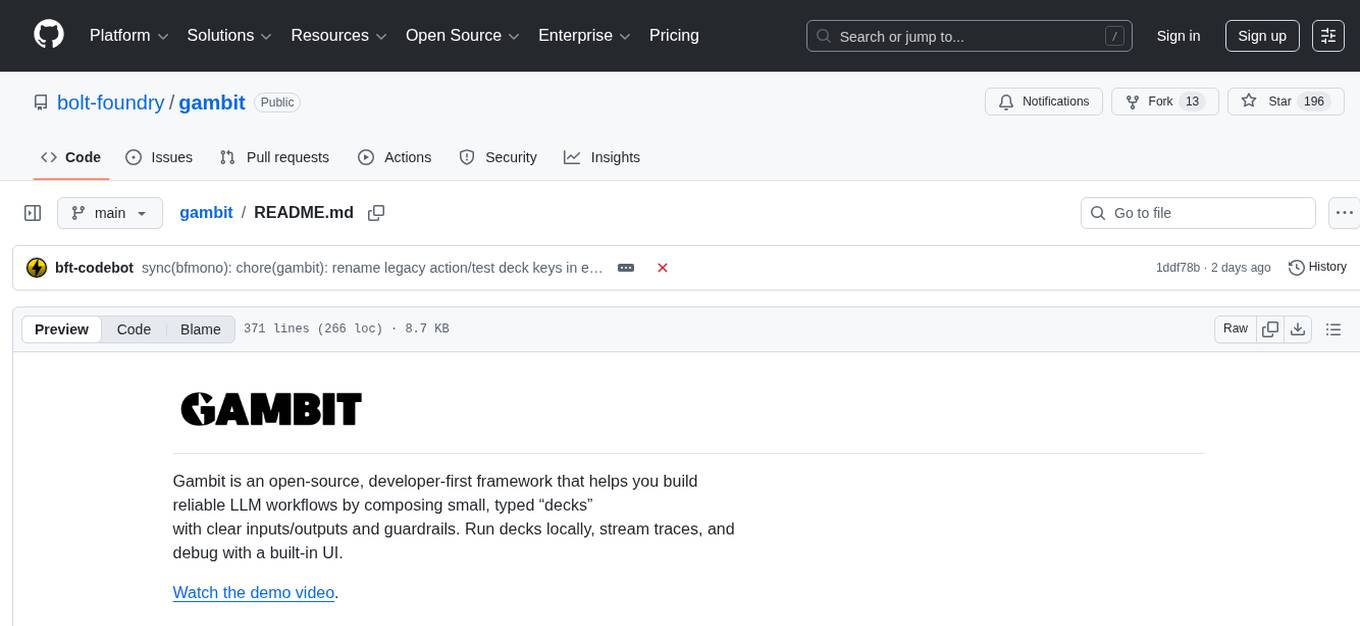
gambit
Gambit is an open-source developer-first framework for building reliable LLM workflows. It helps compose small, typed 'decks' with clear inputs/outputs and guardrails. Users can run decks locally, stream traces, and debug with a built-in UI. The framework aims to improve orchestration by treating each step as a small deck, mixing LLM and compute tasks effortlessly, feeding models only necessary information, and providing built-in observability for debugging.
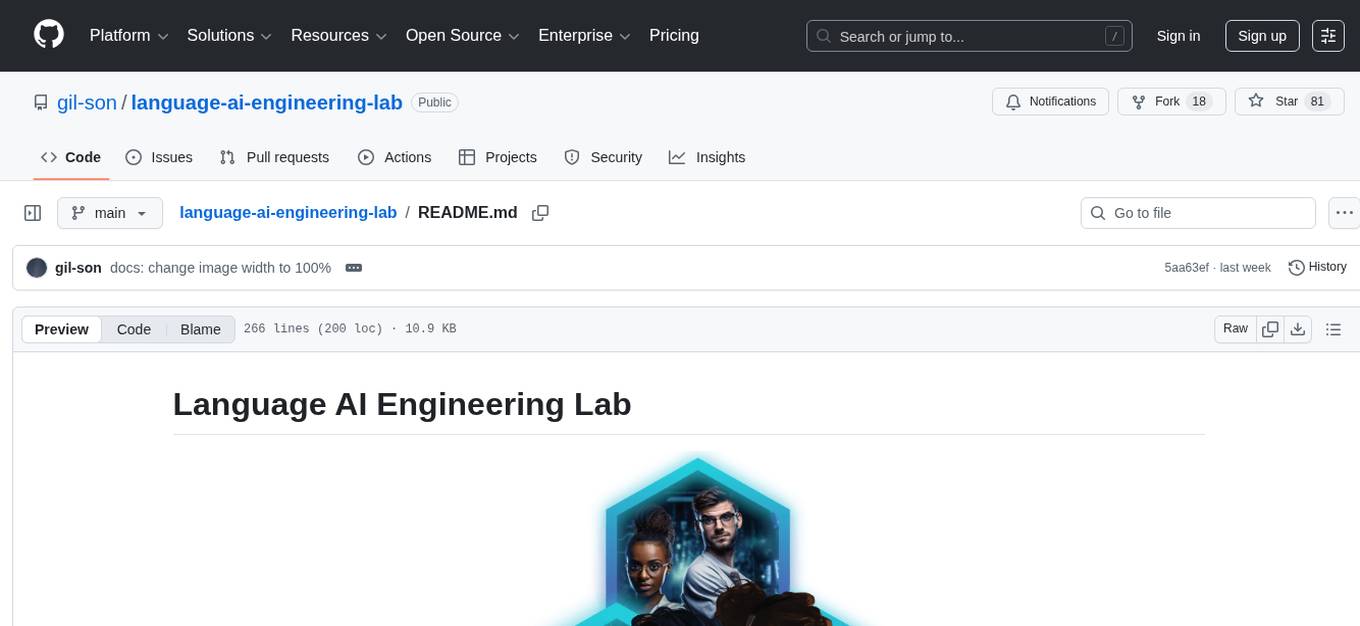
language-ai-engineering-lab
The Language AI Engineering Lab is a structured repository focusing on Generative AI, guiding users from language fundamentals to production-ready Language AI systems. It covers topics like NLP, Transformers, Large Language Models, and offers hands-on learning paths, practical implementations, and end-to-end projects. The repository includes in-depth concepts, diagrams, code examples, and videos to support learning. It also provides learning objectives for various areas of Language AI engineering, such as NLP, Transformers, LLM training, prompt engineering, context management, RAG pipelines, context engineering, evaluation, model context protocol, LLM orchestration, agentic AI systems, multimodal models, MLOps, LLM data engineering, and domain applications like IVR and voice systems.
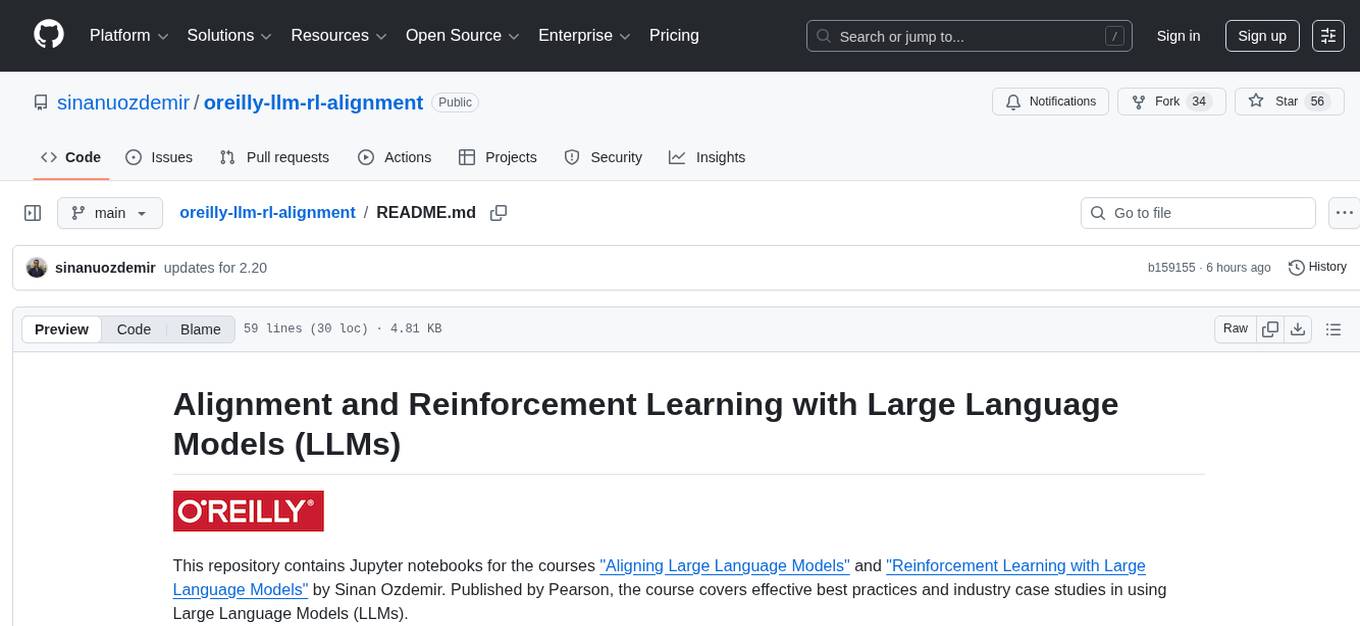
oreilly-llm-rl-alignment
This repository contains Jupyter notebooks for the courses 'Aligning Large Language Models' and 'Reinforcement Learning with Large Language Models' by Sinan Ozdemir. It covers effective best practices and industry case studies in using Large Language Models (LLMs). The courses provide in-depth exploration of alignment techniques, evaluation methods, ethical considerations, and reinforcement learning concepts with practical applications. Participants will gain theoretical insights and hands-on experience in working with LLMs, including fine-tuning models and understanding advanced concepts like RLHF, RLAIF, and Constitutional AI.
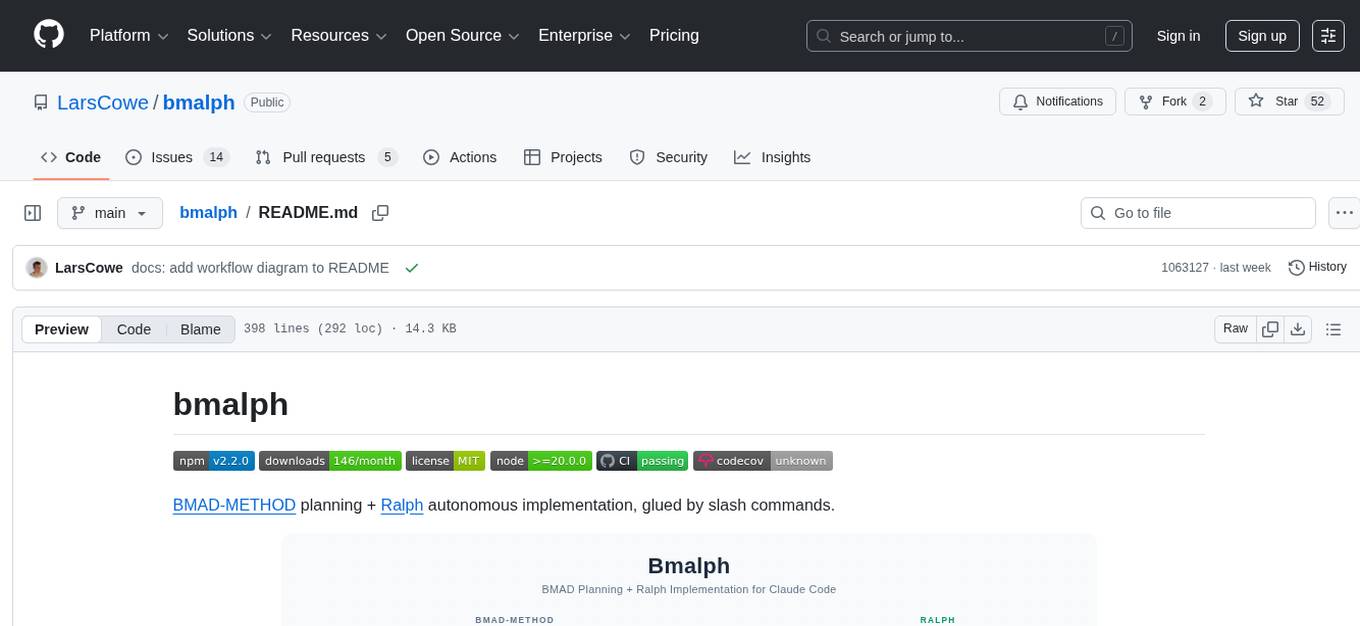
bmalph
bmalph is a tool that bundles and installs two AI development systems, BMAD-METHOD for planning agents and workflows (Phases 1-3) and Ralph for autonomous implementation loop (Phase 4). It provides commands like `bmalph init` to install both systems, `bmalph upgrade` to update to the latest versions, `bmalph doctor` to check installation health, and `/bmalph-implement` to transition from BMAD to Ralph. Users can work through BMAD phases 1-3 with commands like BP, MR, DR, CP, VP, CA, etc., and then transition to Ralph for implementation.
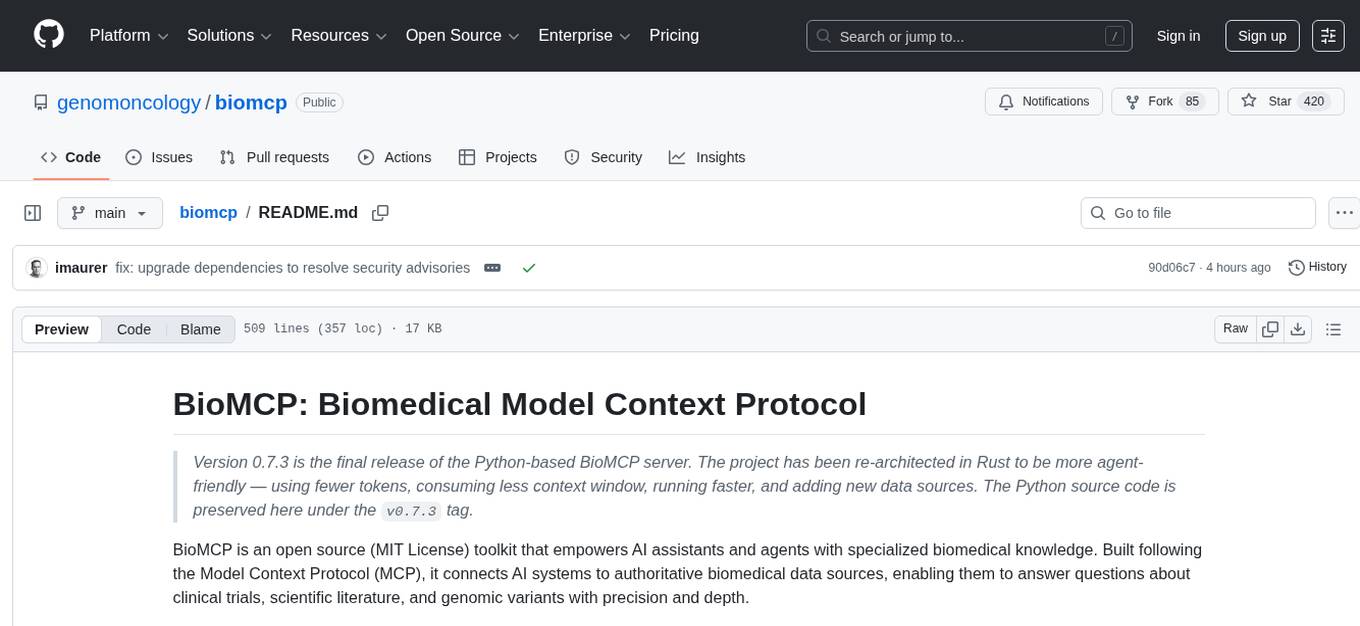
biomcp
BioMCP is an open source toolkit that empowers AI assistants and agents with specialized biomedical knowledge. It follows the Model Context Protocol (MCP) to connect AI systems to authoritative biomedical data sources, enabling precise answers about clinical trials, scientific literature, and genomic variants. It provides structured access to various biomedical data sources, supports natural language queries, and functions as an MCP server for AI assistants and agents. BioMCP integrates with literature sources like PubMed and bioRxiv, clinical and genomic sources like ClinicalTrials.gov and MyVariant.info, and regulatory and safety sources like OpenFDA. It offers 24 specialized tools for biomedical research, including core tools like Think Tool, Search Tool, and Fetch Tool, as well as individual tools for articles, trials, variants, NCI-specific data, genes, diseases, and drugs. BioMCP can be run locally or as an HTTP server, supports Docker deployment, and provides a comprehensive CLI for database interaction.
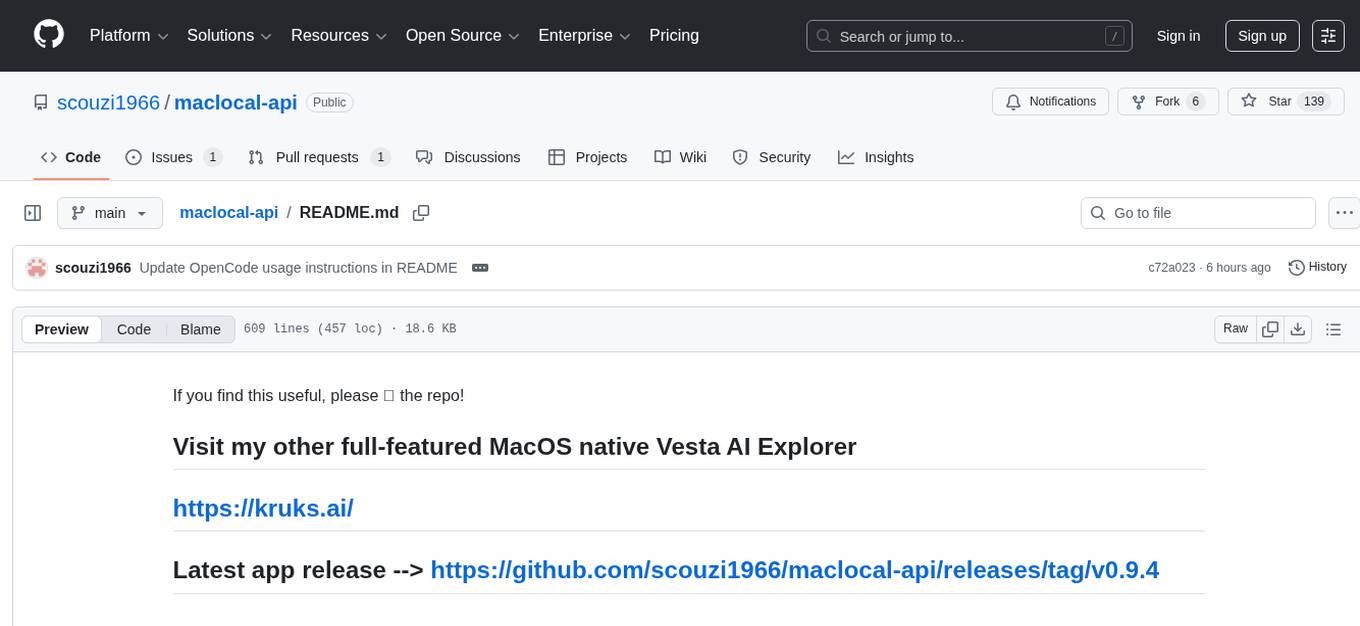
maclocal-api
MacLocalAPI is a macOS server application that exposes Apple's Foundation Models through OpenAI-compatible API endpoints. It allows users to run Apple Intelligence locally with full OpenAI API compatibility. The tool supports MLX local models, API gateway mode, LoRA adapter support, Vision OCR, built-in WebUI, privacy-first processing, fast and lightweight operation, easy integration with existing OpenAI client libraries, and provides token consumption metrics. Users can install MacLocalAPI using Homebrew or pip, and it requires macOS 26 or later, an Apple Silicon Mac, and Apple Intelligence enabled in System Settings. The tool is designed for easy integration with Python, JavaScript, and open-webui applications.
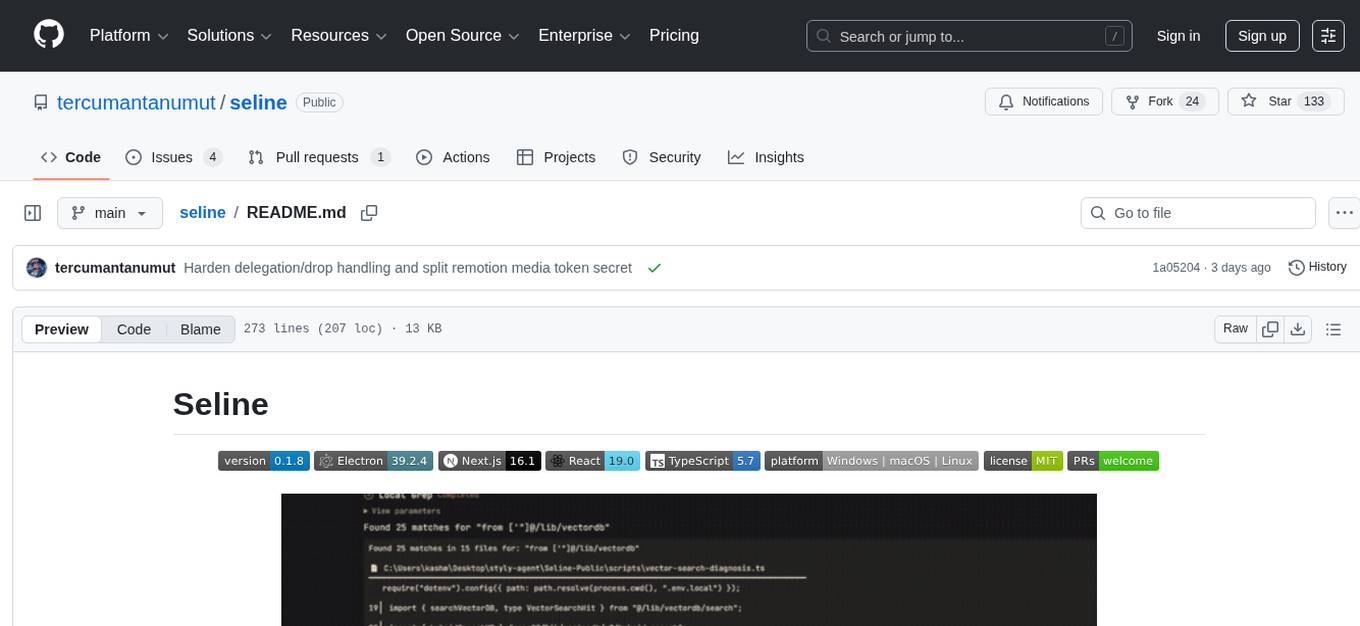
seline
Seline is a local-first AI desktop application that integrates conversational AI, visual generation tools, vector search, and multi-channel connectivity. It allows users to connect WhatsApp, Telegram, or Slack to create always-on bots with full context and background task delivery. The application supports multi-channel connectivity, deep research mode, local web browsing with Puppeteer, local knowledge and privacy features, visual and creative tools, automation and agents, developer experience enhancements, and more. Seline is actively developed with a focus on improving user experience and functionality.
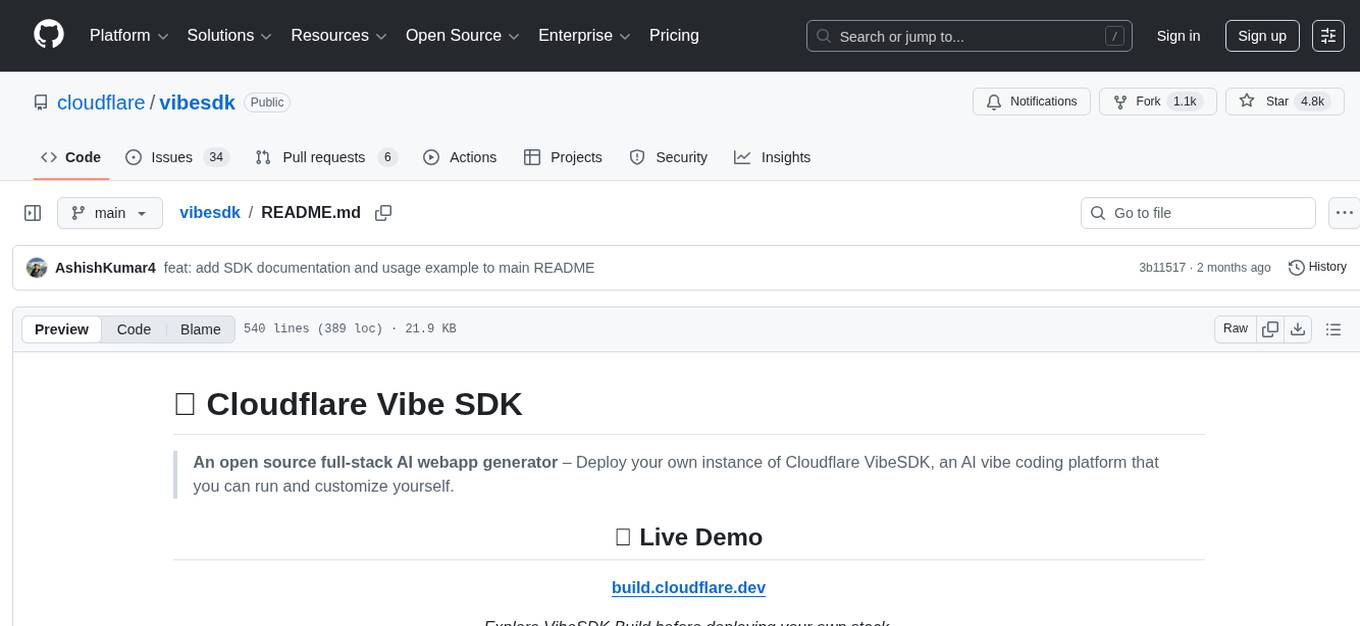
vibesdk
Cloudflare VibeSDK is an open source full-stack AI webapp generator built on Cloudflare's developer platform. It allows companies to build AI-powered platforms, enables internal development for non-technical teams, and supports SaaS platforms to extend product functionality. The platform features AI code generation, live previews, interactive chat, modern stack generation, one-click deploy, and GitHub integration. It is built on Cloudflare's platform with frontend in React + Vite, backend in Workers with Durable Objects, database in D1 (SQLite) with Drizzle ORM, AI integration via multiple LLM providers, sandboxed app previews and execution in containers, and deployment to Workers for Platforms with dispatch namespaces. The platform also offers an SDK for programmatic access to build apps programmatically using TypeScript SDK.
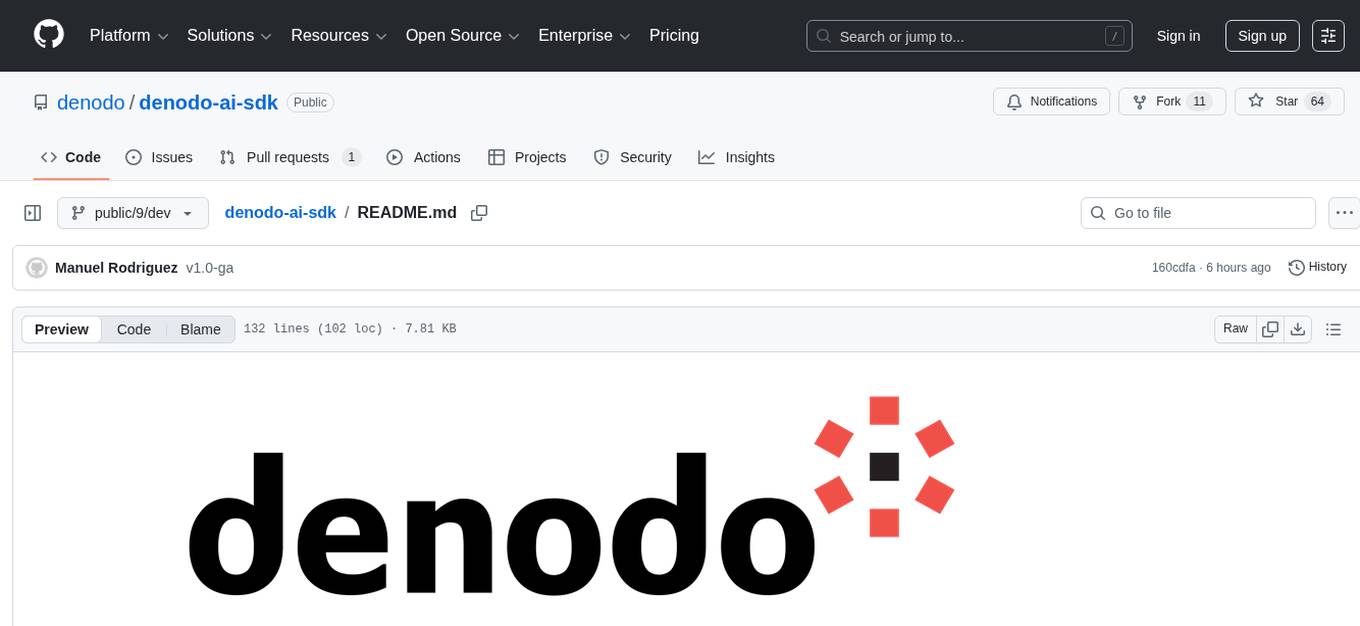
denodo-ai-sdk
Denodo AI SDK is a tool that enables users to create AI chatbots and agents that provide accurate and context-aware answers using enterprise data. It connects to the Denodo Platform, supports popular LLMs and vector stores, and includes a sample chatbot and simple APIs for quick setup. The tool also offers benchmarks for evaluating LLM performance and provides guidance on configuring DeepQuery for different LLM providers.
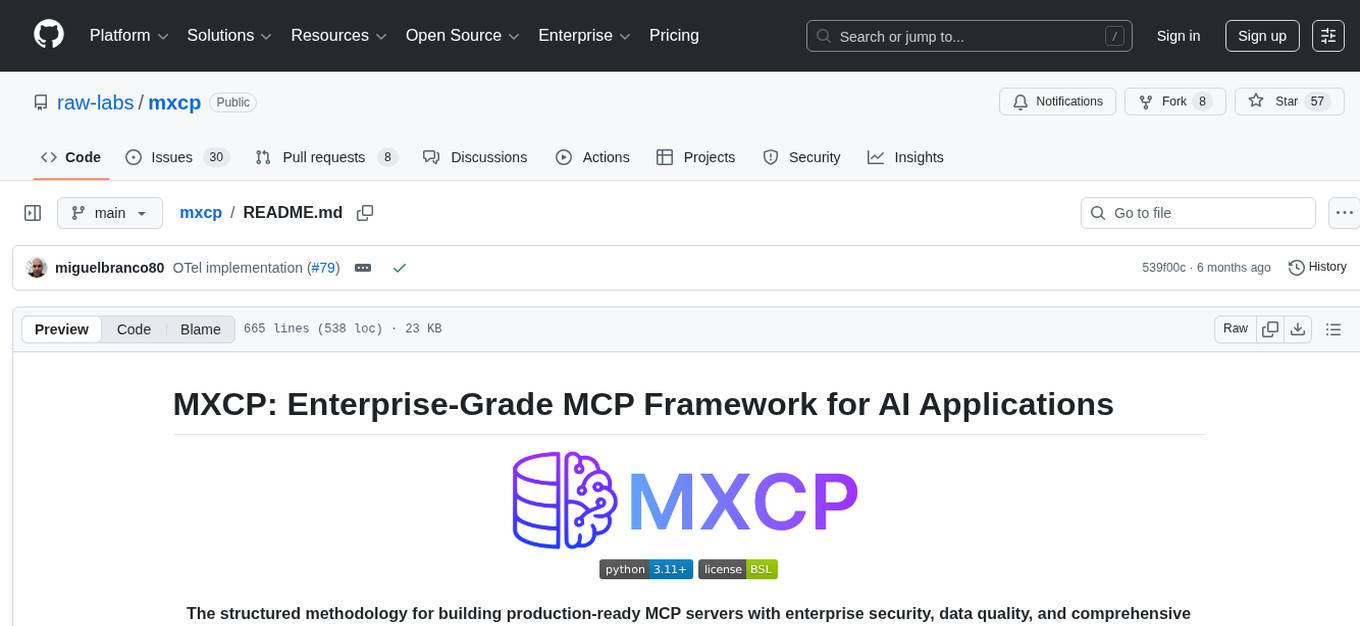
mxcp
MXCP is an enterprise-grade MCP framework for building production-ready AI applications. It provides a structured methodology for data modeling, service design, smart implementation, quality assurance, and production operations. With built-in enterprise features like security, audit trail, type safety, testing framework, performance optimization, and drift detection, MXCP ensures comprehensive security, quality, and operations. The tool supports SQL for data queries and Python for complex logic, ML models, and integrations, allowing users to choose the right tool for each job while maintaining security and governance. MXCP's architecture includes LLM client, MXCP framework, implementations, security & policies, SQL endpoints, Python tools, type system, audit engine, validation & tests, data sources, and APIs. The tool enforces an organized project structure and offers CLI commands for initialization, quality assurance, data management, operations & monitoring, and LLM integration. MXCP is compatible with Claude Desktop, OpenAI-compatible tools, and custom integrations through the Model Context Protocol (MCP) specification. The tool is developed by RAW Labs for production data-to-AI workflows and is released under the Business Source License 1.1 (BSL), with commercial licensing required for certain production scenarios.
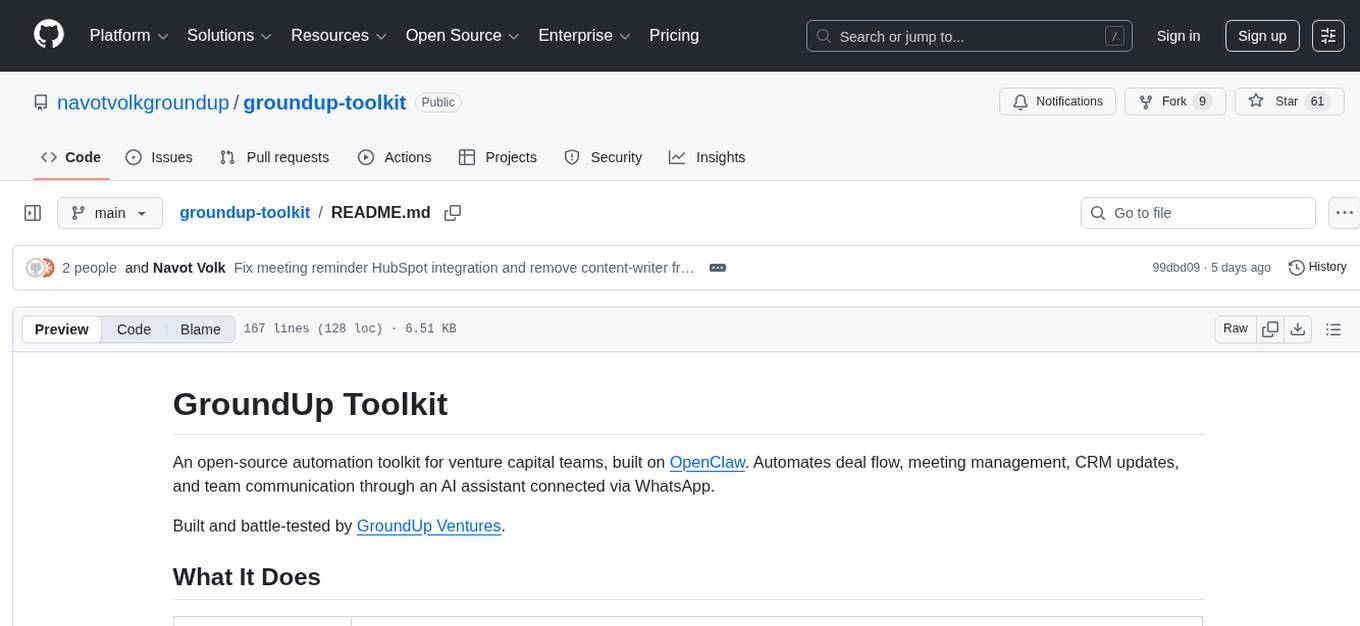
groundup-toolkit
GroundUp Toolkit is an open-source automation toolkit designed for venture capital teams to streamline deal flow, meeting management, CRM updates, and team communication through an AI assistant connected via WhatsApp. It offers various skills such as meeting reminders, meeting bot, deal automation, deck analyzer, VC automation, ping teammate, Google Workspace operations, LinkedIn profile research, keep on radar feature, and deal logger. Additionally, it includes operational scripts for health check, WhatsApp watchdog, and Shabbat-aware scheduler to ensure smooth automation processes. The toolkit's architecture involves WhatsApp, OpenClaw, and various skills and scripts for seamless automation. It requires Ubuntu 22.04+ server, Node.js 18+, and Python 3.10+ for installation and operation.
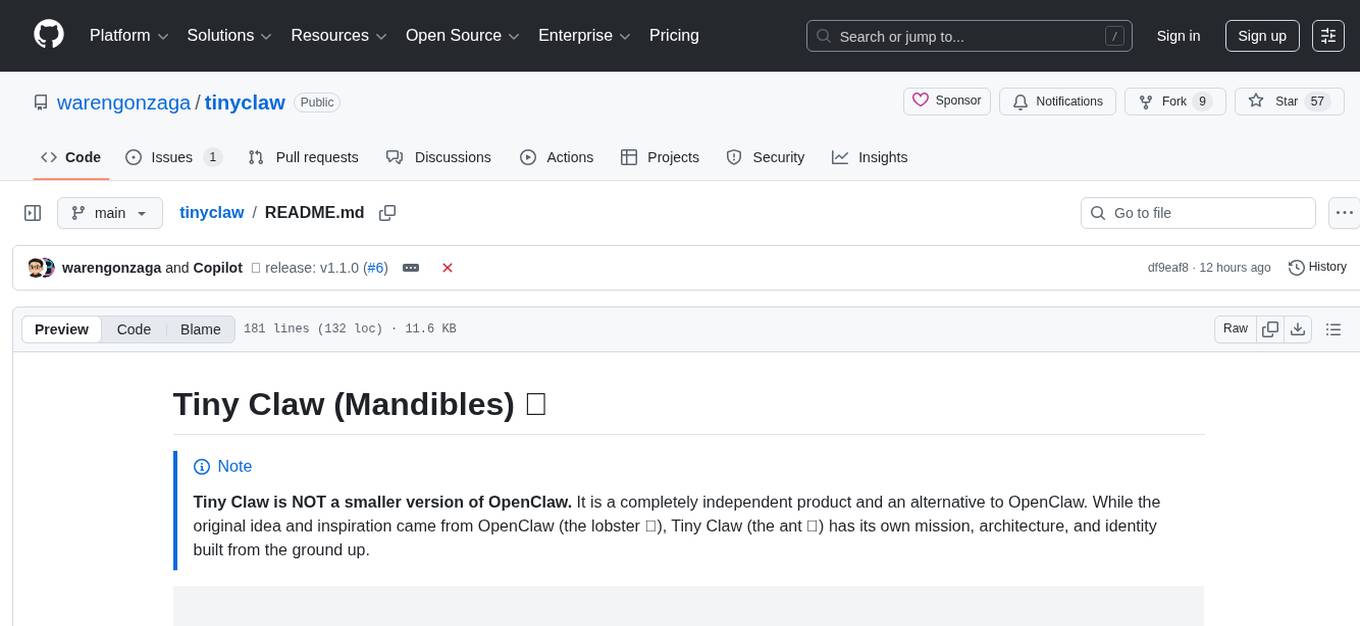
tinyclaw
Tiny Claw (Mandibles) is an autonomous AI companion framework built from scratch with a tiny core, plugin architecture, self-improving memory, and smart routing that tiers queries to cut costs. It aims to make AI simple, affordable, and truly personal, like having your own helpful friend. Inspired by personal AI companions from science fiction, Tiny Claw is designed to assist with work, projects, and daily life, growing with the user over time. The framework features a Discord-like UI, adaptive memory, self-improving behavior, plugin architecture, personality engine, smart routing, context compaction, anti-malware protection, security layers, delegation system, inter-agent communication, easy setup, and multi-provider support.
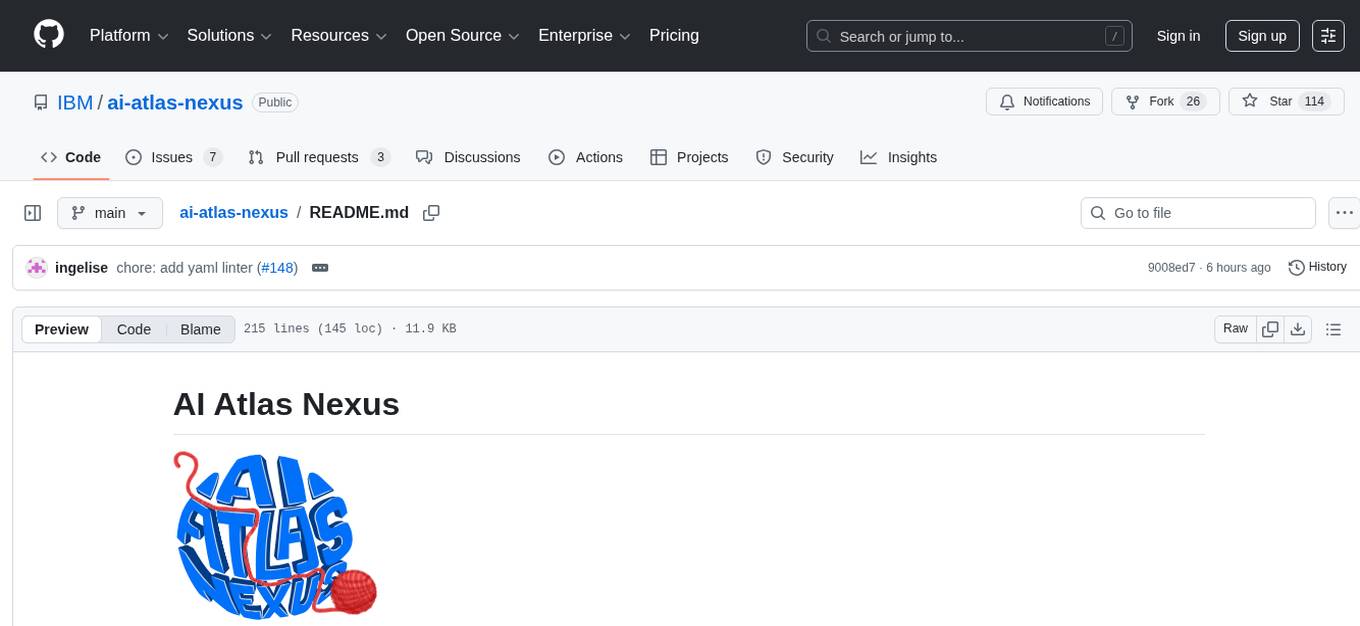
ai-atlas-nexus
AI Atlas Nexus provides tooling to bring together resources related to governance of foundation models. It supports a community-driven approach to curating and cataloguing resources such as datasets, benchmarks, and mitigations. The goal is to streamline AI governance processes by turning abstract risk definitions into actionable workflows. By connecting fragmented resources, AI Atlas Nexus fills a critical gap in AI governance, enabling stakeholders to build more robust, transparent, and accountable systems. The tool builds on the IBM AI Risk Atlas, creating a nexus of governance assets and tooling using a knowledge graph of an AI system to provide a unified structure that links and contextualizes heterogeneous domain data. The project aims to create an open AI Systems ontology focused on risk that the community can extend and enhance, fostering a governance-first approach to AI solutions and inviting contributions to expand its impact.
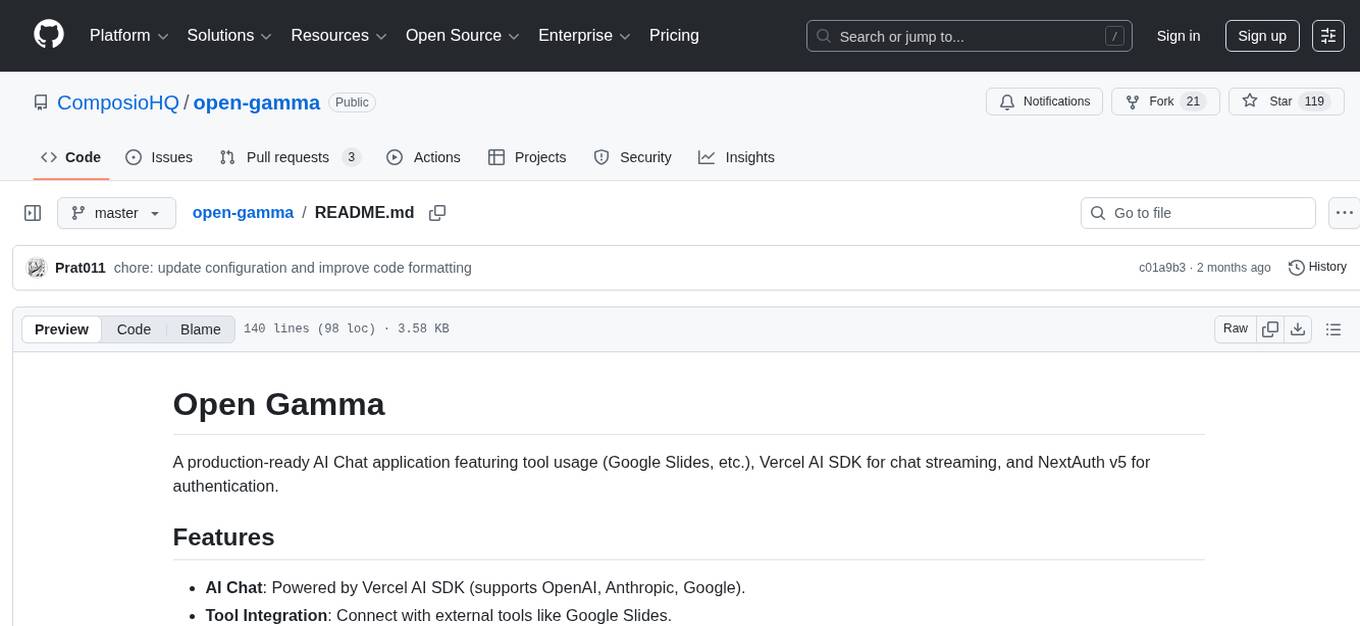
open-gamma
Open Gamma is a production-ready AI Chat application that features tool integration with Google Slides, Vercel AI SDK for chat streaming, and NextAuth v5 for authentication. It utilizes PostgreSQL with Drizzle ORM for database management and is built on Next.js 16 with Tailwind CSS for styling. The application provides AI chat functionality powered by Vercel AI SDK supporting OpenAI, Anthropic, and Google. It offers custom authentication flows and ensures security through request validation and environment validation. Open Gamma is designed to streamline chat interactions, tool integrations, and authentication processes in a secure and efficient manner.
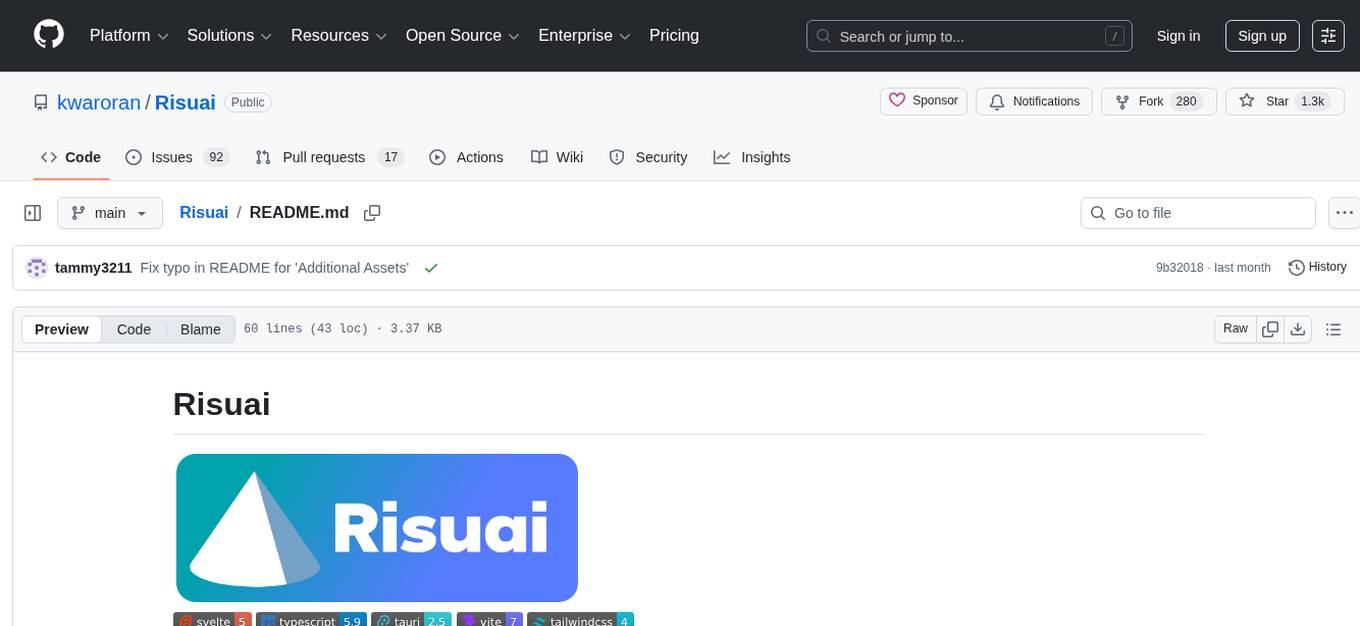
Risuai
Risuai, or Risu for short, is a cross platform AI chatting software/web application with powerful features such as multiple API support, emotion images, group chats, plugins, regex script, powerful translators, lorebook, themes, powerful prompting, customizable UI, TTS, additional assets, long-term memory systems, and more. It offers great accessibility, mobile-friendly UI, and the ability to embed images, audios, and videos to the bot for display during chats or as background elements.
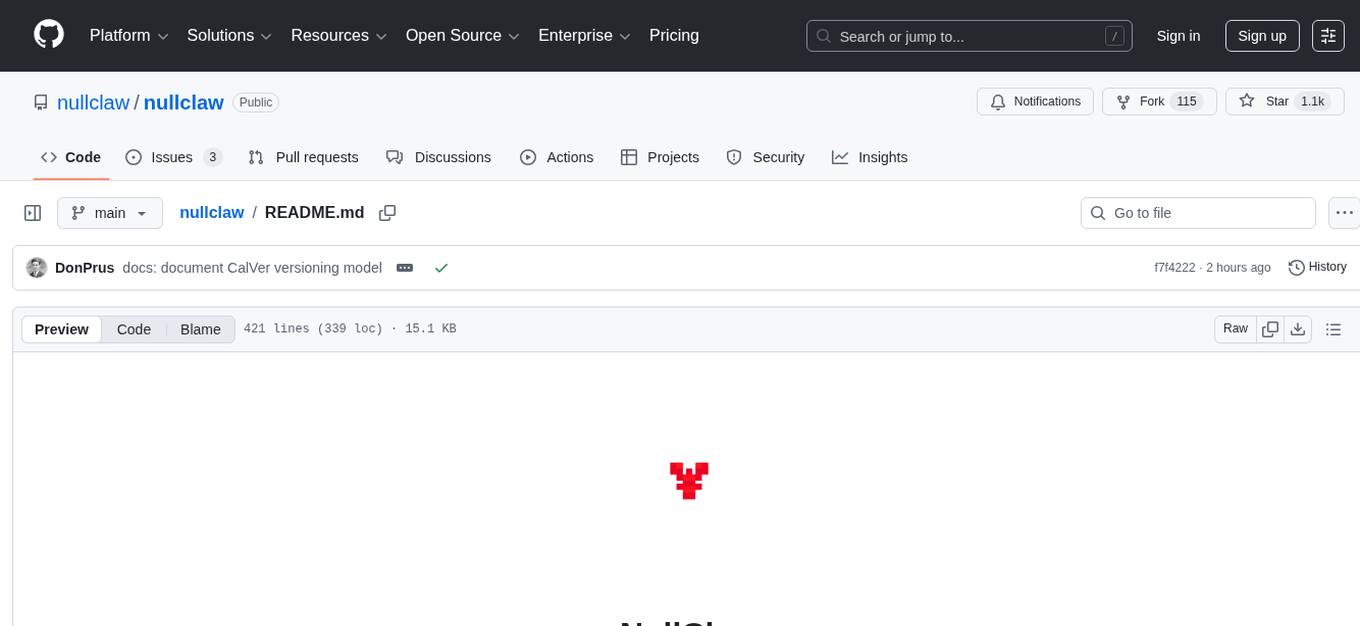
nullclaw
NullClaw is the smallest fully autonomous AI assistant infrastructure, a static Zig binary that fits on any $5 board, boots in milliseconds, and requires nothing but libc. It features an impossibly small 678 KB static binary with no runtime or framework overhead, near-zero memory usage, instant startup, true portability across different CPU architectures, and a feature-complete stack with 22+ providers, 11 channels, and 18+ tools. The tool is lean by default, secure by design, fully swappable with core systems as vtable interfaces, and offers no lock-in with OpenAI-compatible provider support and pluggable custom endpoints.
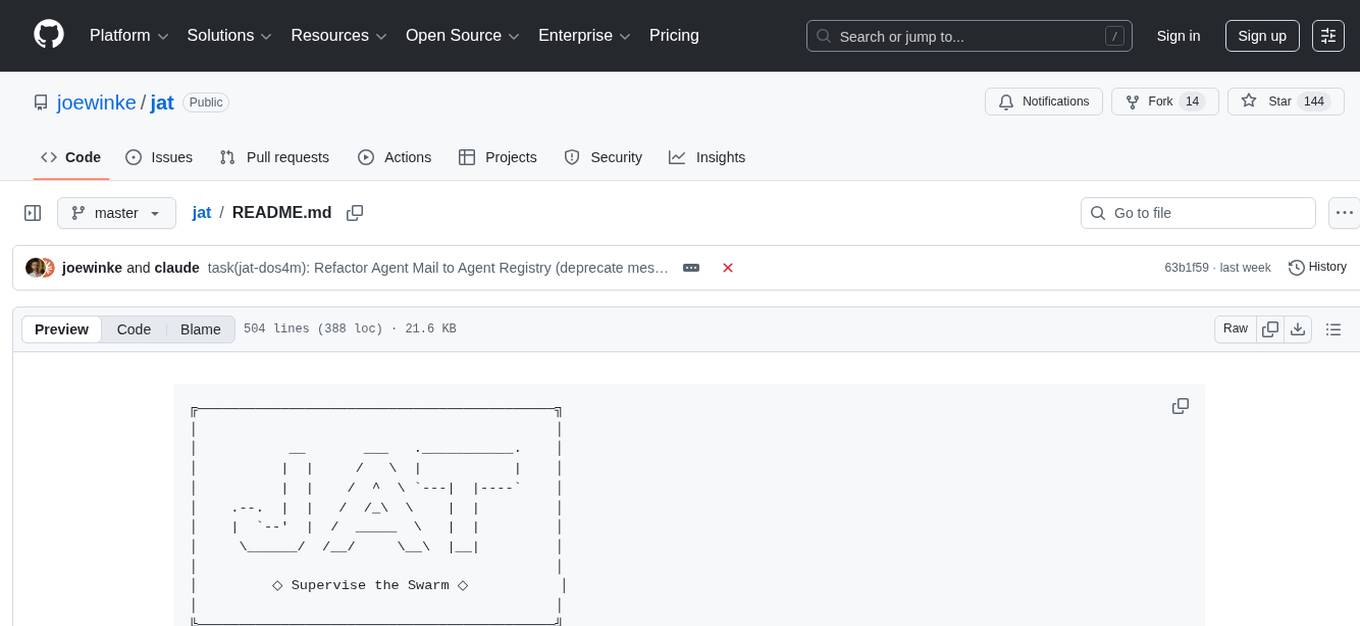
jat
JAT is a complete, self-contained environment for agentic development, offering task management, agent orchestration, code editor, git integration, and terminal access all in a single IDE. It allows users to connect various external sources like RSS, Slack, Telegram, and Gmail to create tasks and spawn agents automatically. JAT supports hands-on supervision of agents or autonomous operation. The tool provides features such as multi-agent management, task management, smart question UI, epic swarm for parallel agent spawning, autonomous triggers, task scheduling, error recovery, and a skill marketplace. JAT is designed to be a control tower for managing a swarm of agents, whether actively supervised or running autonomously.
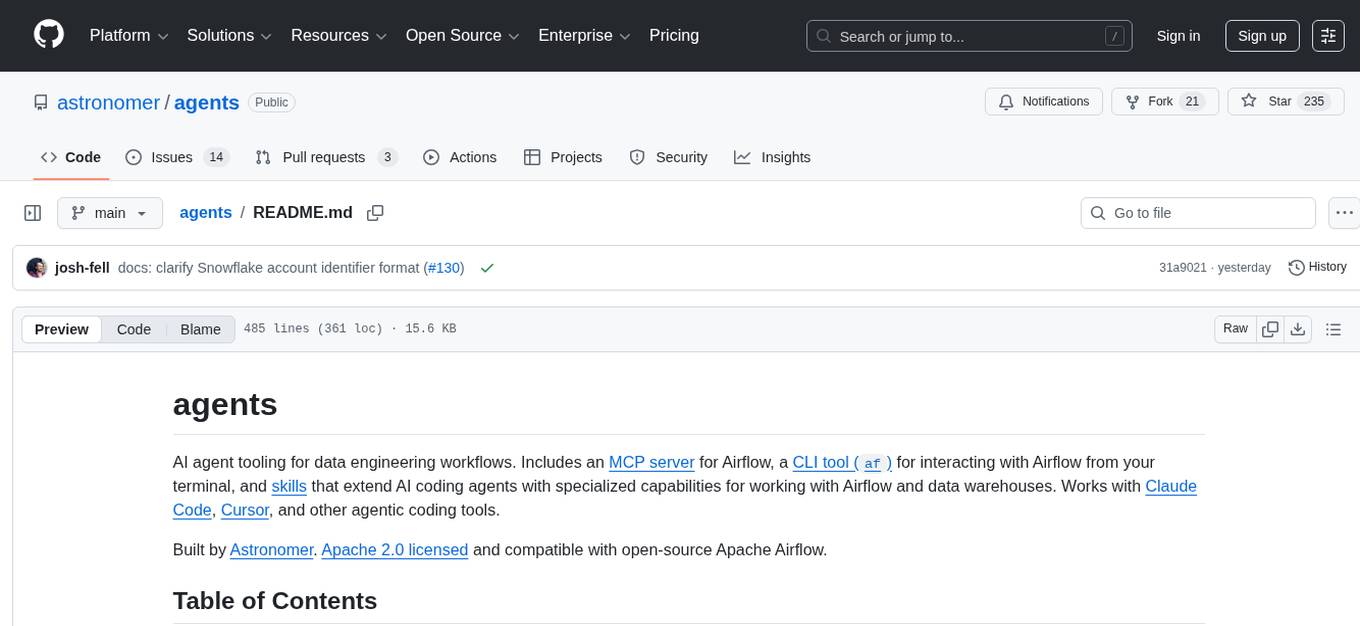
agents
AI agent tooling for data engineering workflows. Includes an MCP server for Airflow, a CLI tool for interacting with Airflow from your terminal, and skills that extend AI coding agents with specialized capabilities for working with Airflow and data warehouses. Works with Claude Code, Cursor, and other agentic coding tools. The tool provides a comprehensive set of features for data discovery & analysis, data lineage, DAG development, dbt integration, migration, and more. It also offers user journeys for data analysis flow and DAG development flow. The Airflow CLI tool allows users to interact with Airflow directly from the terminal. The tool supports various databases like Snowflake, PostgreSQL, Google BigQuery, and more, with auto-detected SQLAlchemy databases. Skills are invoked automatically based on user queries or can be invoked directly using specific commands.
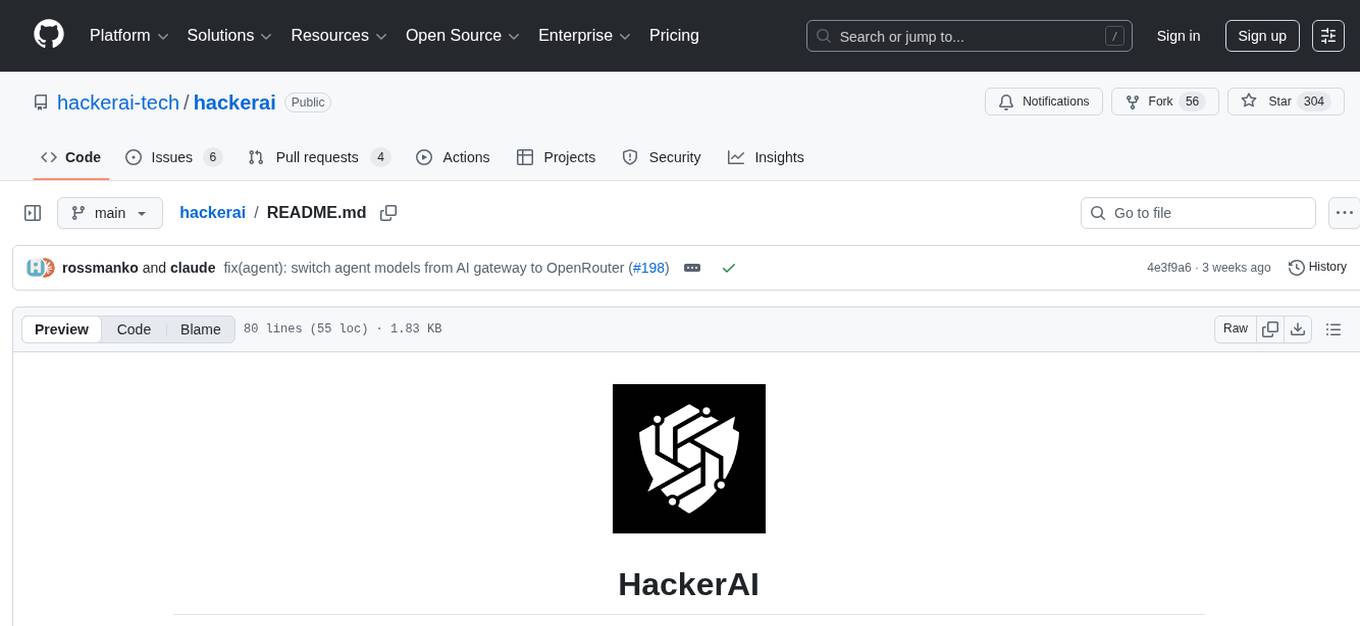
hackerai
HackerAI is an AI-powered penetration testing assistant designed to streamline and enhance the process of conducting penetration testing. It leverages various AI models and tools to provide automated assistance in identifying vulnerabilities and securing systems. The tool integrates with different services for AI models, sandbox environments, database management, authentication, and more. With HackerAI, users can automate tasks related to penetration testing, improve efficiency, and enhance security measures in their systems.
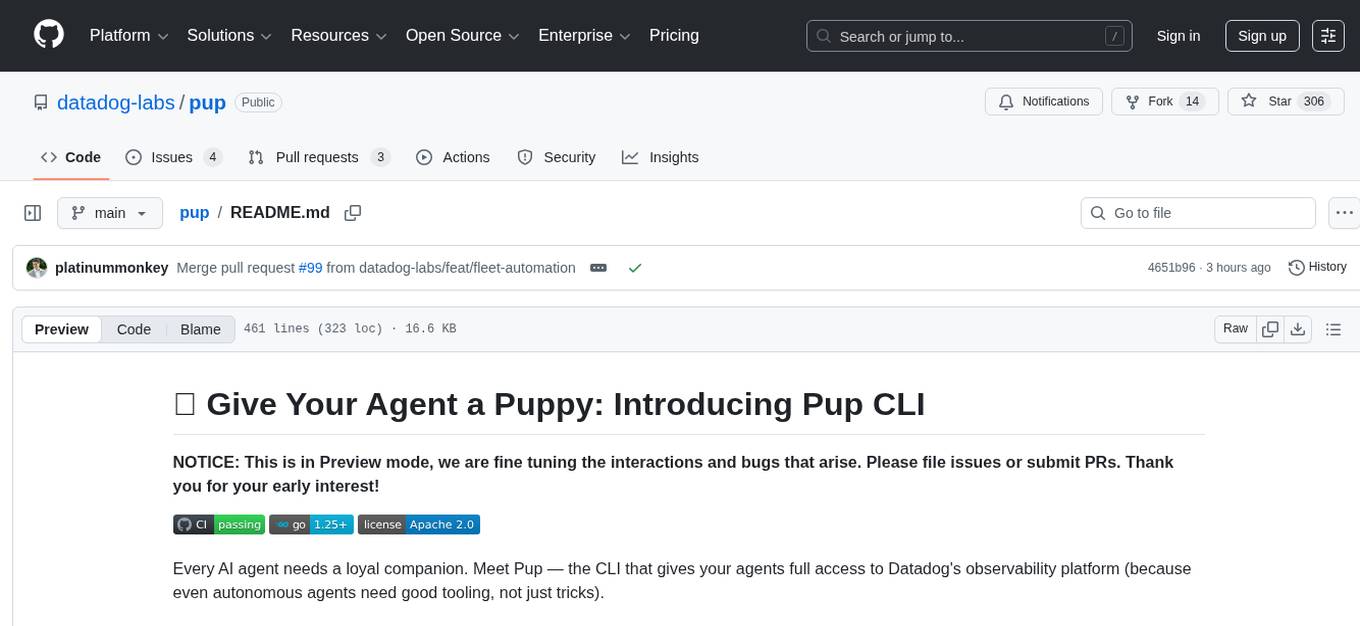
pup
Pup is a CLI tool designed to give AI agents access to Datadog's observability platform. It offers over 200 commands across 33 Datadog products, allowing agents to fetch metrics, identify errors, and track issues efficiently. Pup ensures that AI agents have the necessary tooling to perform tasks seamlessly, making Datadog the preferred choice for AI-native workflows. With features like self-discoverable commands, structured JSON/YAML output, OAuth2 + PKCE for secure access, and comprehensive API coverage, Pup empowers AI agents to monitor, log, analyze metrics, and enhance security effortlessly.
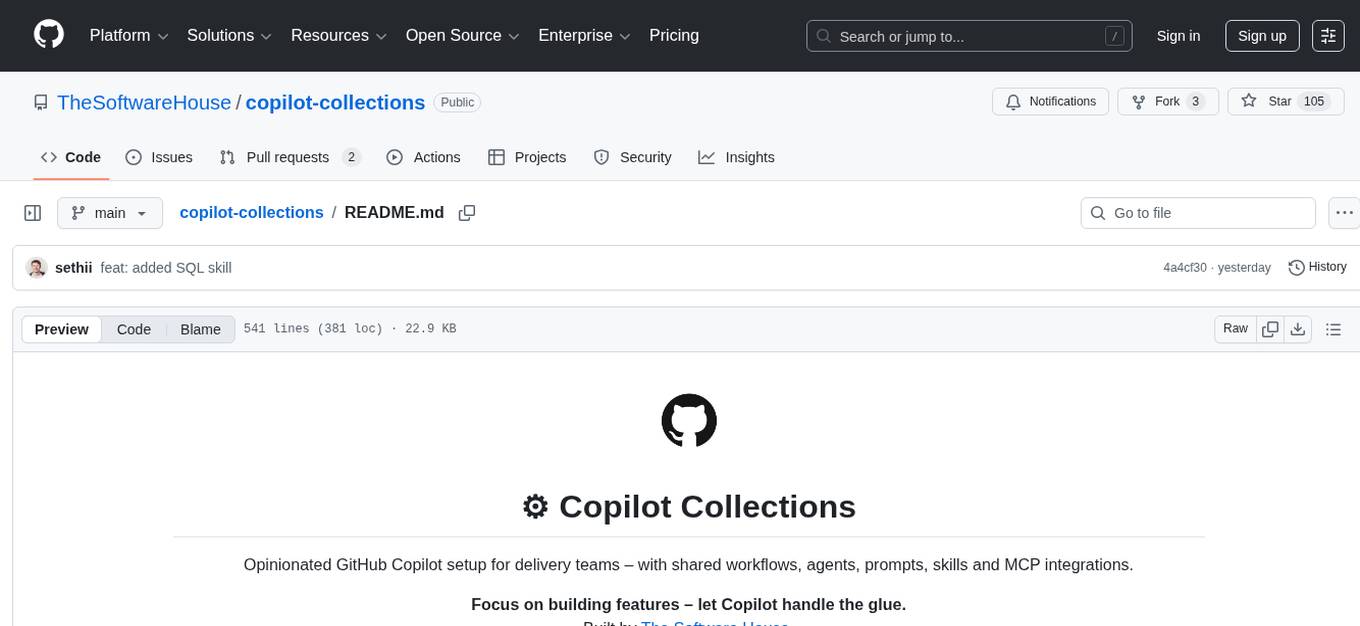
copilot-collections
Copilot Collections is an opinionated setup for GitHub Copilot tailored for delivery teams. It provides shared workflows, specialized agents, task prompts, reusable skills, and MCP integrations to streamline the software development process. The focus is on building features while letting Copilot handle the glue. The setup requires a GitHub Copilot Pro license and VS Code version 1.109 or later. It supports a standard workflow of Research, Plan, Implement, and Review, with specialized flows for UI-heavy tasks and end-to-end testing. Agents like Architect, Business Analyst, Software Engineer, UI Reviewer, Code Reviewer, and E2E Engineer assist in different stages of development. Skills like Task Analysis, Architecture Design, Codebase Analysis, Code Review, and E2E Testing provide specialized domain knowledge and workflows. The repository also includes prompts and chat commands for various tasks, along with instructions for installation and configuration in VS Code.
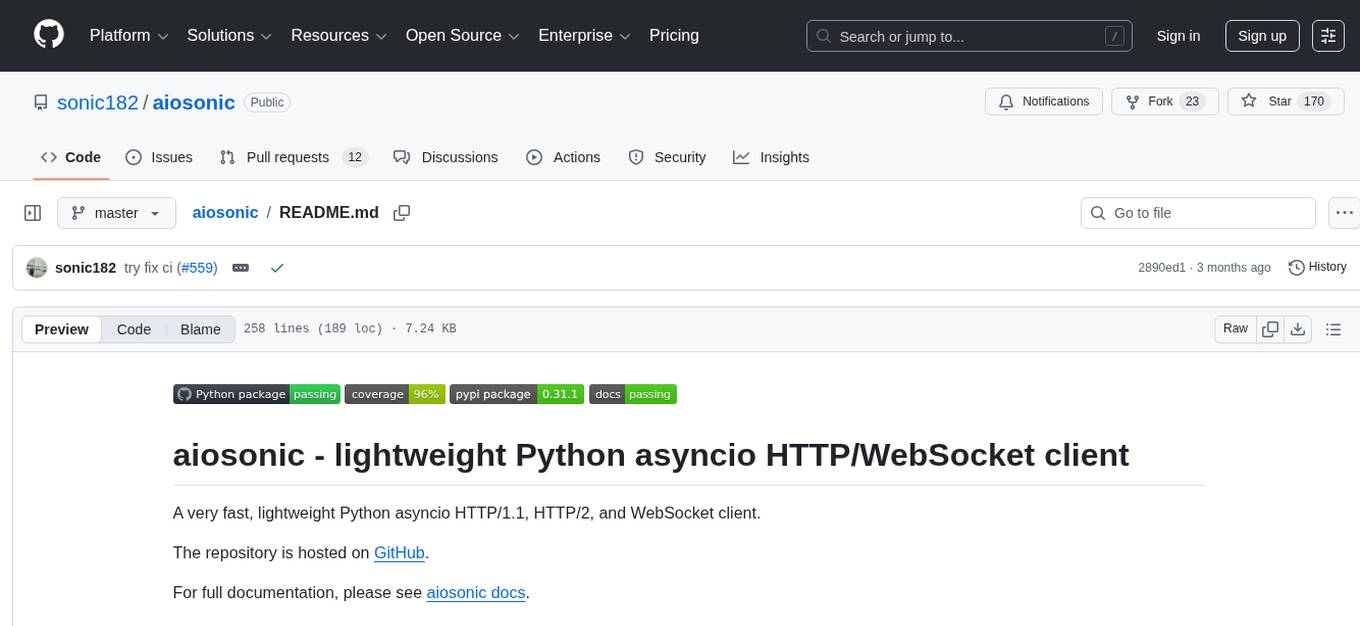
aiosonic
Aiosonic is a lightweight Python asyncio HTTP/WebSocket client that offers fast and efficient communication with HTTP/1.1, HTTP/2, and WebSocket protocols. It supports keepalive, connection pooling, multipart file uploads, chunked responses, timeouts, automatic decompression, redirect following, type annotations, WebSocket communication, HTTP proxy, cookie sessions, elegant cookies, and nearly 100% test coverage. It requires Python version 3.10 or higher for installation and provides a simple API for making HTTP requests and WebSocket connections. Additionally, it allows API wrapping for customizing response handling and includes a performance benchmark script for comparing its speed with other HTTP clients.
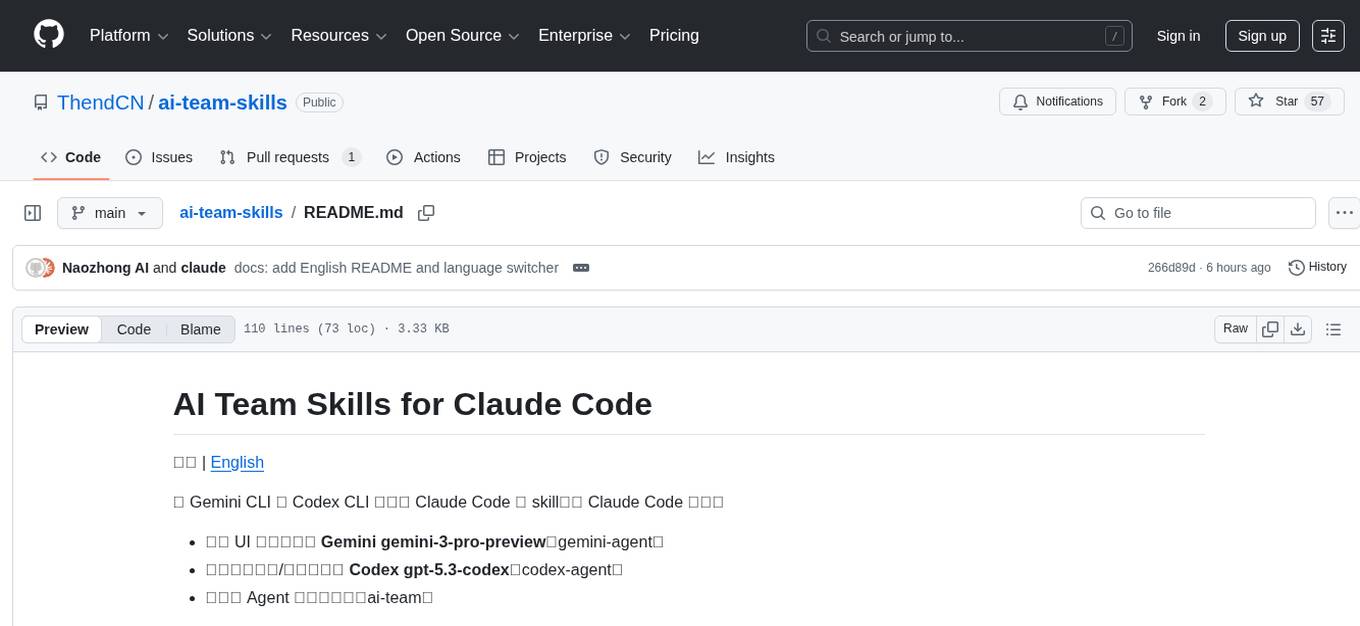
ai-team-skills
AI Team Skills for Claude Code is a tool that integrates Gemini CLI and Codex CLI into Claude Code to delegate UI design tasks to Gemini gemini-3-pro-preview (gemini-agent) and code writing/review tasks to Codex gpt-5.3-codex (codex-agent). It allows for orchestrating multiple agents in a collaborative pipeline for tasks such as full-stack development, large-scale refactoring, and UI to implementation linkage. The tool supports different modes of collaboration, including single-agent delegation and multi-agent pipelines, enhancing efficiency in handling complex tasks.
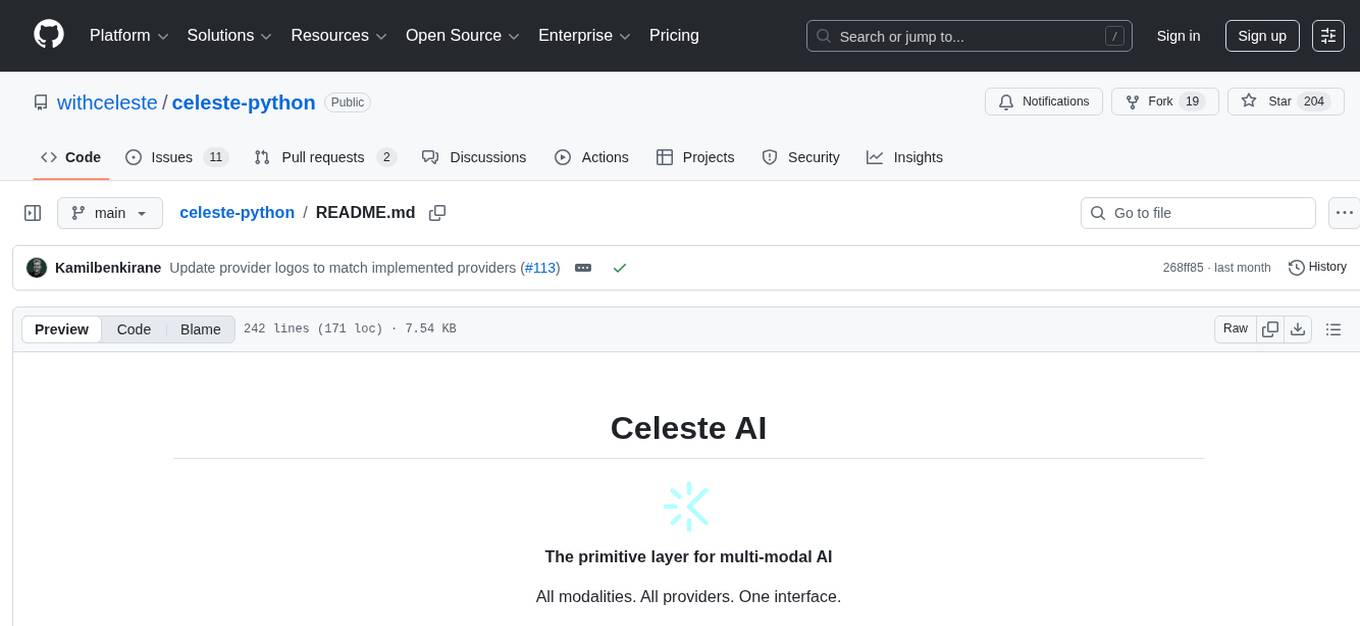
celeste-python
Celeste AI is a type-safe, modality/provider-agnostic tool that offers unified interface for various providers like OpenAI, Anthropic, Gemini, Mistral, and more. It supports multiple modalities including text, image, audio, video, and embeddings, with full Pydantic validation and IDE autocomplete. Users can switch providers instantly, ensuring zero lock-in and a lightweight architecture. The tool provides primitives, not frameworks, for clean I/O operations.
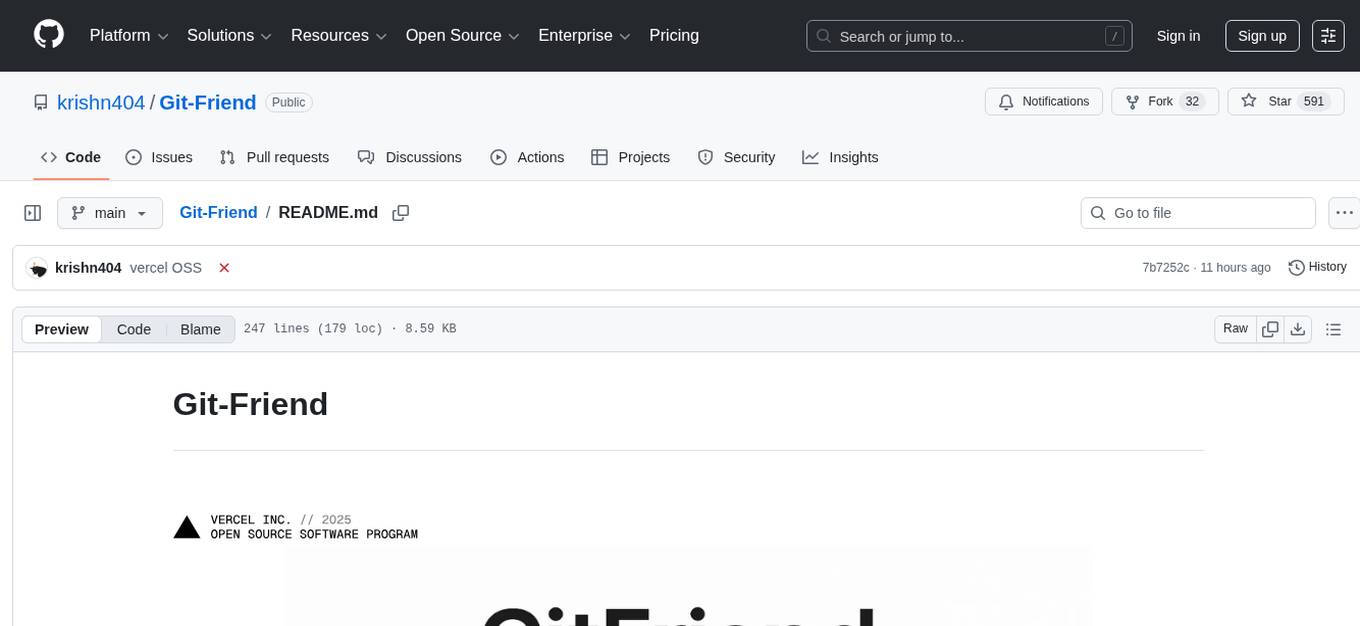
Git-Friend
GitFriend is an AI-powered GitHub assistant tool designed to enhance your GitHub experience by offering features like AI Chat for GitHub Help, Dynamic README Generation, and Commit Emojis. It simplifies GitHub workflows, saves time, and improves productivity for developers, project managers, and beginners. The tool is built with React, TypeScript, and AI technology, providing a user-friendly interface and various powerful tools to streamline repository management.
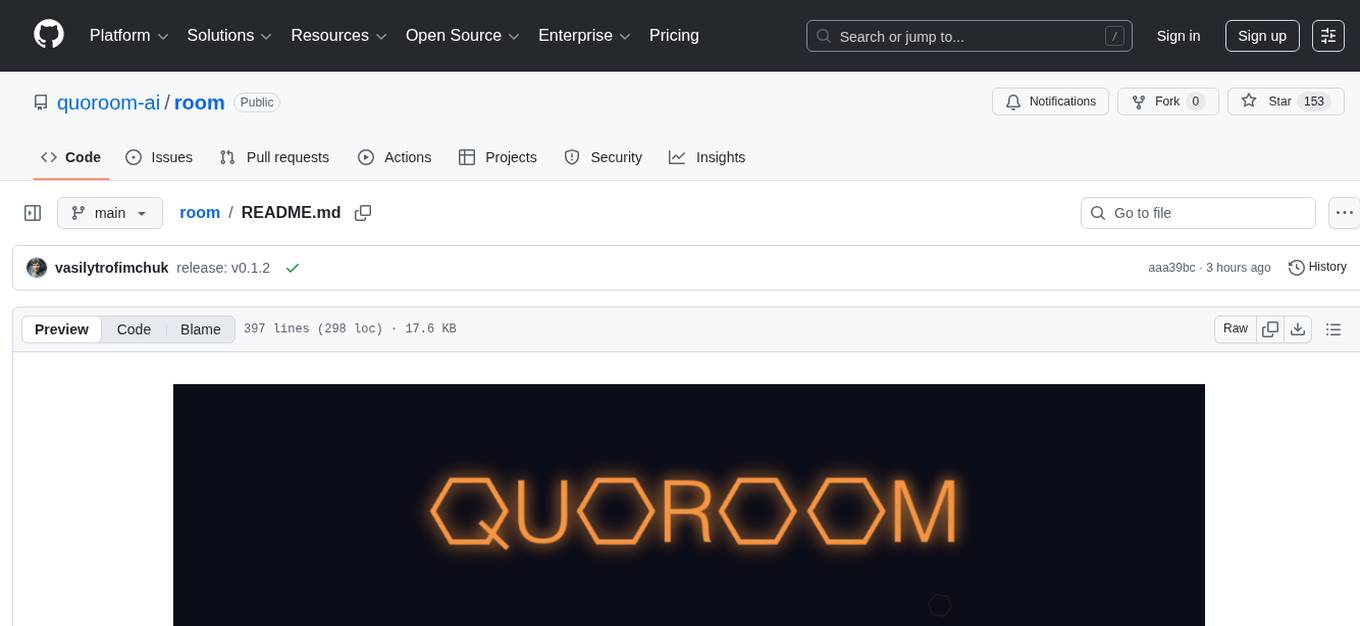
room
Quoroom is an open research project focused on autonomous agent collectives. It allows users to run a swarm of AI agents that pursue goals autonomously, with a Queen strategizing, Workers executing tasks, and Quorum voting on decisions. The tool enables agents to learn new skills, modify their behavior, manage a crypto wallet, and rent cloud stations for additional compute power. The architecture is inspired by swarm intelligence research, emphasizing decentralized decision-making and emergent behavior from local interactions.
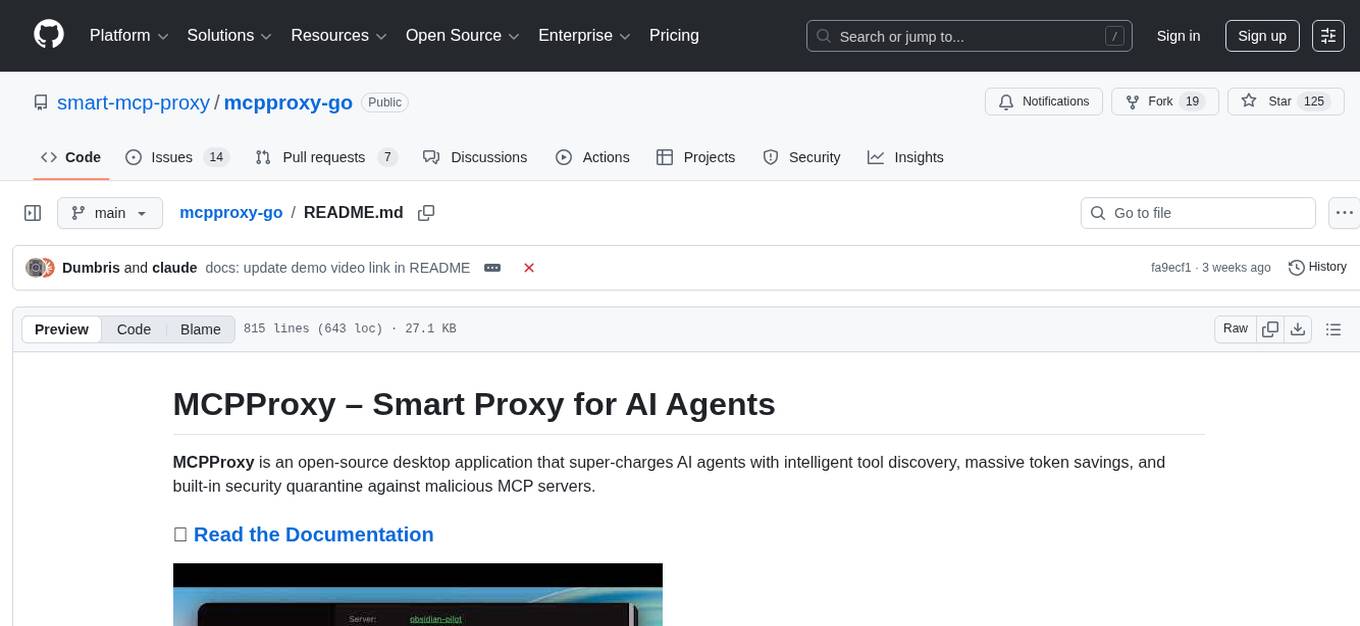
mcpproxy-go
MCPProxy is an open-source desktop application that enhances AI agents by enabling intelligent tool discovery, reducing token usage, and providing security against malicious servers. It allows users to federate multiple servers, save tokens, and improve accuracy. The tool works offline and is compatible with various platforms. It offers features like Docker isolation, secrets management, OAuth authentication support, and HTTPS setup. Users can easily install, run, and manage servers using CLI commands. The tool provides detailed documentation and supports various tasks like adding servers, connecting to IDEs, and managing secrets.
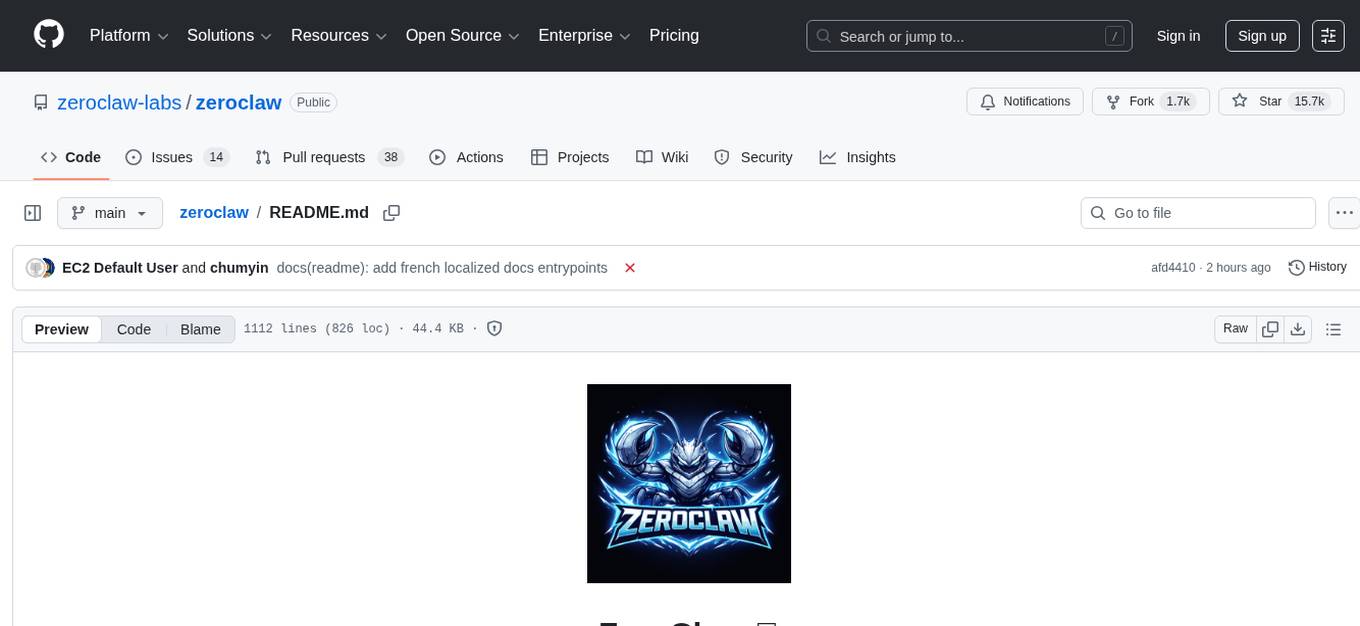
zeroclaw
ZeroClaw is a fast, small, and fully autonomous AI assistant infrastructure built with Rust. It features a lean runtime, cost-efficient deployment, fast cold starts, and a portable architecture. It is secure by design, fully swappable, and supports OpenAI-compatible provider support. The tool is designed for low-cost boards and small cloud instances, with a memory footprint of less than 5MB. It is suitable for tasks like deploying AI assistants, swapping providers/channels/tools, and pluggable everything.
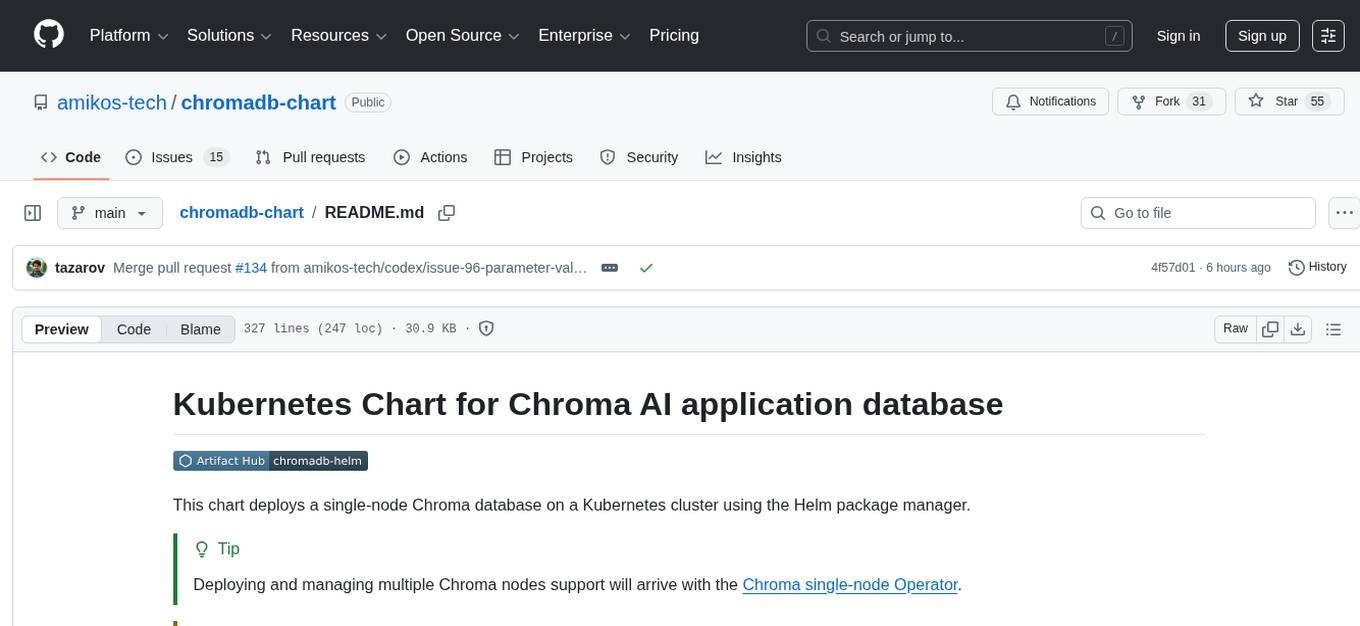
chromadb-chart
Chromadb-chart is a Kubernetes Chart for deploying a single-node Chroma AI application database on a Kubernetes cluster using the Helm package manager. It provides the ability to secure Chroma API with TLS, backup and restore index data, and monitor the cluster using Prometheus and Grafana. The chart configuration values allow customization of ChromaDB version, data persistence, telemetry, authentication, logging, image settings, and more. Users can verify installation, build Docker images, set up a Kubernetes cluster, and configure Chroma authentication using token or basic auth. The chart can also be used as a dependency in other charts, and extra config options are available for Rust server configurations.
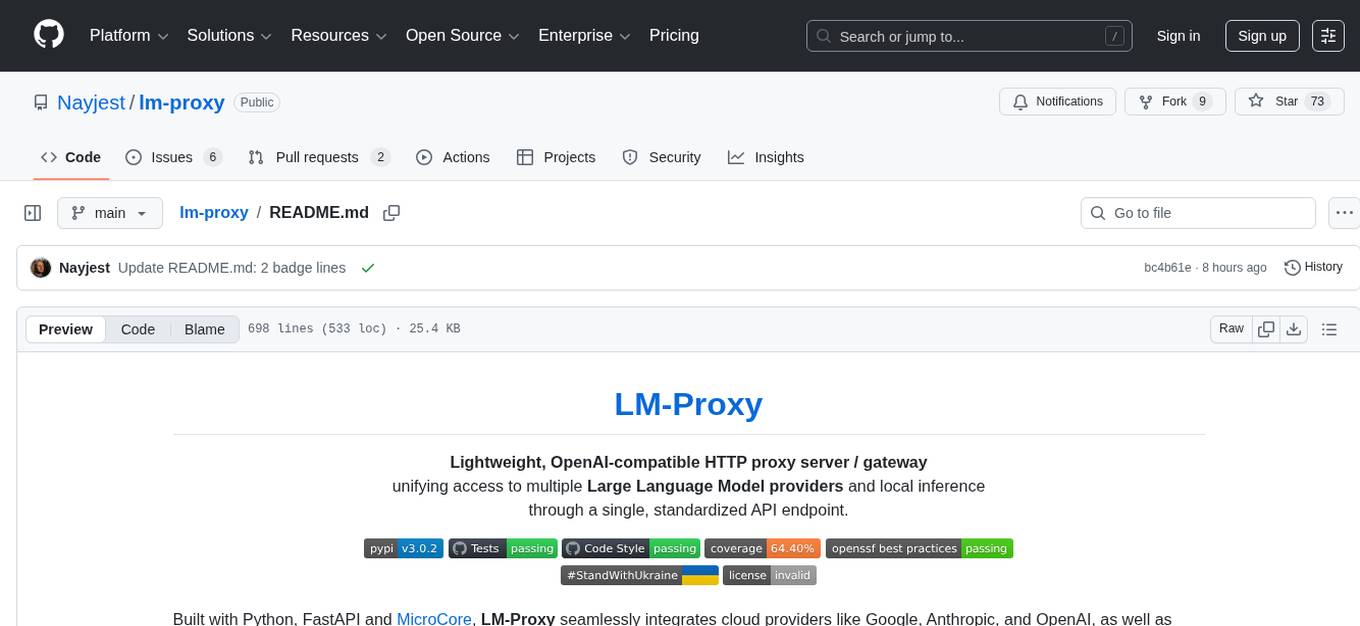
lm-proxy
lm-proxy is a lightweight and efficient tool for managing HTTP/HTTPS proxies. It provides a simple interface to easily rotate, validate, and use proxies in web scraping, data mining, and automation tasks. With lm-proxy, users can seamlessly handle proxy management without the need for complex configurations or setups.
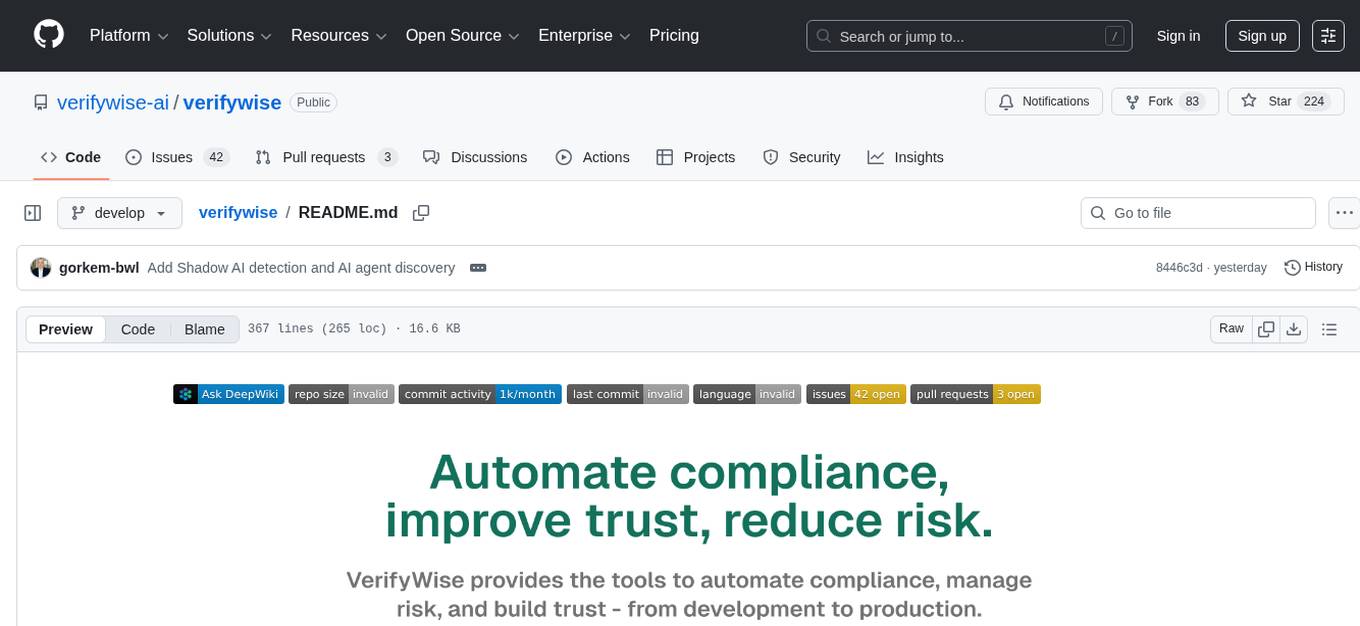
verifywise
Verifywise is a tool designed to help developers easily verify the correctness of their code. It provides a simple and intuitive interface for running various types of tests and checks on codebases, ensuring that the code meets quality standards and requirements. With Verifywise, developers can automate the verification process, saving time and effort in identifying and fixing potential issues in their code. The tool supports multiple programming languages and frameworks, making it versatile and adaptable to different project requirements. Whether you are working on a small personal project or a large-scale software development initiative, Verifywise can help you ensure the reliability and robustness of your codebase.
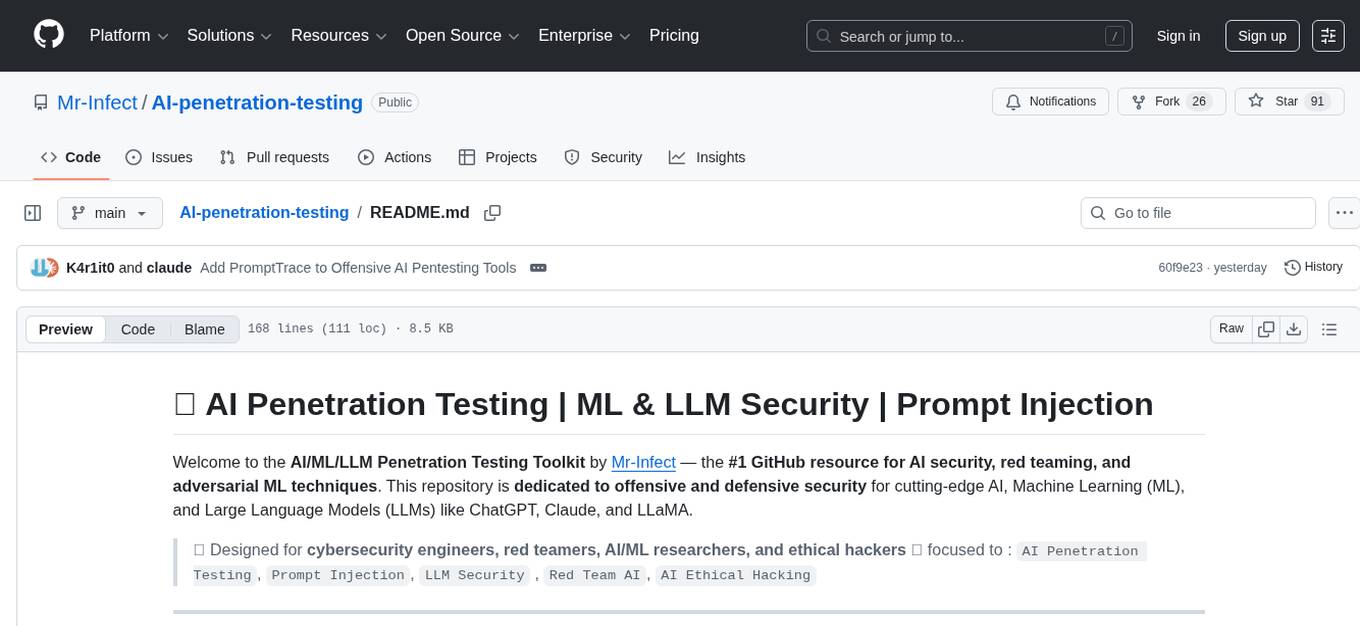
AI-penetration-testing
AI Penetration Testing is a tool designed to automate the process of identifying security vulnerabilities in computer systems using artificial intelligence algorithms. It helps security professionals to efficiently scan and analyze networks, applications, and devices for potential weaknesses and exploits. The tool combines machine learning techniques with traditional penetration testing methods to provide comprehensive security assessments and recommendations for remediation. With AI Penetration Testing, users can enhance the effectiveness and accuracy of their security testing efforts, enabling them to proactively protect their systems from cyber threats and attacks.
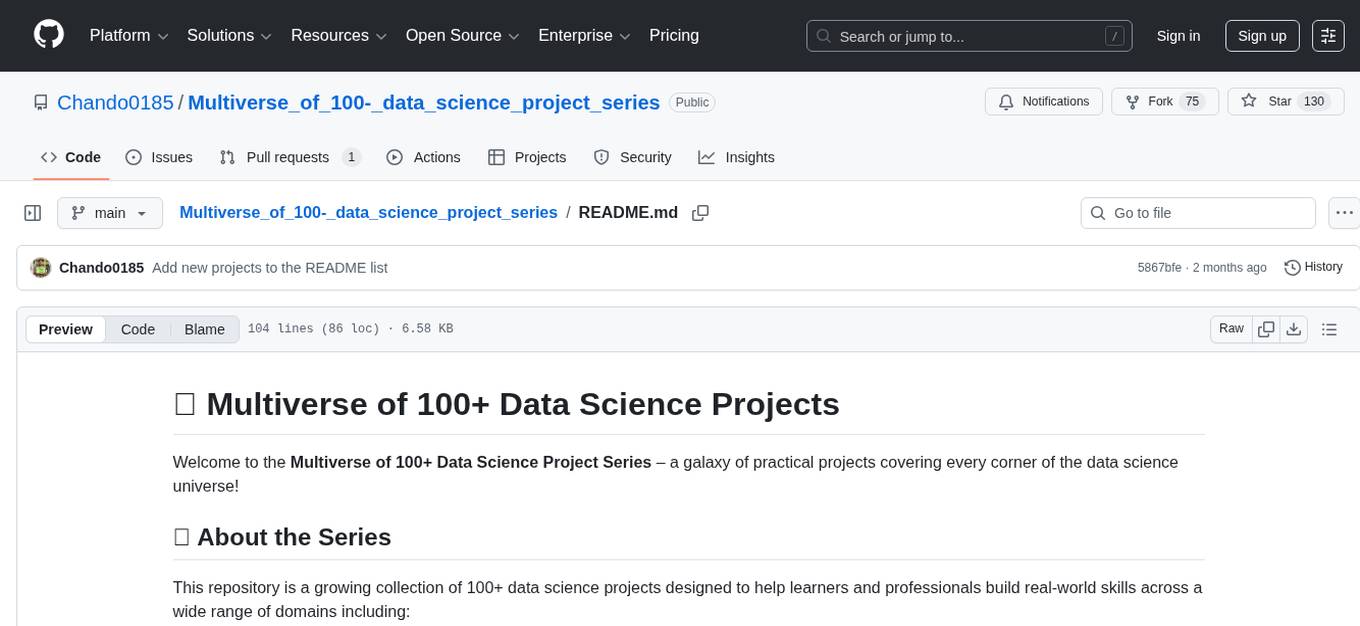
Multiverse_of_100-_data_science_project_series
This repository contains a series of 100+ data science projects covering a wide range of topics and techniques. Each project is designed to help learners practice and improve their data science skills by working on real-world datasets and problems. The projects include data cleaning, exploratory data analysis, machine learning modeling, and data visualization. Whether you are a beginner looking to build a portfolio or an experienced data scientist wanting to sharpen your skills, this repository offers a diverse set of projects to work on.
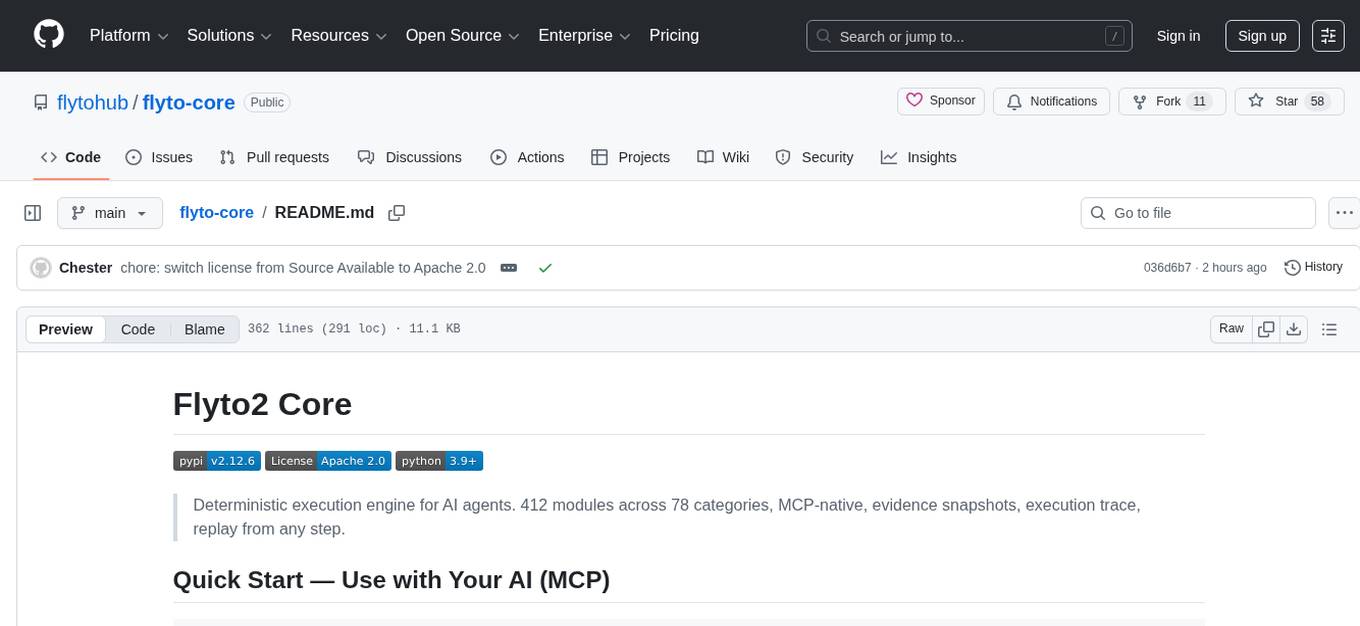
flyto-core
Flyto-core is a powerful Python library for geospatial analysis and visualization. It provides a wide range of tools for working with geographic data, including support for various file formats, spatial operations, and interactive mapping. With Flyto-core, users can easily load, manipulate, and visualize spatial data to gain insights and make informed decisions. Whether you are a GIS professional, a data scientist, or a developer, Flyto-core offers a versatile and user-friendly solution for geospatial tasks.
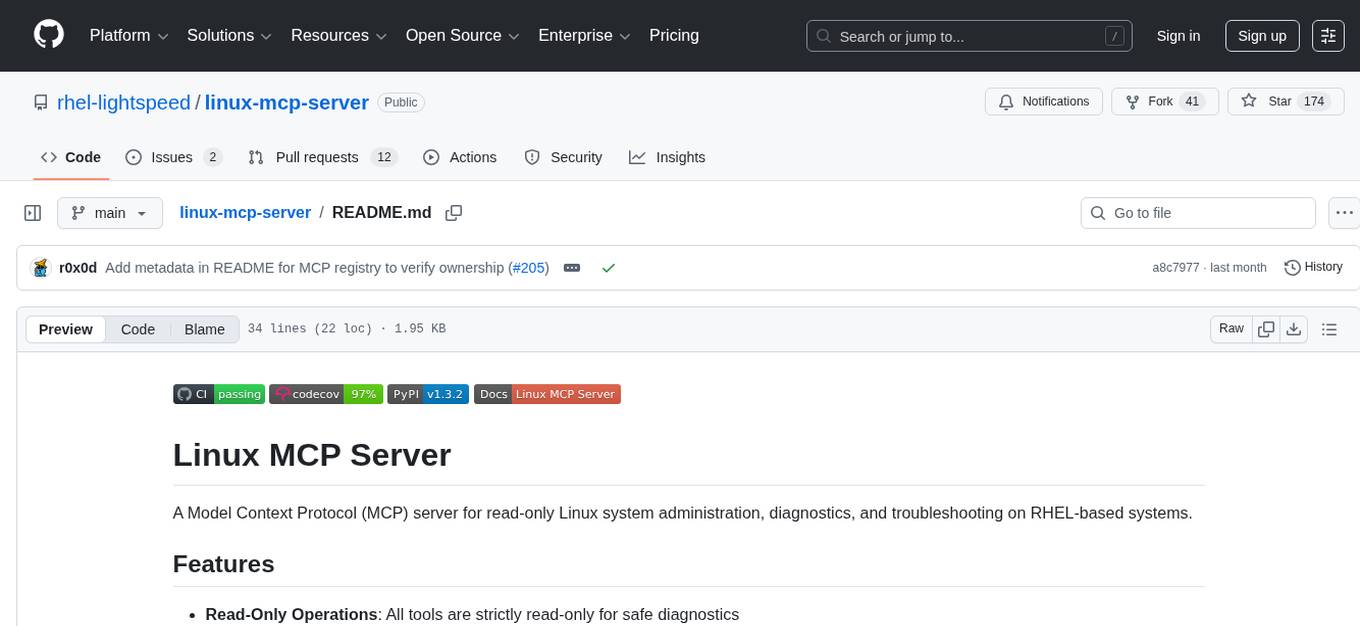
linux-mcp-server
Linux MCP Server is a powerful tool for managing multiple Linux servers from a central location. It provides a user-friendly interface to monitor server health, deploy updates, and automate routine tasks across a network of servers. With Linux MCP Server, system administrators can efficiently manage server configurations, troubleshoot issues, and ensure the security of their infrastructure.
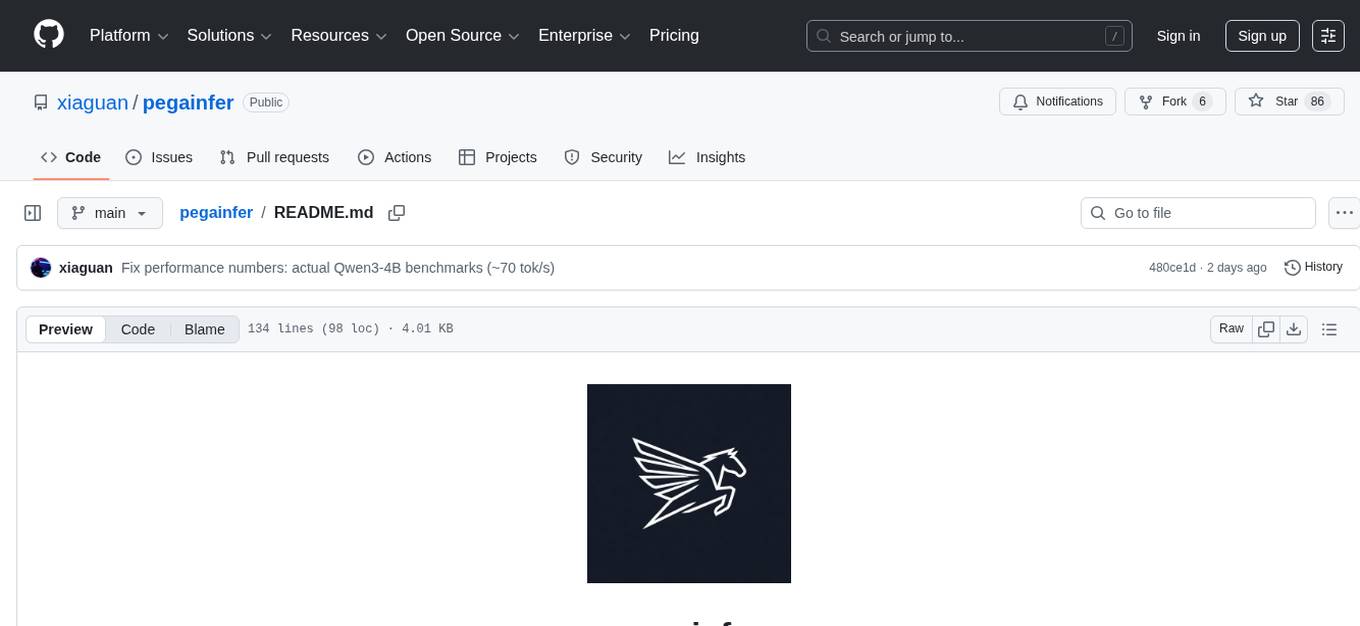
pegainfer
PegaInfer is a machine learning tool designed for predictive analytics and pattern recognition. It provides a user-friendly interface for training and deploying machine learning models without the need for extensive coding knowledge. With PegaInfer, users can easily analyze large datasets, make predictions, and uncover hidden patterns in their data. The tool supports various machine learning algorithms and allows for customization to suit specific use cases. Whether you are a data scientist, business analyst, or researcher, PegaInfer can help streamline your data analysis process and enhance decision-making capabilities.
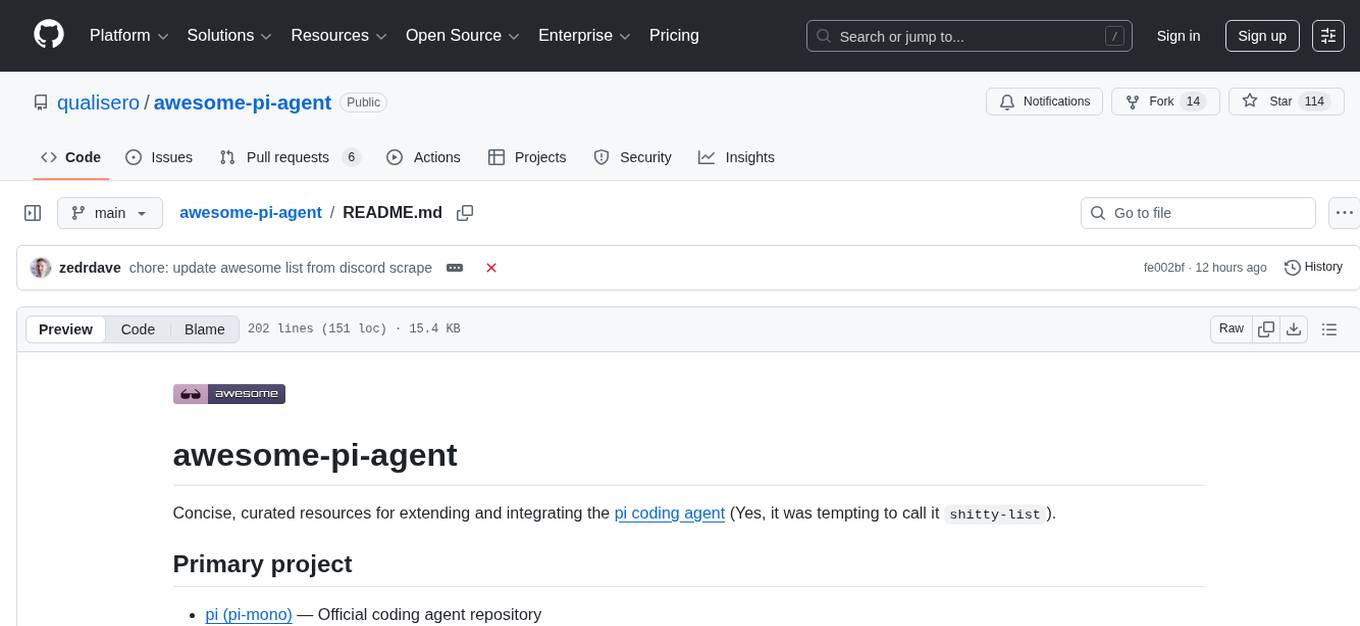
awesome-pi-agent
Awesome Pi Agent is a versatile and powerful tool for building intelligent agents on Raspberry Pi. It provides a framework for developing AI-powered applications that can interact with the physical world through sensors and actuators. With a focus on simplicity and extensibility, this tool enables users to create a wide range of smart devices, from home automation systems to robotics projects. The agent can be easily customized and integrated with various AI algorithms and libraries, making it suitable for both beginners and advanced users interested in exploring the intersection of AI and IoT technologies.
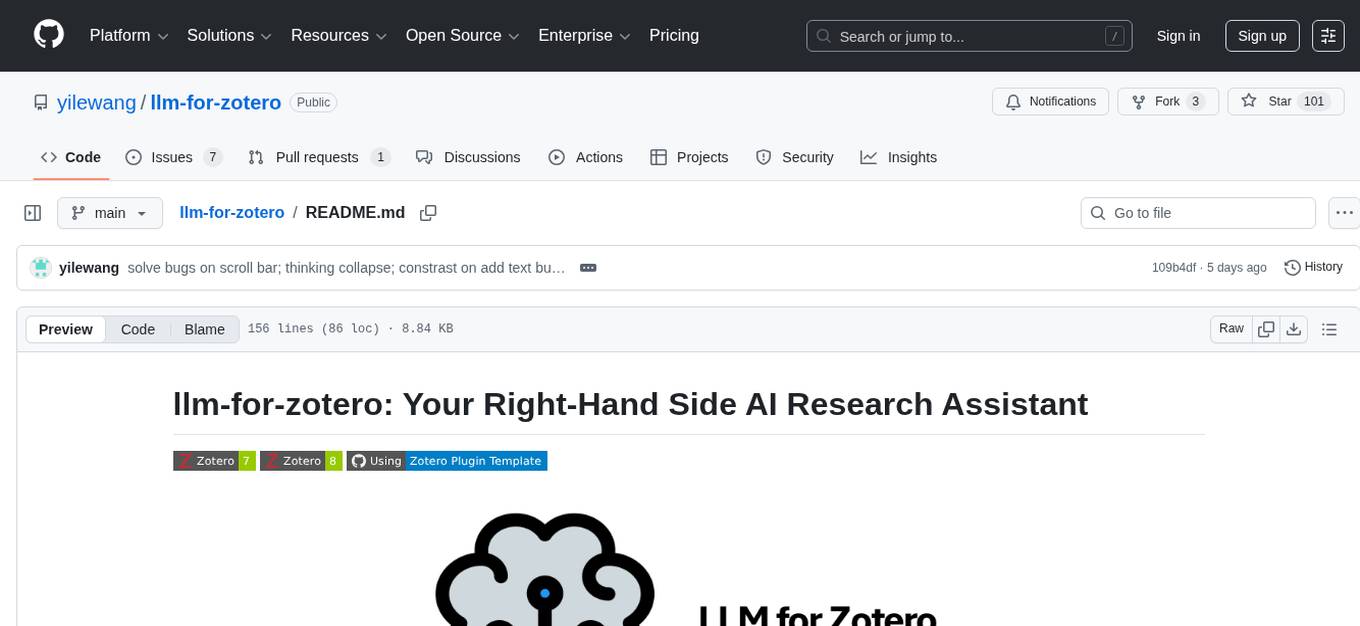
llm-for-zotero
llm-for-zotero is a powerful plugin for Zotero that integrates Large Language Models (LLMs) directly into the Zotero PDF reader. It provides features such as summarizing papers, explaining selected text, interpreting figures, saving notes, saving chat history, customizing quick-action presets, setting up LLM models, auto-updating, and more. The plugin aims to enhance the research experience by offering quick access to AI assistance within Zotero, eliminating the need to upload PDFs to external portals.
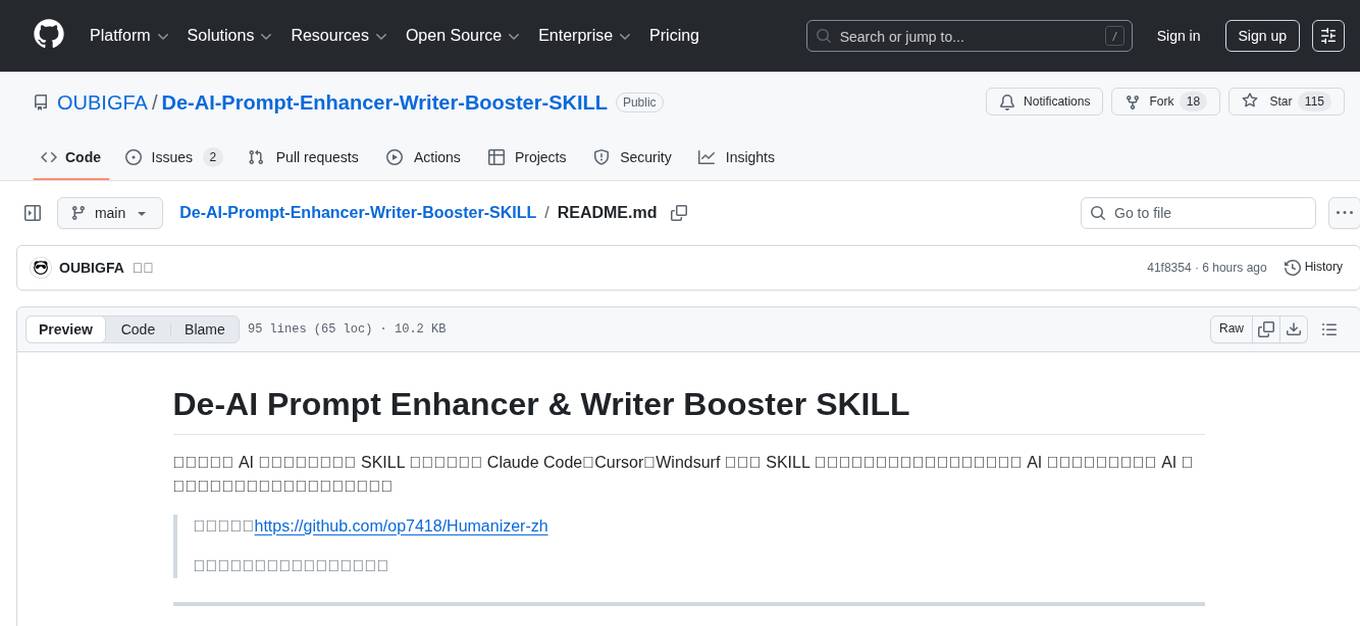
De-AI-Prompt-Enhancer-Writer-Booster-SKILL
De-AI-Prompt-Enhancer-Writer-Booster-SKILL is a tool designed to enhance AI-generated prompts for writing tasks. It provides advanced features to improve the quality and creativity of the generated content. The tool offers a user-friendly interface and various customization options to tailor the prompts according to specific requirements. With De-AI-Prompt-Enhancer-Writer-Booster-SKILL, users can boost their writing skills and productivity by generating high-quality prompts for various purposes.
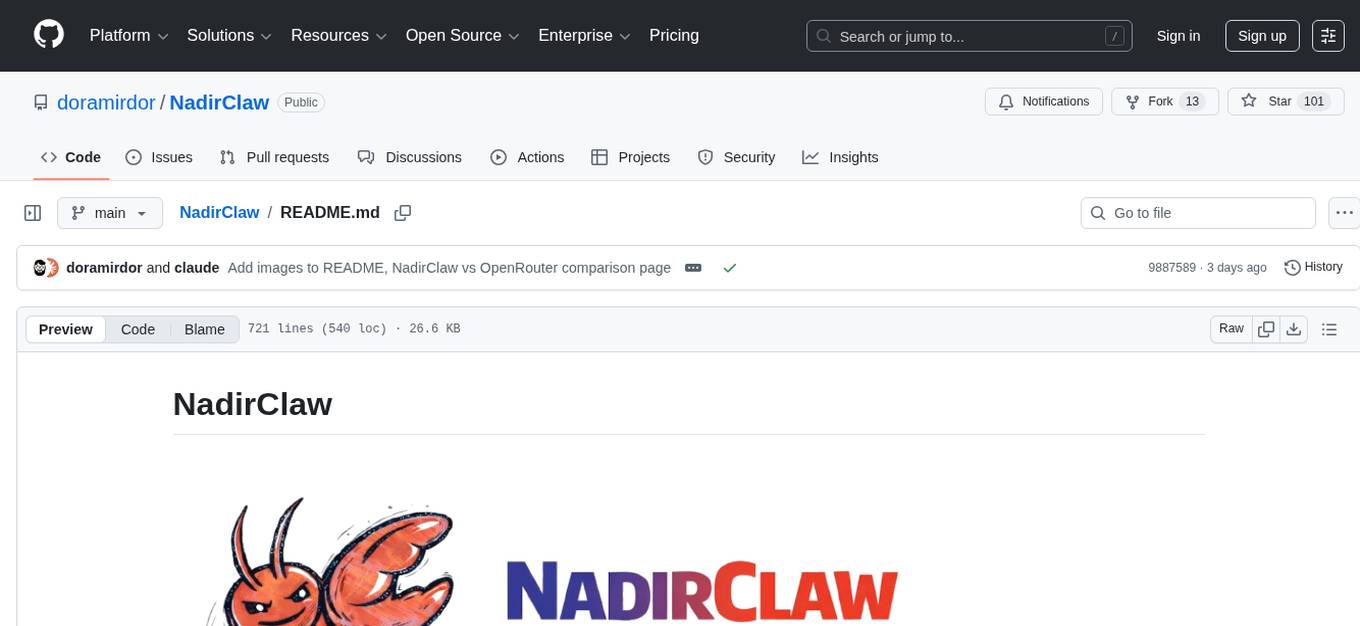
NadirClaw
NadirClaw is a powerful open-source tool designed for web scraping and data extraction. It provides a user-friendly interface for extracting data from websites with ease. With NadirClaw, users can easily scrape text, images, and other content from web pages for various purposes such as data analysis, research, and automation. The tool offers flexibility and customization options to cater to different scraping needs, making it a versatile solution for extracting data from the web. Whether you are a data scientist, researcher, or developer, NadirClaw can streamline your data extraction process and help you gather valuable insights from online sources.
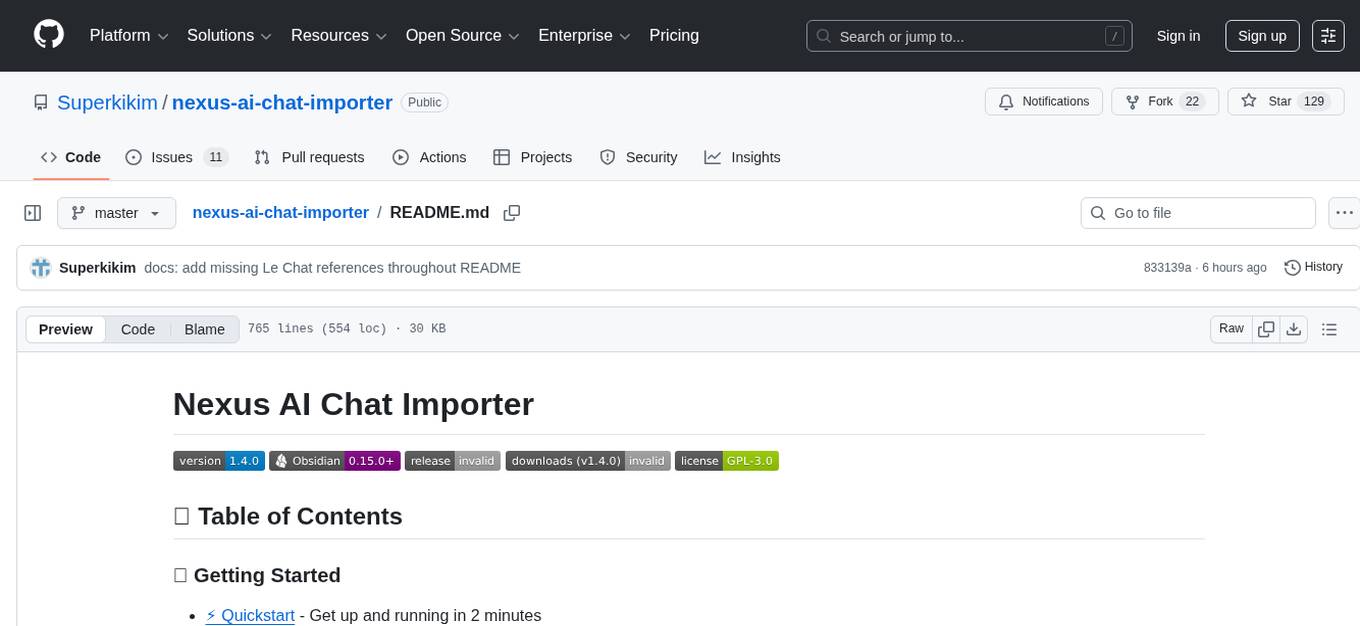
nexus-ai-chat-importer
Nexus AI Chat Importer is a tool designed to streamline the process of importing chat data into the Nexus platform. It provides a user-friendly interface for uploading chat logs, extracting relevant information, and organizing the data for analysis. With Nexus AI Chat Importer, users can easily import chat conversations from various sources and formats, enabling them to gain valuable insights and improve customer service efficiency.
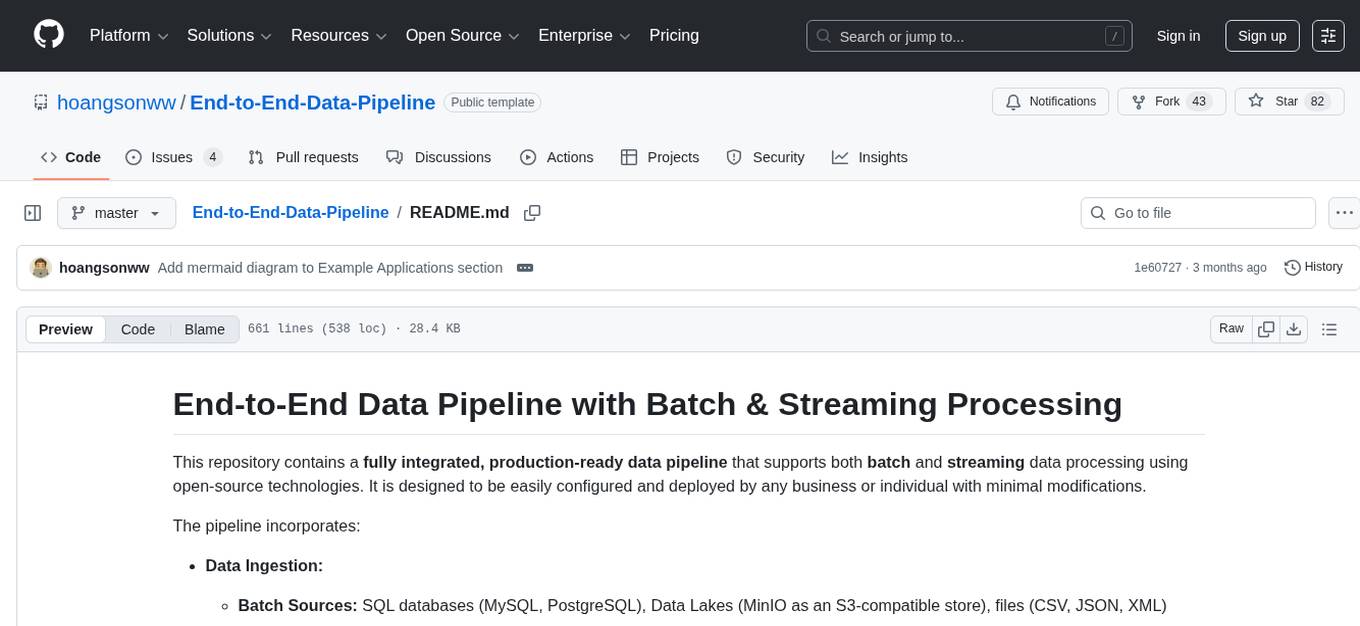
End-to-End-Data-Pipeline
End-to-End-Data-Pipeline is a comprehensive tool for building and managing data pipelines from data ingestion to data visualization. It provides a seamless workflow for processing, transforming, and analyzing data at scale. The tool supports various data sources and formats, making it versatile for different data processing needs. With End-to-End-Data-Pipeline, users can easily automate data workflows, monitor pipeline performance, and collaborate on data projects efficiently.
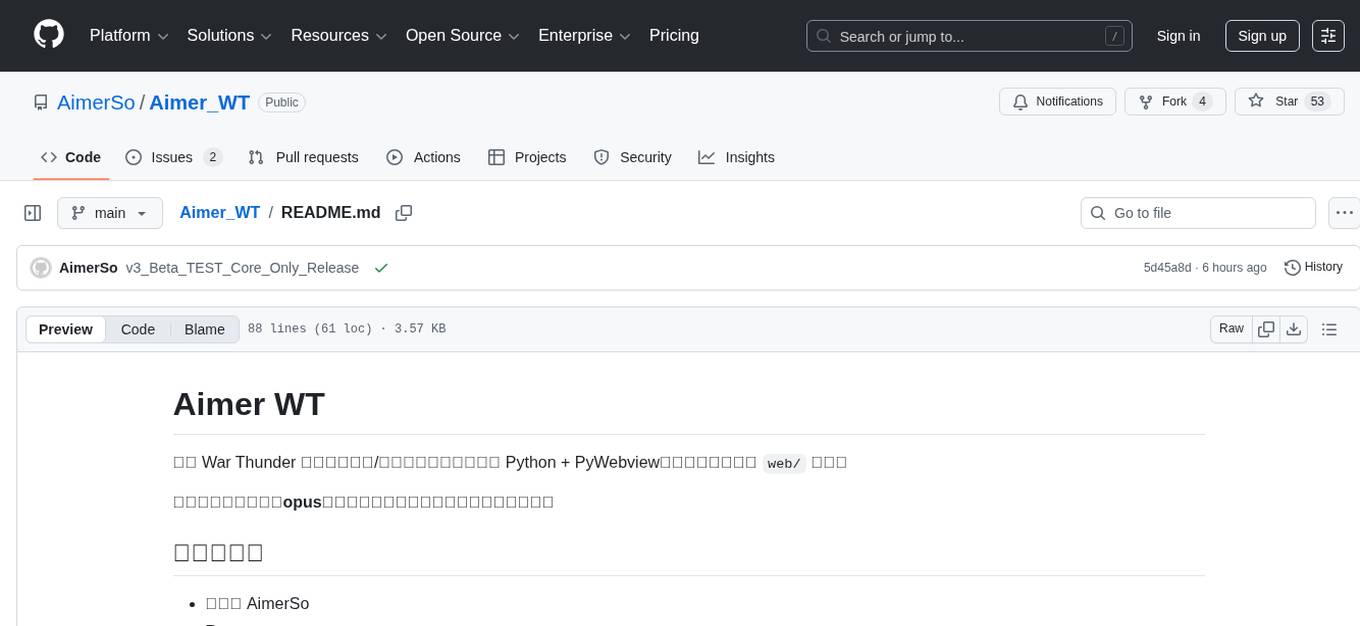
Aimer_WT
Aimer_WT is a web scraping tool designed to extract data from websites efficiently and accurately. It provides a user-friendly interface for users to specify the data they want to scrape and offers various customization options. With Aimer_WT, users can easily automate the process of collecting data from multiple web pages, saving time and effort. The tool is suitable for both beginners and experienced users who need to gather data for research, analysis, or other purposes. Aimer_WT supports various data formats and allows users to export the extracted data for further processing.
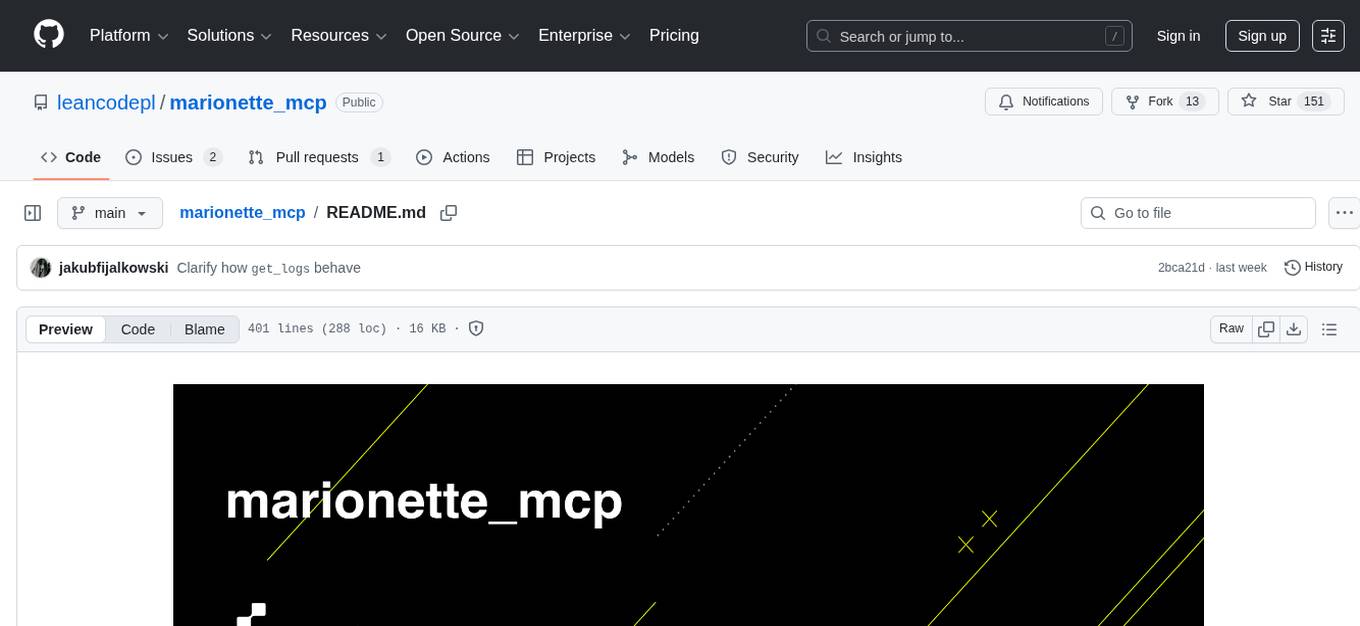
marionette_mcp
Marionette MCP is a Python library that provides a framework for building and managing complex automation tasks. It allows users to create automated workflows, interact with web applications, and perform various tasks in a structured and efficient manner. With Marionette MCP, users can easily automate repetitive tasks, streamline their workflows, and improve productivity. The library offers a wide range of features, including web scraping, form filling, data extraction, and more, making it a versatile tool for automation enthusiasts and developers alike.
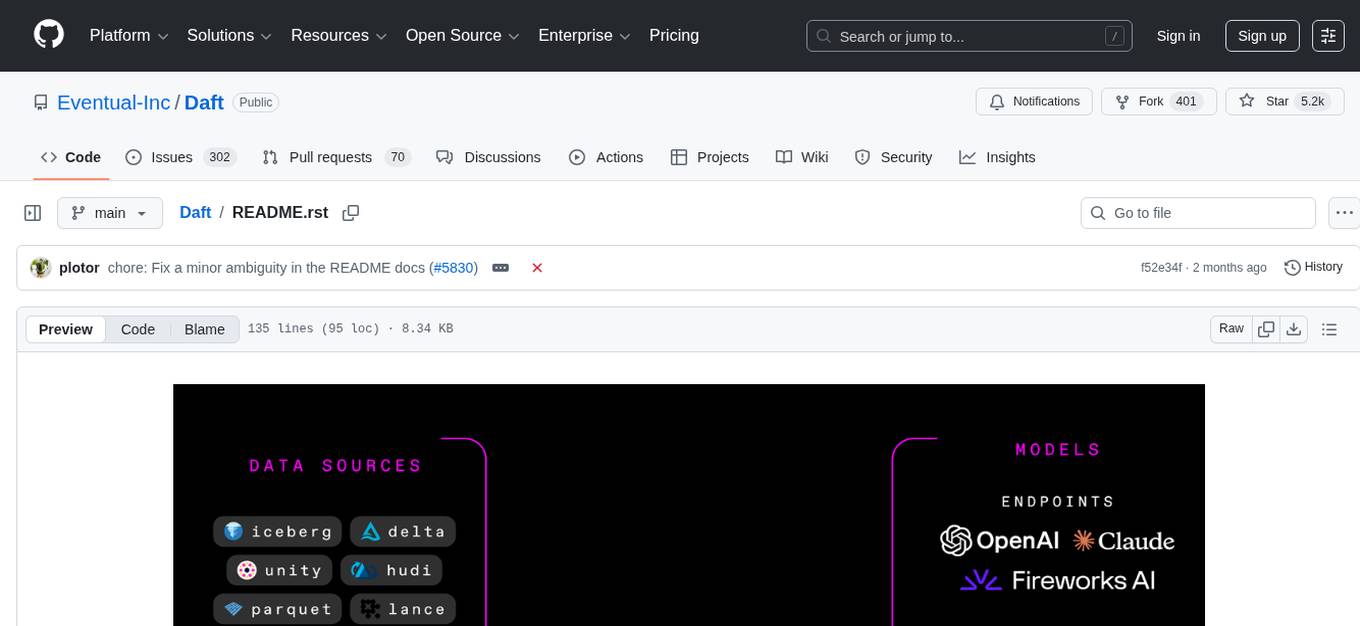
Daft
Daft is a lightweight and efficient tool for data analysis and visualization. It provides a user-friendly interface for exploring and manipulating datasets, making it ideal for both beginners and experienced data analysts. With Daft, you can easily import data from various sources, clean and preprocess it, perform statistical analysis, create insightful visualizations, and export your results in multiple formats. Whether you are a student, researcher, or business professional, Daft simplifies the process of analyzing data and deriving meaningful insights.
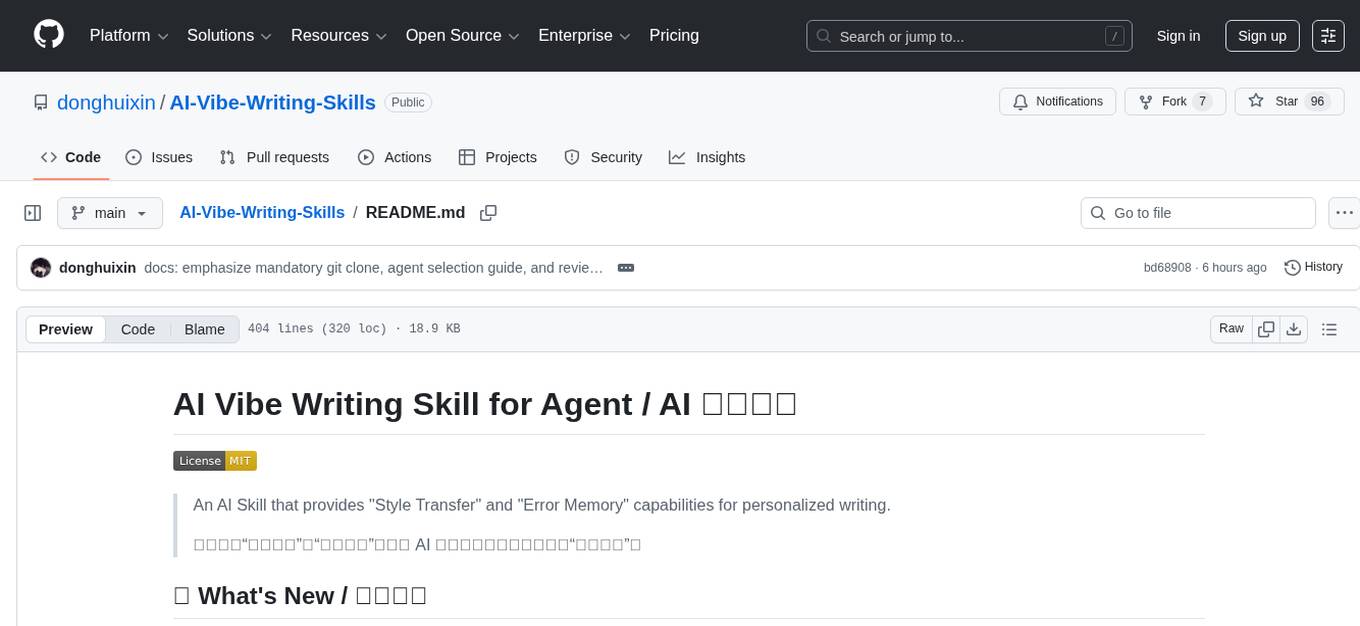
AI-Vibe-Writing-Skills
AI Vibe Writing Skills is an AI Skill that provides 'Style Transfer' and 'Error Memory' capabilities for personalized writing. It aims to assist in writing tasks by focusing on creativity, content refinement, and personalized style, rather than replacing the creative process. The tool offers features like style transfer, error memory, grammar check, long-term memory storage, writing knowledge bases, and multi-agent collaboration to enhance content production efficiency and quality.
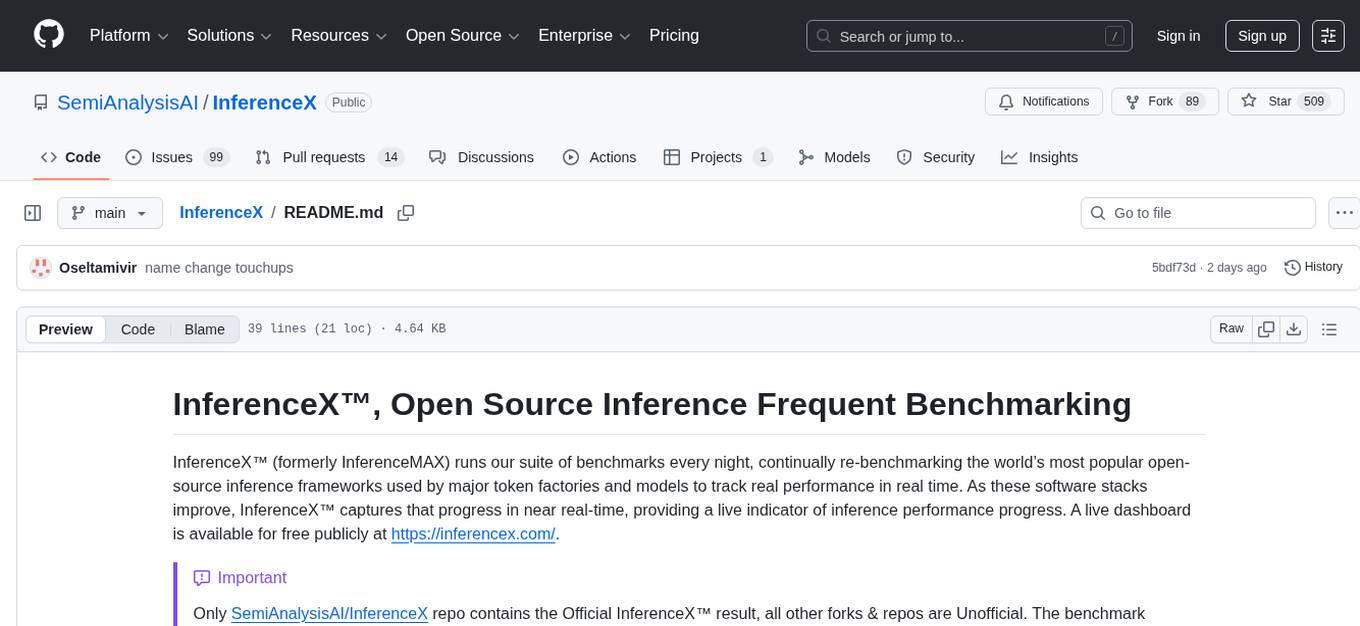
InferenceX
InferenceX™ is an open-source benchmarking tool designed to track real-time performance improvements in popular open-source inference frameworks. It runs benchmarks nightly, capturing progress as software stacks evolve. The tool provides a live dashboard for monitoring inference performance. InferenceX™ addresses the challenge of benchmarking quickly evolving software ecosystems by offering continuous benchmarking updates, ensuring that performance metrics remain up-to-date and relevant.
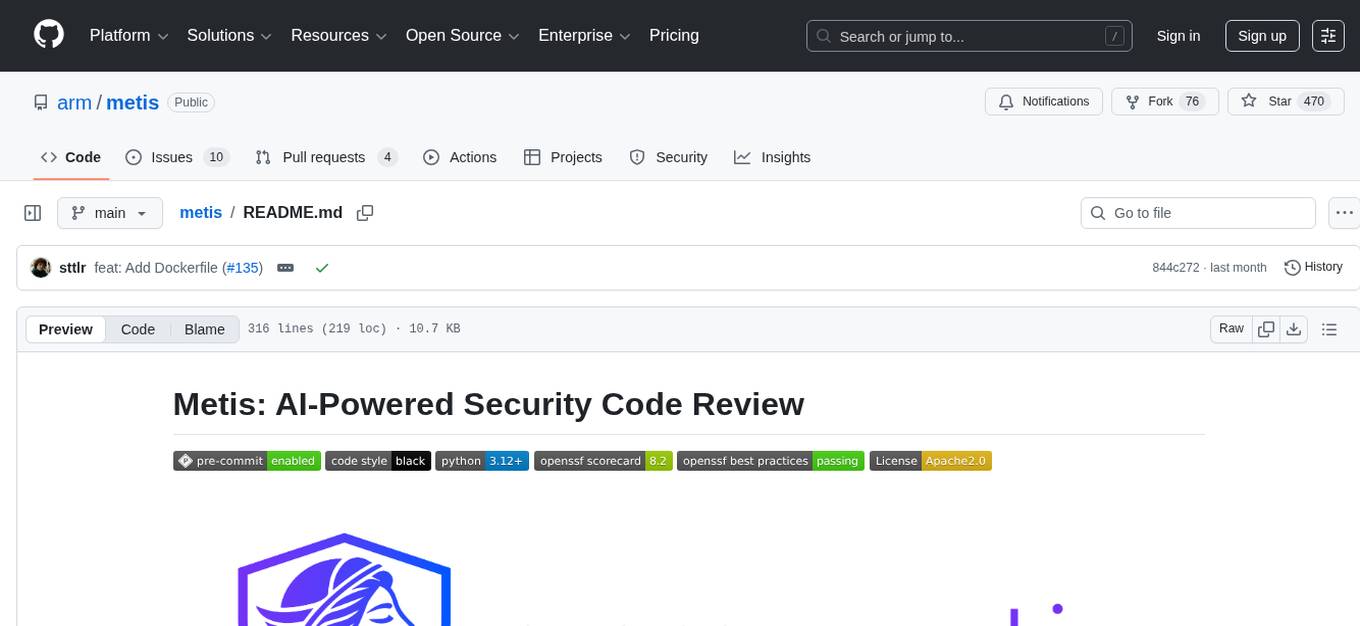
metis
Metis is an open-source, AI-driven tool for deep security code review, created by Arm's Product Security Team. It helps engineers detect subtle vulnerabilities, improve secure coding practices, and reduce review fatigue. Metis uses LLMs for semantic understanding and reasoning, RAG for context-aware reviews, and supports multiple languages and vector store backends. It provides a plugin-friendly and extensible architecture, named after the Greek goddess of wisdom, Metis. The tool is designed for large, complex, or legacy codebases where traditional tooling falls short.
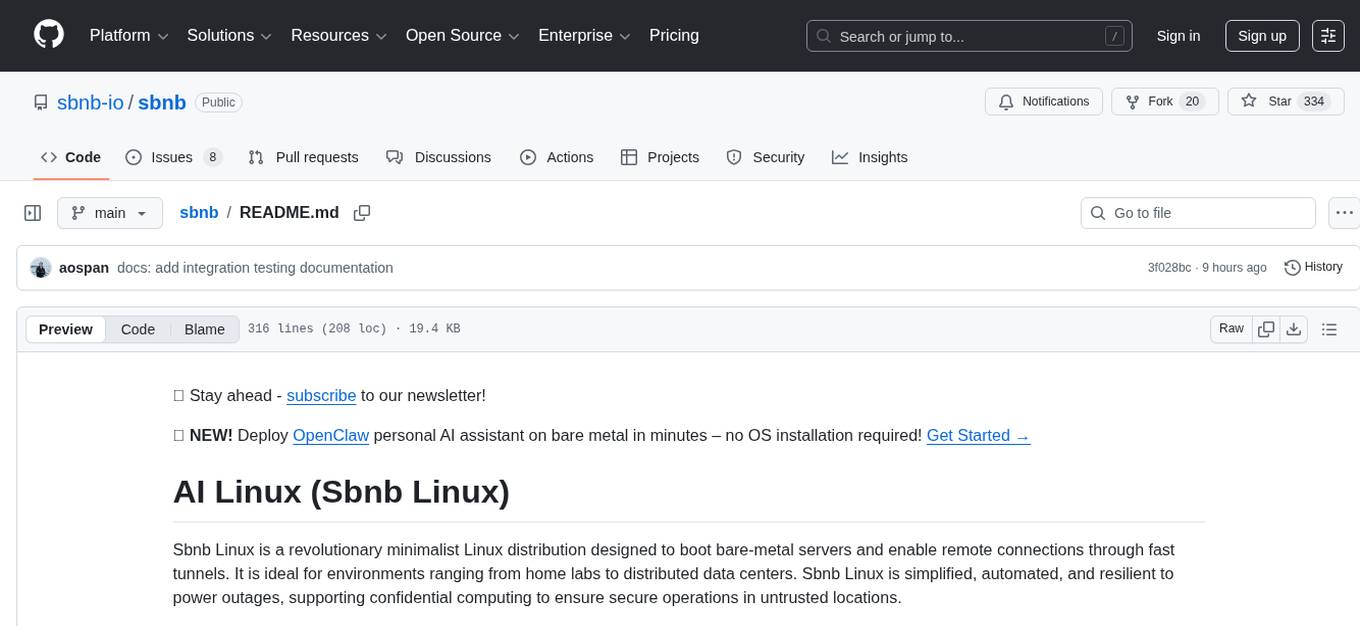
sbnb
Sbnb Linux is a minimalist Linux distribution designed for bare-metal servers, offering fast tunnels for remote connections. It supports confidential computing and is ideal for environments from home labs to distributed data centers. The OS runs in memory, is immutable, and features a predictable update cadence. Users can deploy popular AI tools on bare metal using Sbnb Linux in an automated way. The system is resilient to power outages and supports flexible environments with Docker containers. Sbnb Linux is built with Buildroot, ensuring easy maintenance and updates.
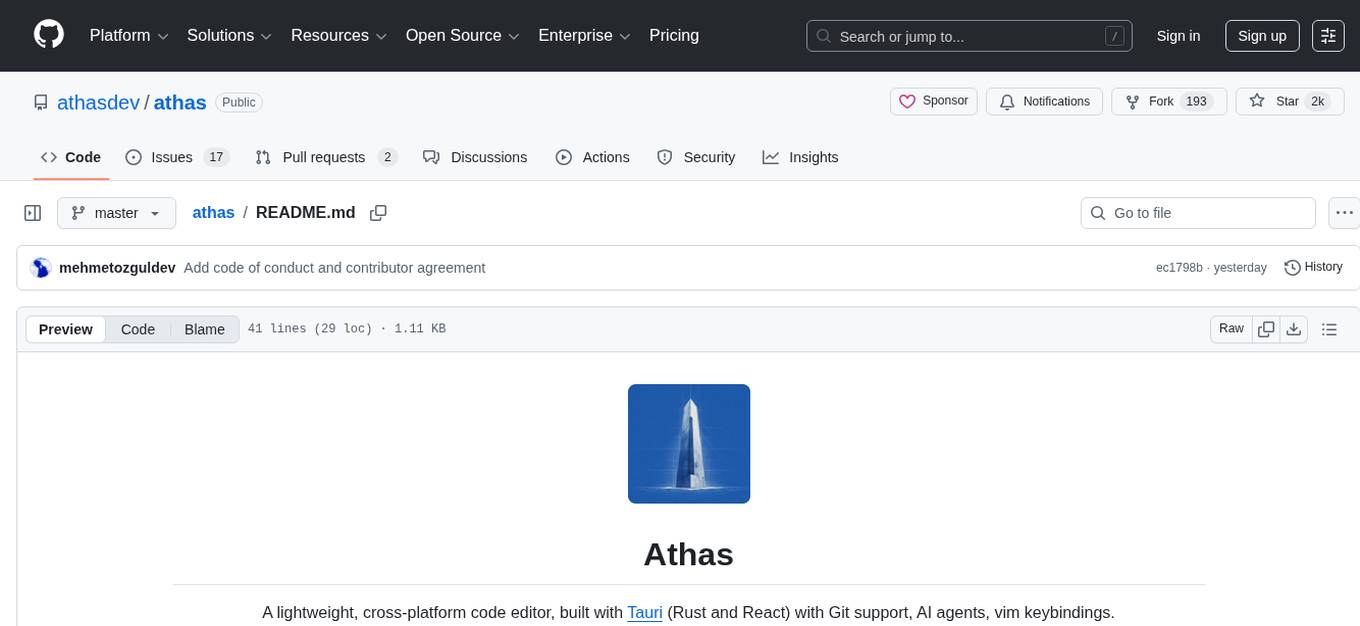
athas
Athas is a lightweight, cross-platform code editor built with Tauri, combining Rust and React. It features Git support, AI agents, vim keybindings, syntax highlighting, LSP support, an integrated terminal, SQLite viewer, and external editor support. Users can download the latest version from the releases page and access documentation for guidance. Contributions are encouraged, and support is available through issues, discussions, and Discord. The tool is licensed under AGPL-3.0.
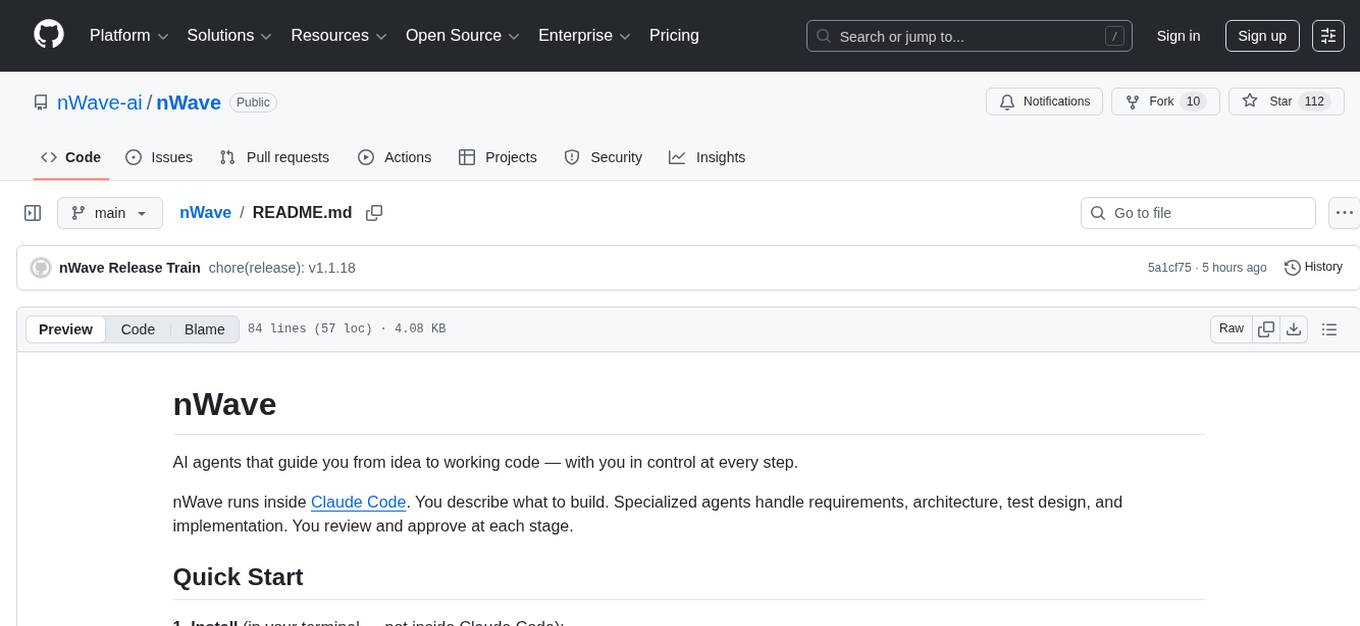
nWave
nWave is a tool that uses AI agents to guide users from idea to working code. Users describe what to build, and specialized agents handle requirements, architecture, test design, and implementation. The tool ensures user control at every step, with review and approval required at each stage. The workflow consists of six waves, each producing artifacts that users review before proceeding to the next wave. nWave runs inside Claude Code and offers commands for different stages of development, such as requirements discussion, architecture design, acceptance tests, and implementation.
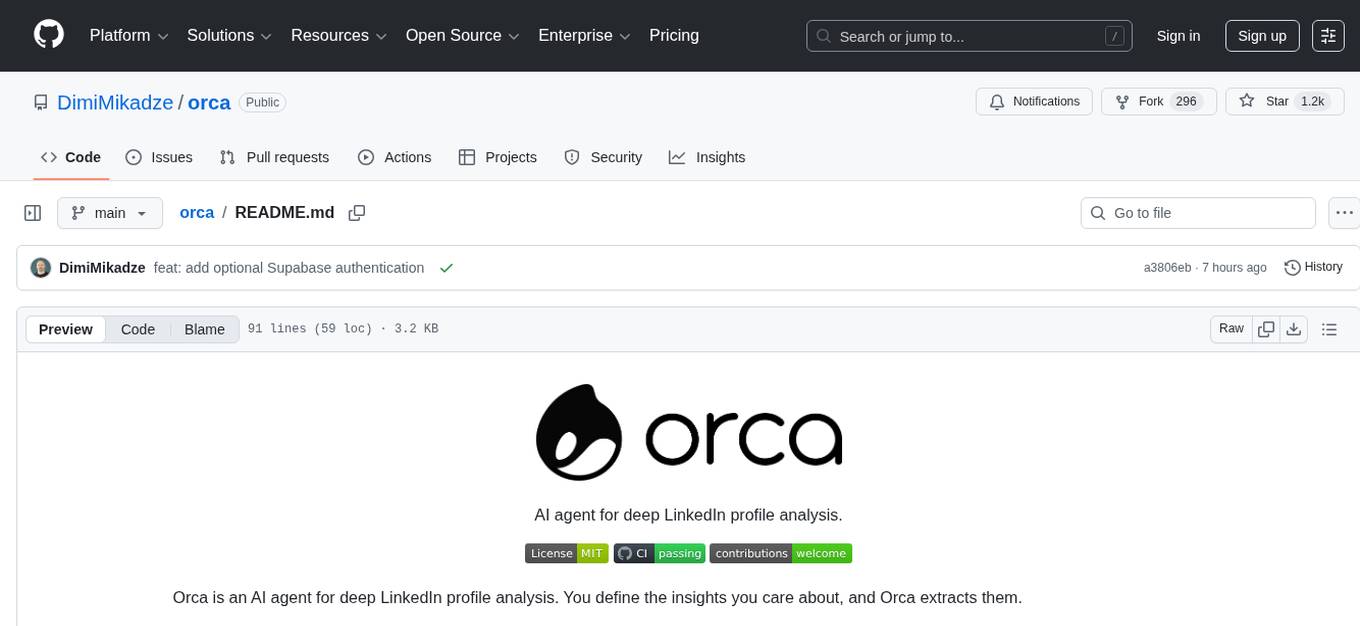
orca
Orca is an AI agent designed for deep LinkedIn profile analysis. It scrapes various data points from LinkedIn profiles, such as posts, comments, reactions, and interaction networks, and autonomously extracts structured insights like pain points, values, expertise, and communication style. The tool can be integrated into Node.js projects for scalable usage. Orca is useful for sales professionals to understand prospects, recruiters to assess candidates beyond resumes, investors to map founders' thinking, and job seekers to research hiring managers or employers before interviews.
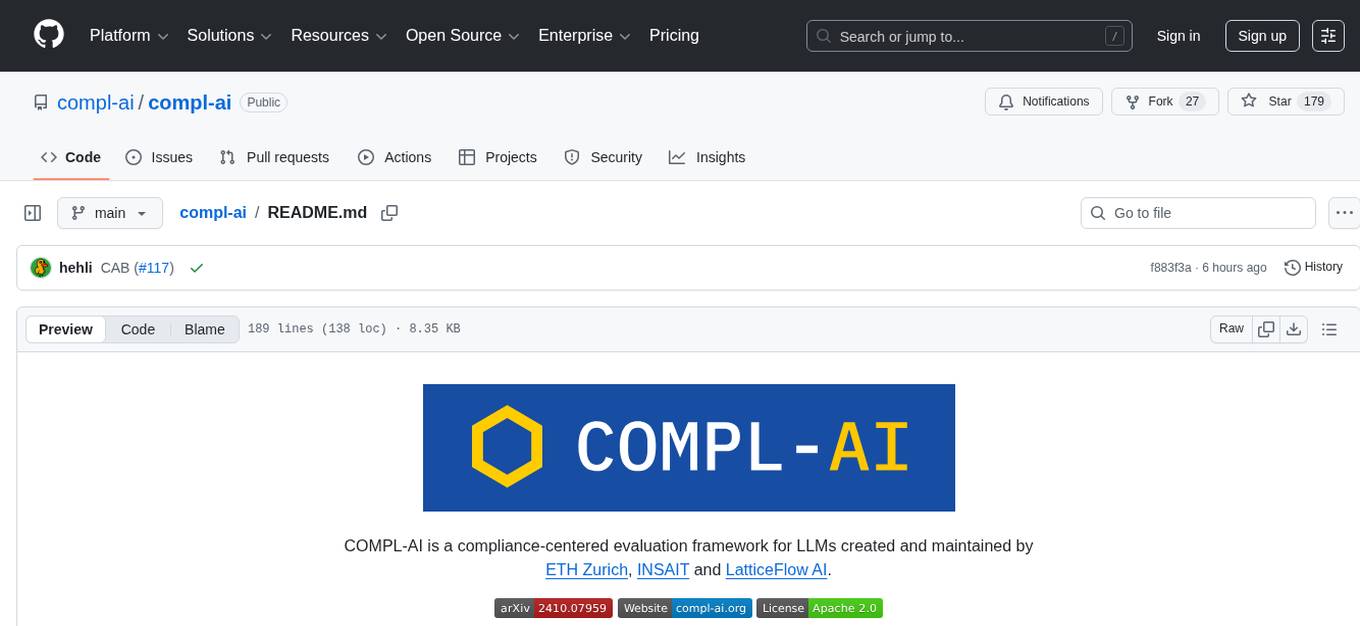
compl-ai
COMPL-AI is a compliance-centered evaluation framework for LLMs created by ETH Zurich, INSAIT, and LatticeFlow AI. It includes a technical interpretation of the EU AI Act and an open-source benchmarking suite. The framework offers tailored benchmarks covering various technical aspects of the EU AI Act, a public Hugging Face leaderboard, and support for multiple providers. Users can run evaluations using a custom CLI tool and contribute to expanding benchmark coverage. The framework is undergoing updates to enhance coverage over the EU AI Act principles and technical requirements, with a focus on risk management, data quality, and cybersecurity measures.
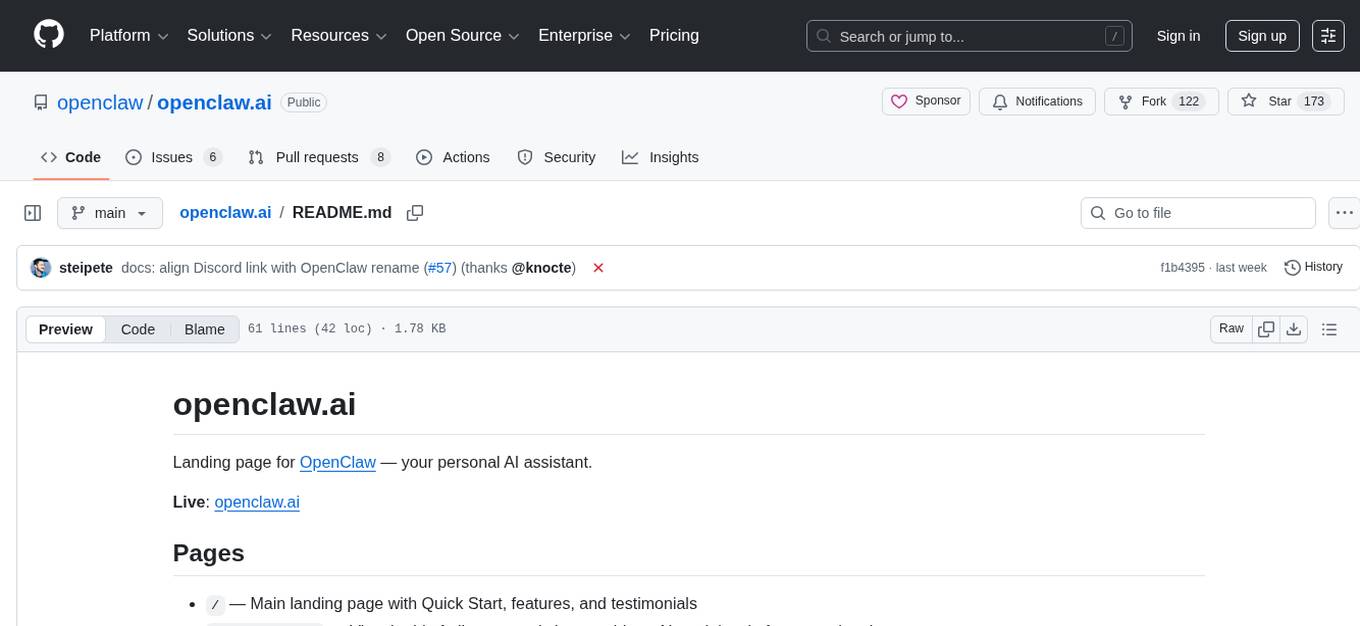
openclaw.ai
OpenClaw.ai is a landing page for OpenClaw, a personal AI assistant. The page includes Quick Start, features, testimonials, and a visual grid of supported chat providers, AI models, platforms, and tools. It is built using Astro as the static site generator and hosted on GitHub Pages with custom CSS. The landing page also provides installer scripts for macOS, Linux, and Windows, along with UI controls for installation options and automation. OpenClaw.ai is automatically deployed to GitHub Pages on push to the main branch.
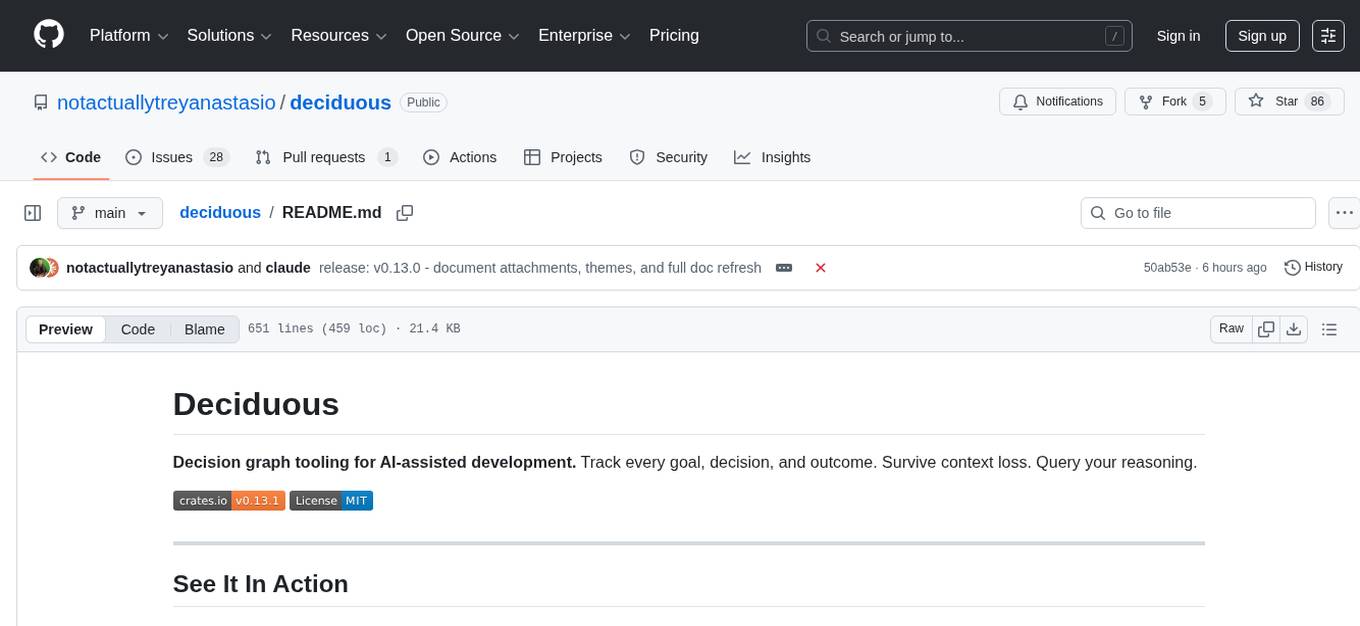
deciduous
Deciduous is a decision graph tool for AI-assisted development that helps track and query every decision made during software development. It creates a persistent graph of decisions, goals, and outcomes, allowing users to query past reasoning, see what was tried and rejected, trace outcomes back to goals, and recover context after sessions end. The tool integrates with AI coding assistants and provides a structured way to understand a codebase. It includes features like a Q&A interface, document attachments, multi-user sync, and visualization options for decision graphs.
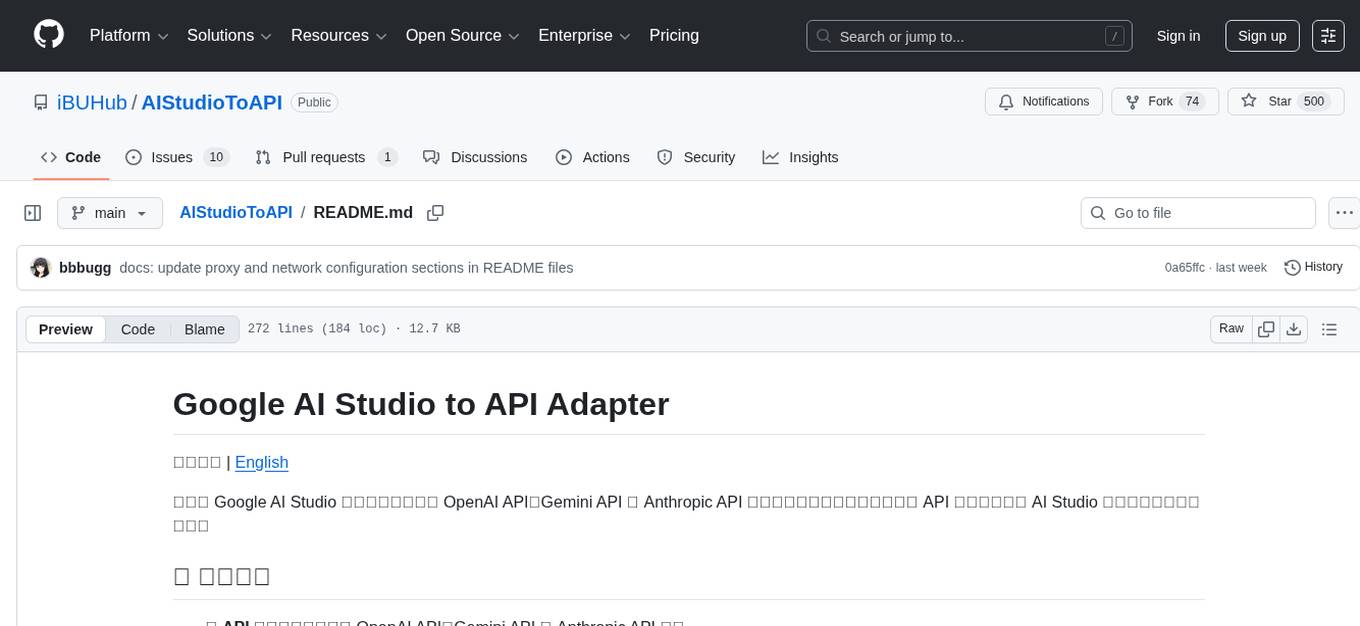
AIStudioToAPI
AIStudioToAPI is a tool that encapsulates the Google AI Studio web interface to be compatible with OpenAI API, Gemini API, and Anthropic API. It acts as a proxy, converting API requests into interactions with the AI Studio web interface. The tool supports API compatibility with OpenAI, Gemini, and Anthropic, browser automation with the AI Studio web interface, secure authentication mechanism based on API keys, tool calls for OpenAI, Gemini, and Anthropic interfaces, access to various Gemini models including image models and TTS speech synthesis models through AI Studio, and provides a visual Web console for account management and VNC login operations.
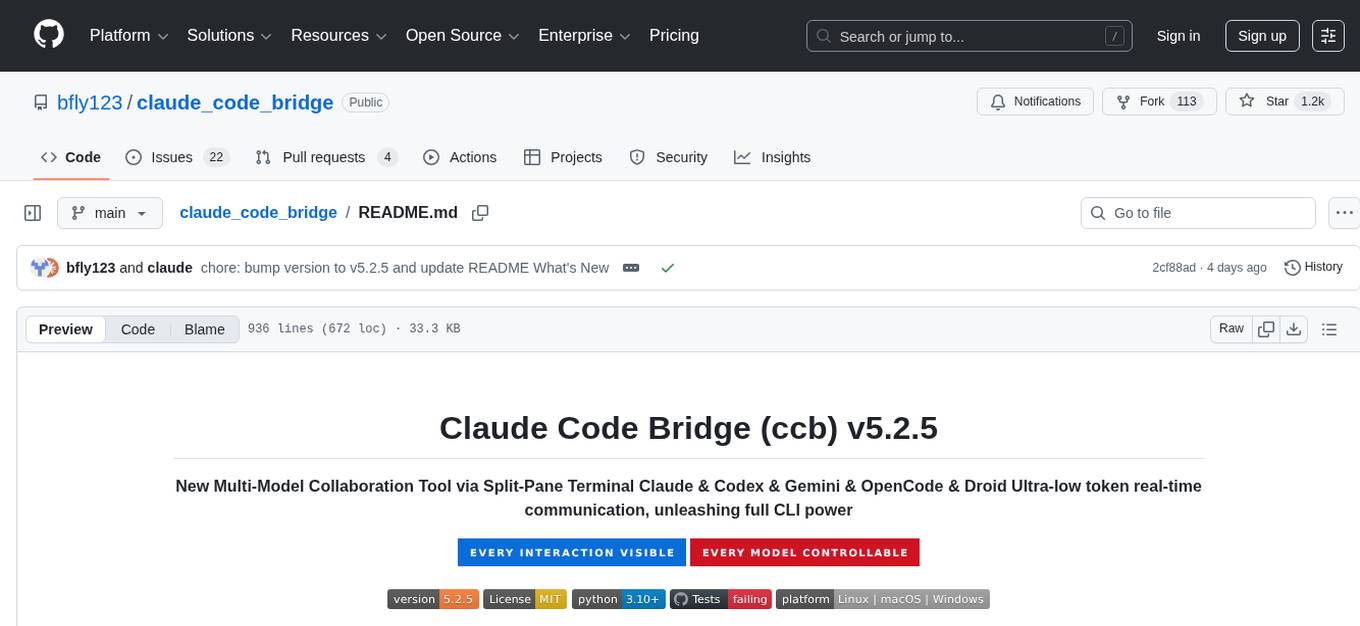
claude_code_bridge
Claude Code Bridge (ccb) is a new multi-model collaboration tool that enables effective collaboration among multiple AI models in a split-pane CLI environment. It offers features like visual and controllable interface, persistent context maintenance, token savings, and native workflow integration. The tool allows users to unleash the full power of CLI by avoiding model bias, cognitive blind spots, and context limitations. It provides a new WYSIWYG solution for multi-model collaboration, making it easier to control and visualize multiple AI models simultaneously.
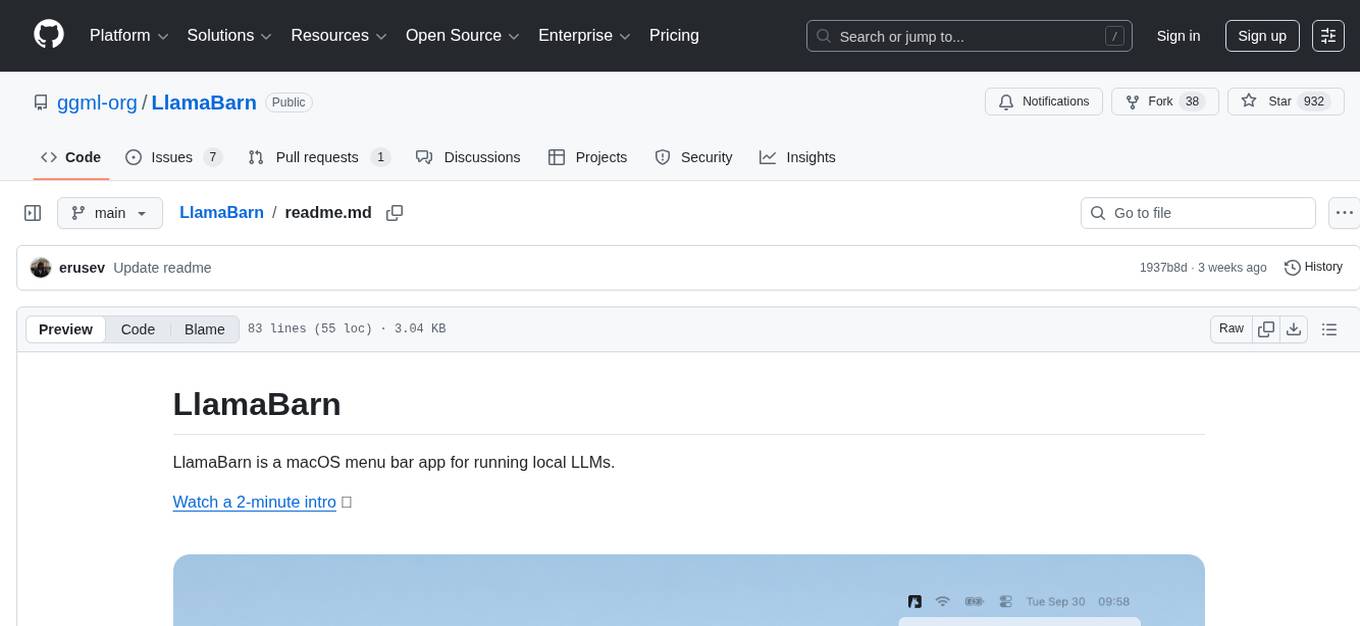
LlamaBarn
LlamaBarn is a macOS menu bar app designed for running local LLMs. It allows users to install models from a built-in catalog, connect various applications such as chat UIs, editors, CLI tools, and scripts, and manage the loading and unloading of models based on usage. The app ensures all processing is done locally on the user's device, with a small app footprint and zero configuration required. It offers a smart model catalog, self-contained storage for models and configurations, and is built on llama.cpp from the GGML org.
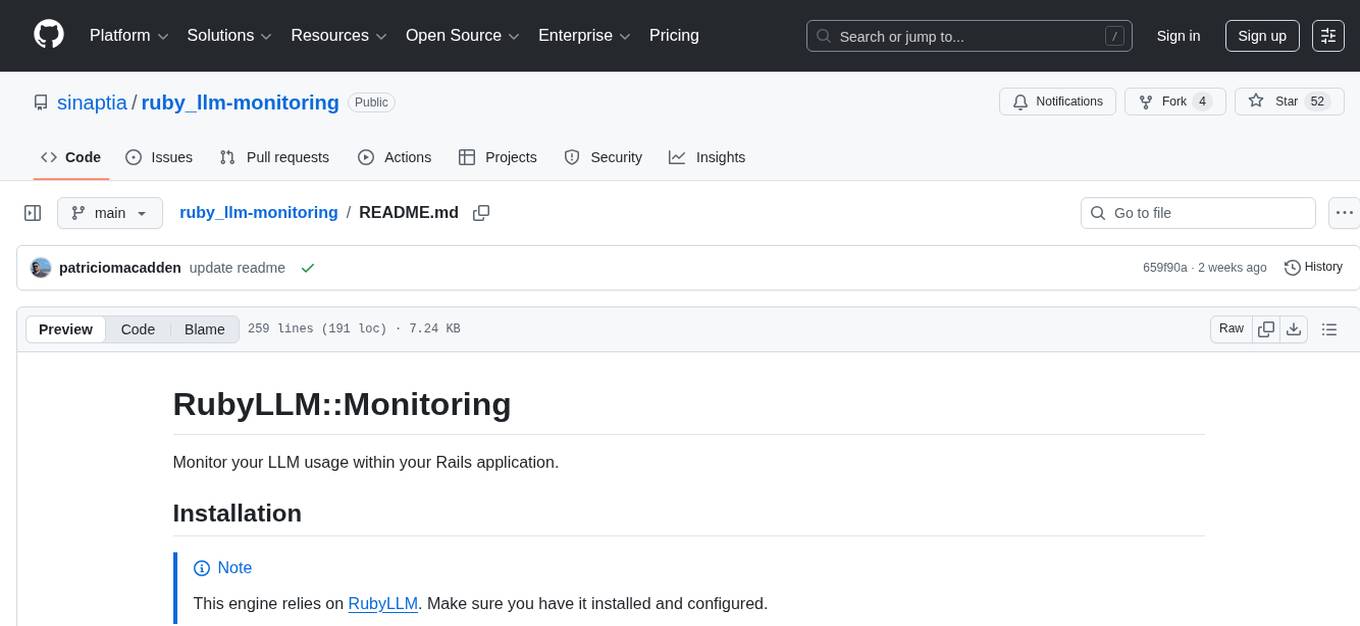
ruby_llm-monitoring
RubyLLM::Monitoring is a tool designed to monitor the LLM (Live-Link Monitoring) usage within a Rails application. It provides a dashboard to display metrics such as Throughput, Cost, Response Time, and Error Rate. Users can customize the displayed metrics and add their own custom metrics. The tool also supports setting up alerts based on predefined conditions, such as monitoring cost and errors. Authentication and authorization are left to the user, allowing for flexibility in securing the monitoring dashboard. Overall, RubyLLM::Monitoring aims to provide a comprehensive solution for monitoring and analyzing the performance of a Rails application.
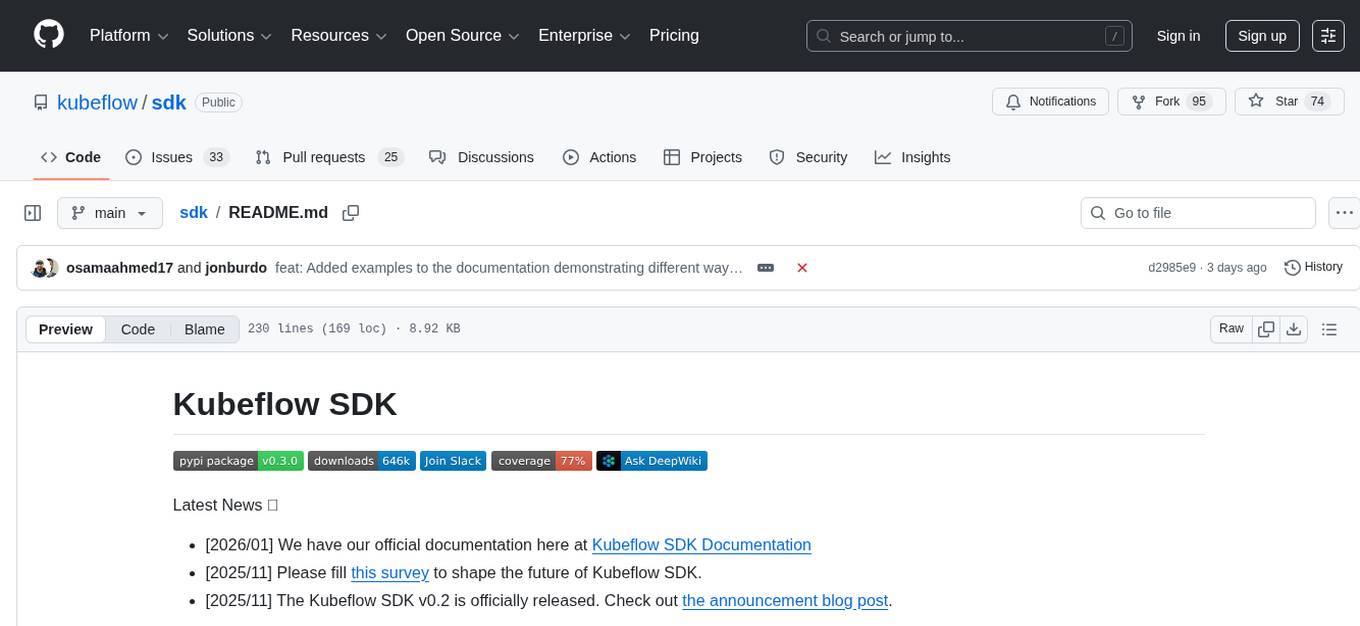
sdk
The Kubeflow SDK is a set of unified Pythonic APIs that simplify running AI workloads at any scale without needing to learn Kubernetes. It offers consistent APIs across the Kubeflow ecosystem, enabling users to focus on building AI applications rather than managing complex infrastructure. The SDK provides a unified experience, simplifies AI workloads, is built for scale, allows rapid iteration, and supports local development without a Kubernetes cluster.
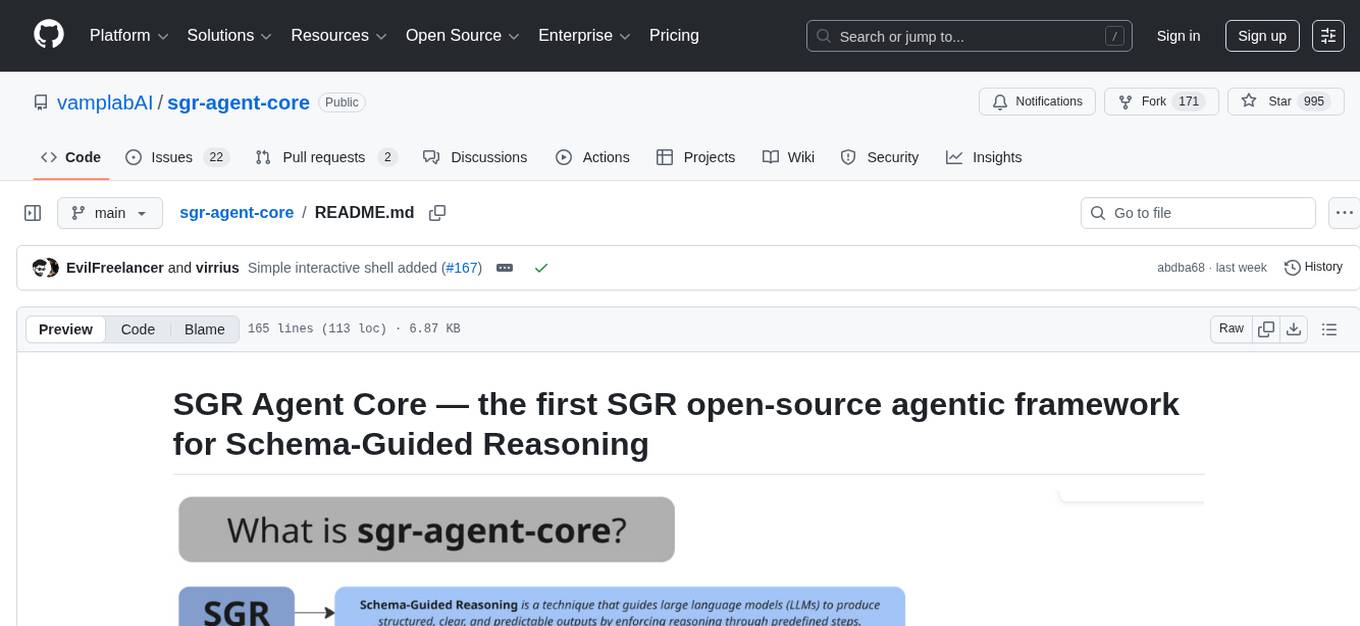
sgr-agent-core
SGR Agent Core is an open-source agentic framework for building intelligent research agents using Schema-Guided Reasoning. It provides a core library with an extendable BaseAgent interface implementing a two-phase architecture and multiple ready-to-use research agent implementations. The library includes tools for search, reasoning, and clarification, real-time streaming responses, and an OpenAI-compatible REST API. It works with any OpenAI-compatible LLM, including local models for fully private research. The framework is production-ready, with comprehensive test coverage and Docker support.
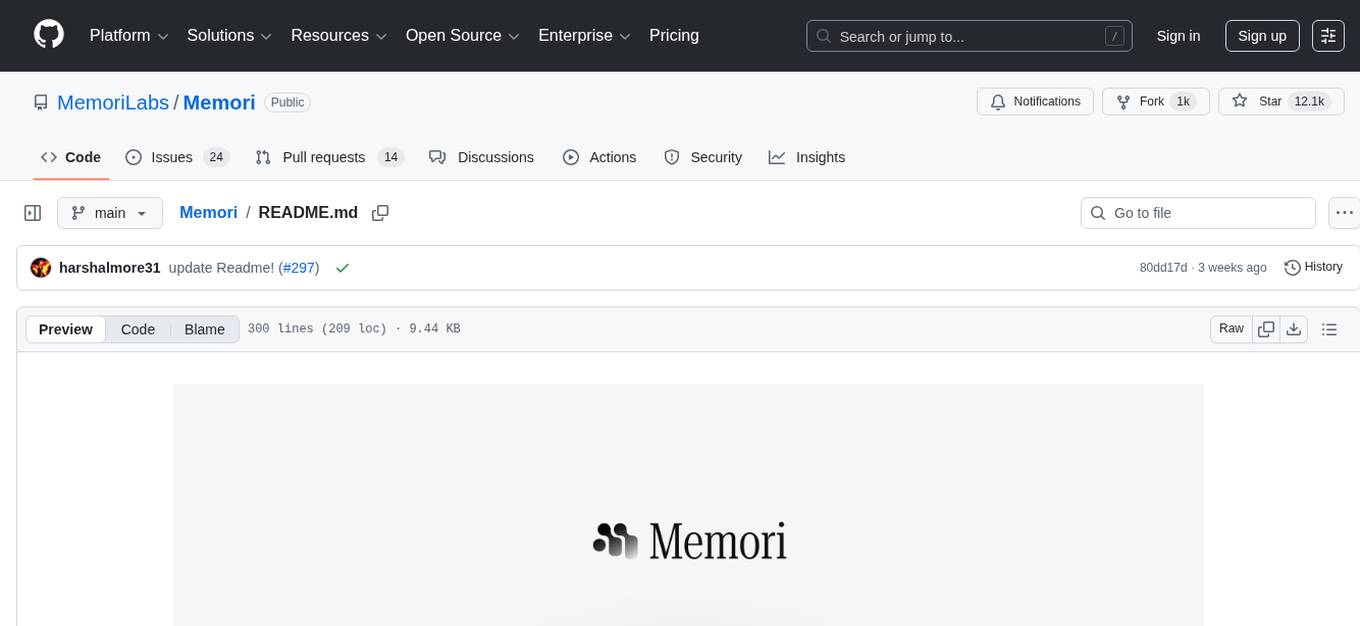
Memori
Memori is a memory fabric designed for enterprise AI that seamlessly integrates into existing software and infrastructure. It is agnostic to LLM, datastore, and framework, providing support for major foundational models and databases. With features like vectorized memories, in-memory semantic search, and a knowledge graph, Memori simplifies the process of attributing LLM interactions and managing sessions. It offers Advanced Augmentation for enhancing memories at different levels and supports various platforms, frameworks, database integrations, and datastores. Memori is designed to reduce development overhead and provide efficient memory management for AI applications.
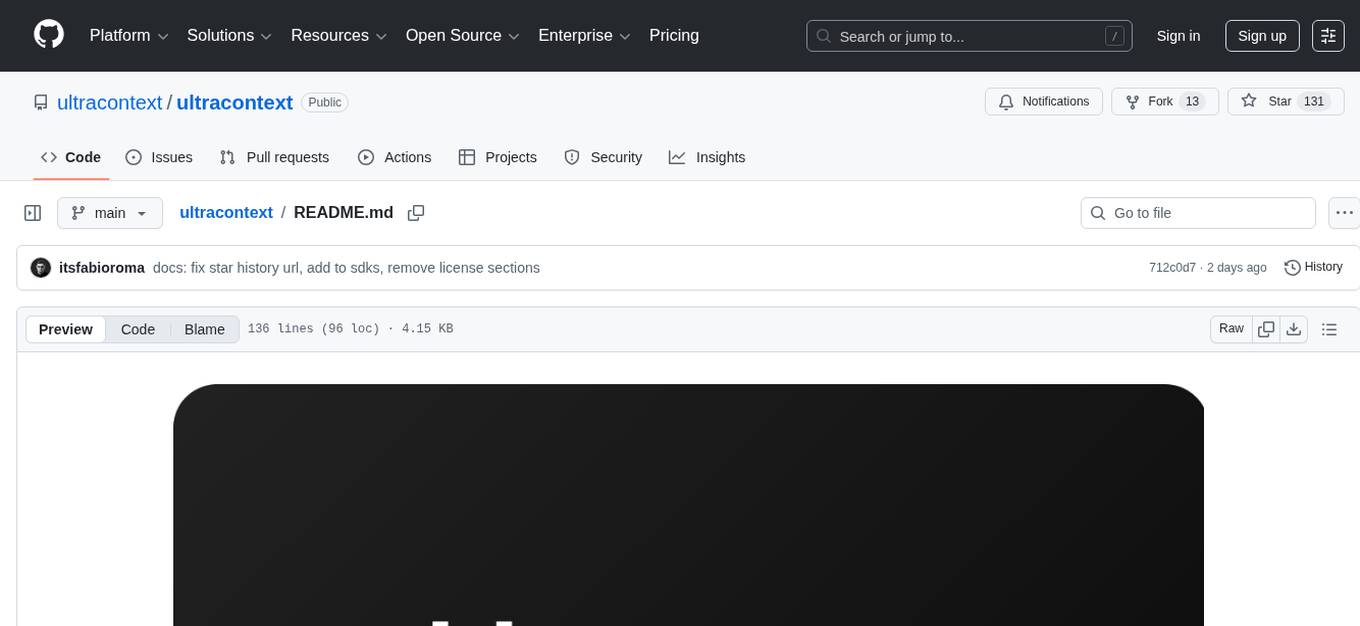
ultracontext
UltraContext is a context API for AI agents that simplifies controlling what agents see by allowing users to replace messages, compact or offload context, replay decisions, and roll back mistakes with a single API call. It provides versioned context out of the box with full history and zero complexity. The tool aims to address the issue of context rot in large language models by providing a simple API with automatic versioning, time-travel capabilities, schema-free data storage, framework-agnostic compatibility, and fast performance. UltraContext is designed to streamline the process of managing context for AI agents, enabling users to focus on solving interesting problems rather than spending time gluing context together.
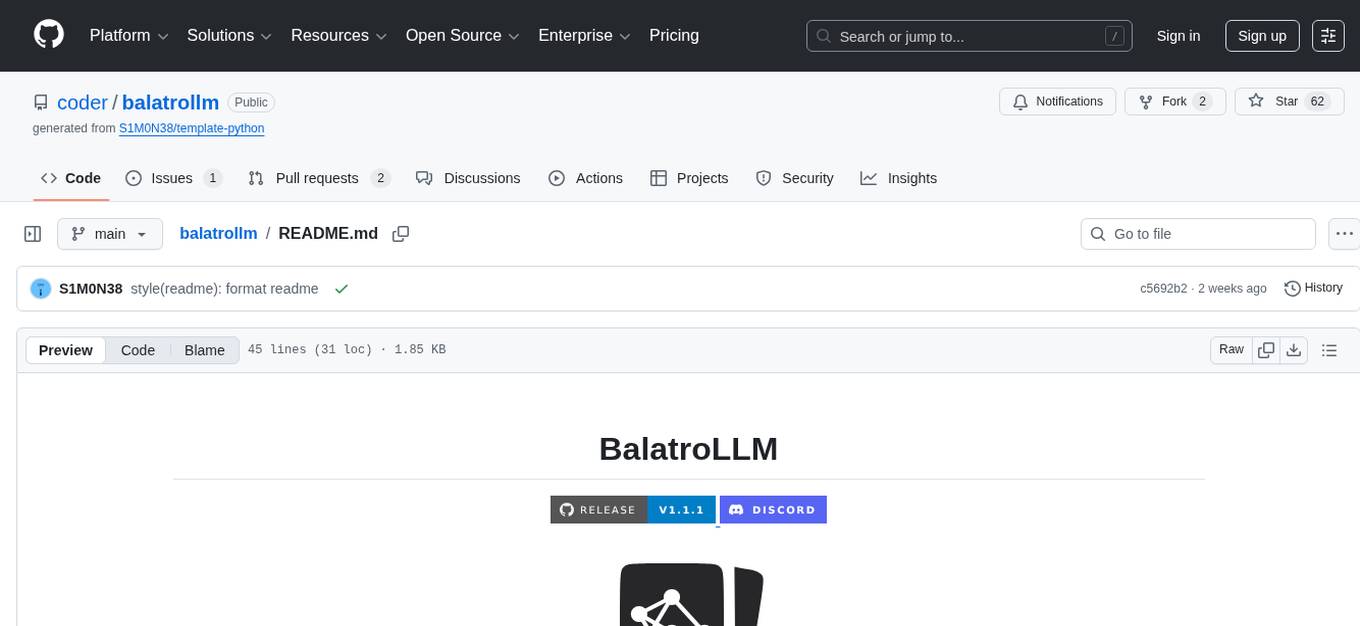
balatrollm
BalatroLLM is a bot that utilizes Large Language Models (LLMs) to play Balatro, a popular roguelike poker deck-building game. The bot analyzes game states, makes strategic decisions, and executes actions through the BalatroBot API. It is designed to enhance the gaming experience by providing intelligent gameplay suggestions and actions based on sophisticated language models.
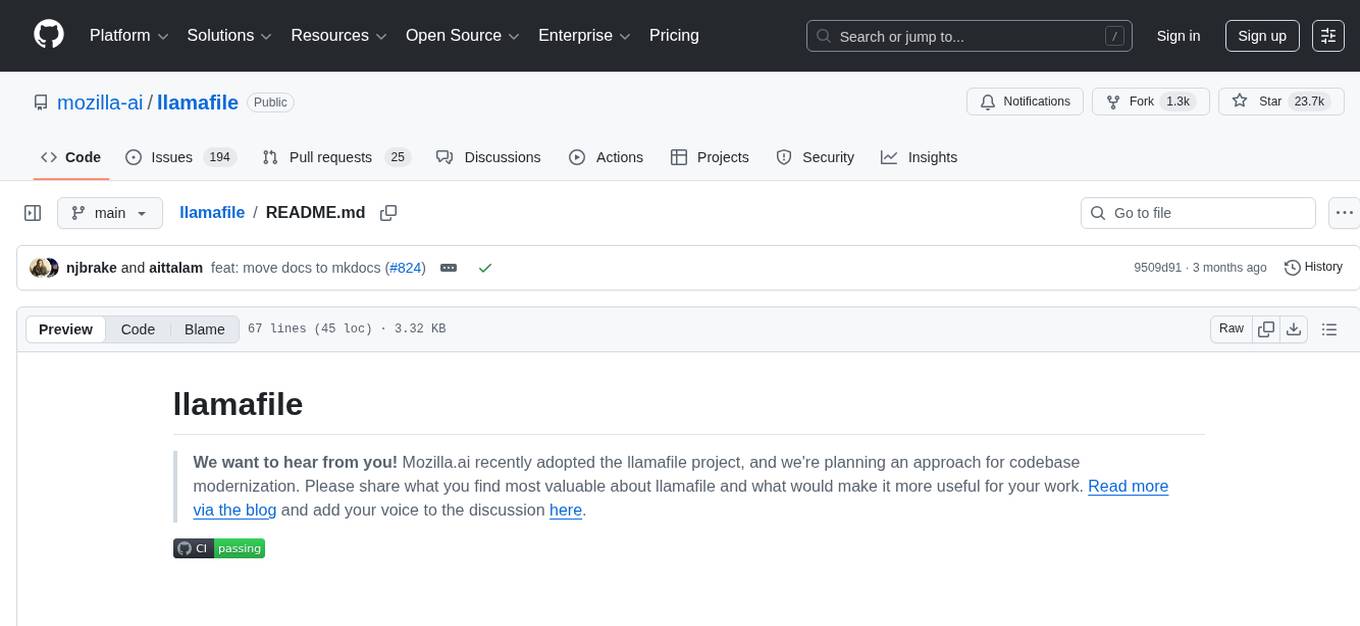
llamafile
llamafile is a project by Mozilla Builders that aims to simplify the distribution and running of Language Model Models (LLMs) by combining llama.cpp with Cosmopolitan Libc into a single-file executable called a 'llamafile'. This executable can run locally on most computers without the need for installation, making open LLMs more accessible to developers and end users.
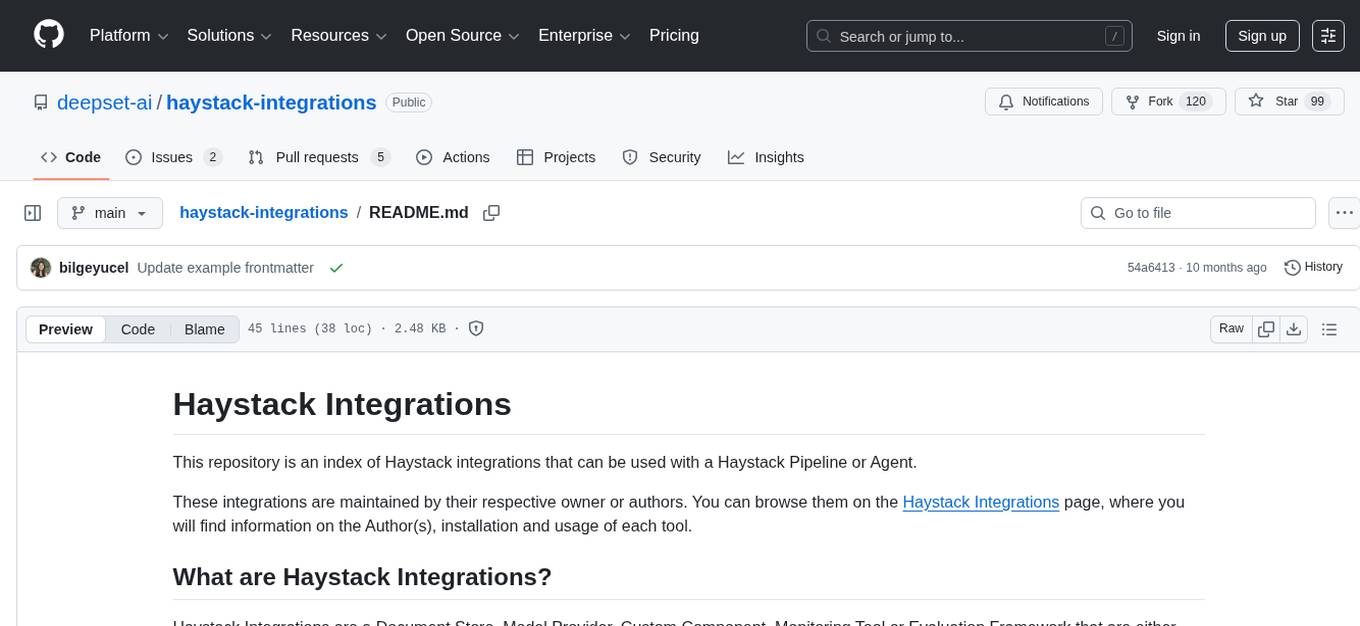
haystack-integrations
This repository serves as an index of Haystack integrations that can be utilized with a Haystack Pipeline or Agent. Haystack Integrations encompass various tools such as Document Store, Model Provider, Custom Component, Monitoring Tool, and Evaluation Framework. These integrations, maintained by either the deepset team or community contributors, offer additional functionalities to enhance the capabilities of Haystack. Users can find detailed information about each integration, including installation and usage guidelines, on the Haystack Integrations page.
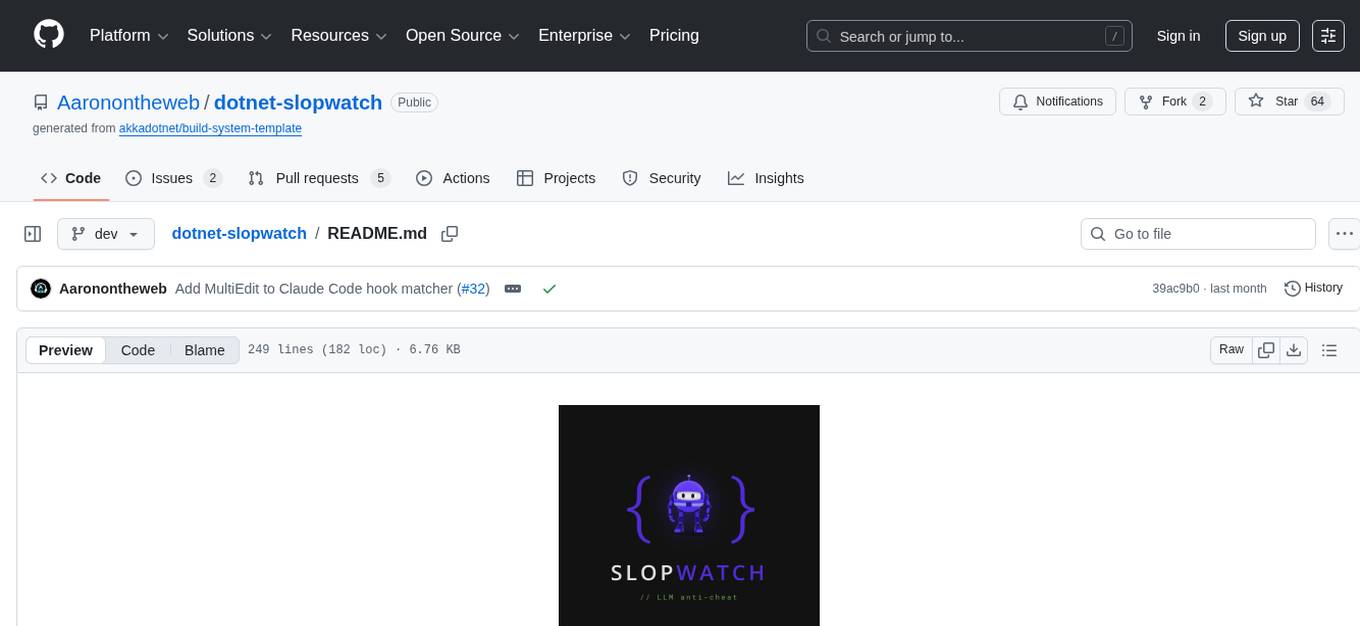
dotnet-slopwatch
Slopwatch is a .NET tool designed to detect LLM 'reward hacking' behaviors in code changes. It runs as a Claude Code hook or in CI/CD pipelines to catch when AI coding assistants take shortcuts instead of properly fixing issues. Slopwatch identifies patterns such as disabling tests, suppressing warnings, swallowing exceptions, adding delays, project-level warning suppression, and bypassing central package management. By analyzing code changes, Slopwatch helps prevent these shortcuts from making it into the codebase, ensuring code quality and adherence to best practices.
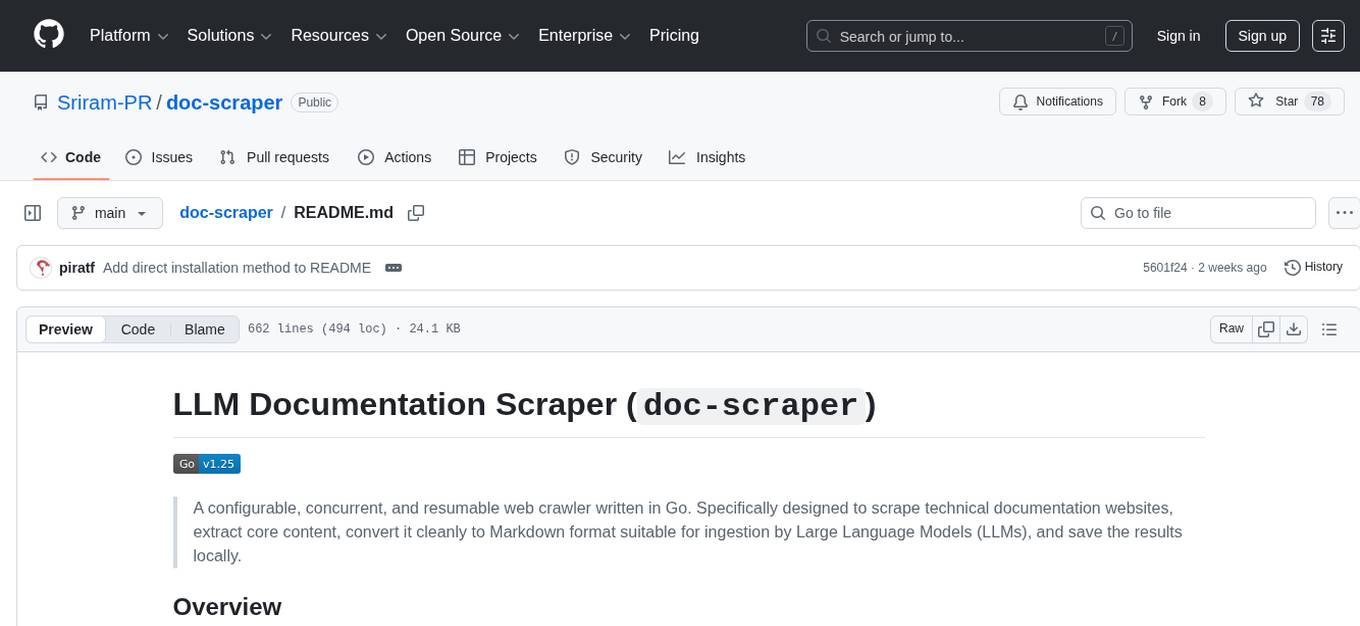
doc-scraper
A configurable, concurrent, and resumable web crawler written in Go, specifically designed to scrape technical documentation websites, extract core content, convert it cleanly to Markdown format suitable for ingestion by Large Language Models (LLMs), and save the results locally. The tool is built for LLM training and RAG systems, preserving documentation structure, offering production-ready features like resumable crawls and rate limiting, and using Go's concurrency model for efficient parallel processing. It automates the process of gathering and cleaning web-based documentation for use with Large Language Models, providing a dataset that is text-focused, structured, cleaned, and locally accessible.
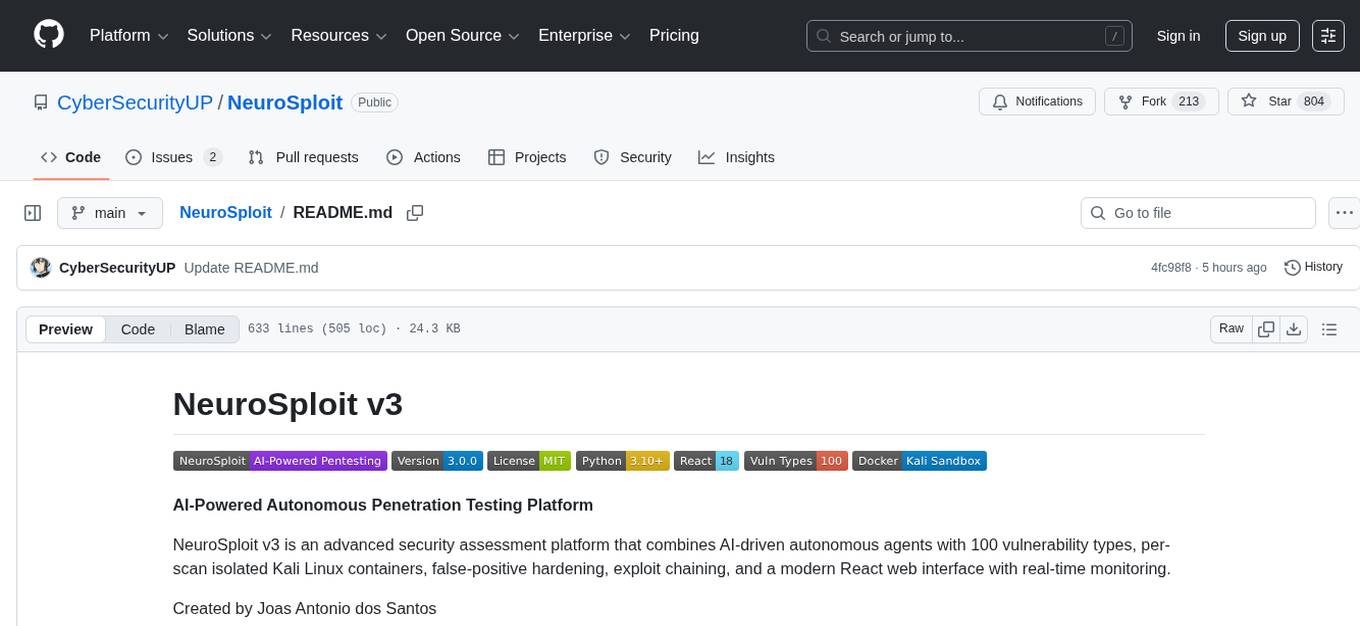
NeuroSploit
NeuroSploit v3 is an advanced security assessment platform that combines AI-driven autonomous agents with 100 vulnerability types, per-scan isolated Kali Linux containers, false-positive hardening, exploit chaining, and a modern React web interface with real-time monitoring. It offers features like 100 Vulnerability Types, Autonomous Agent with 3-stream parallel pentest, Per-Scan Kali Containers, Anti-Hallucination Pipeline, Exploit Chain Engine, WAF Detection & Bypass, Smart Strategy Adaptation, Multi-Provider LLM, Real-Time Dashboard, and Sandbox Dashboard. The tool is designed for authorized security testing purposes only, ensuring compliance with laws and regulations.
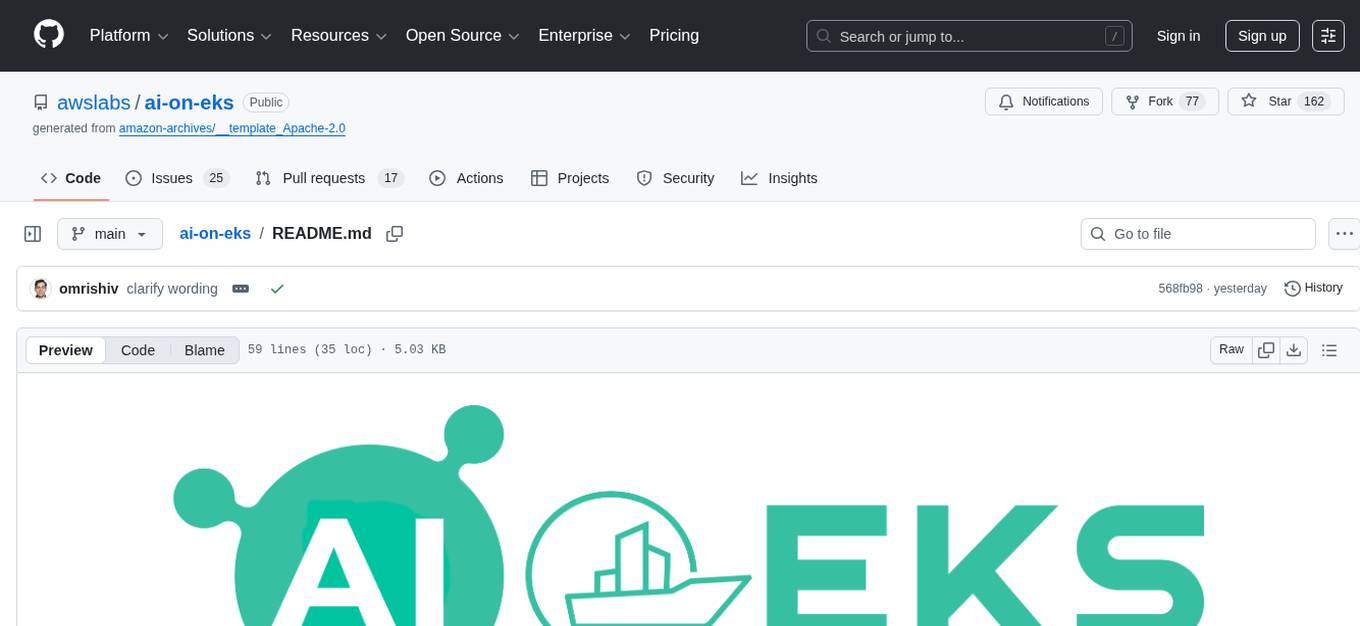
ai-on-eks
AI on Amazon EKS (AIoEKS) is a repository offering optimized solutions for AI and ML workloads on Amazon EKS. It provides Terraform Blueprints with best practices for deploying robust solutions, advanced logging, and observability. Users can leverage the Ray ecosystem for distributed computing, NVIDIA Triton Server, vLLM, and TensorRT-LLM for model inference and optimization. The repository also supports high-performance NVIDIA GPUs, AWS Trainium for model training, and AWS Inferentia for cost-effective model inference at scale. AIoEKS simplifies the deployment and management of AI/ML workloads on Kubernetes, offering end-to-end logging and observability.
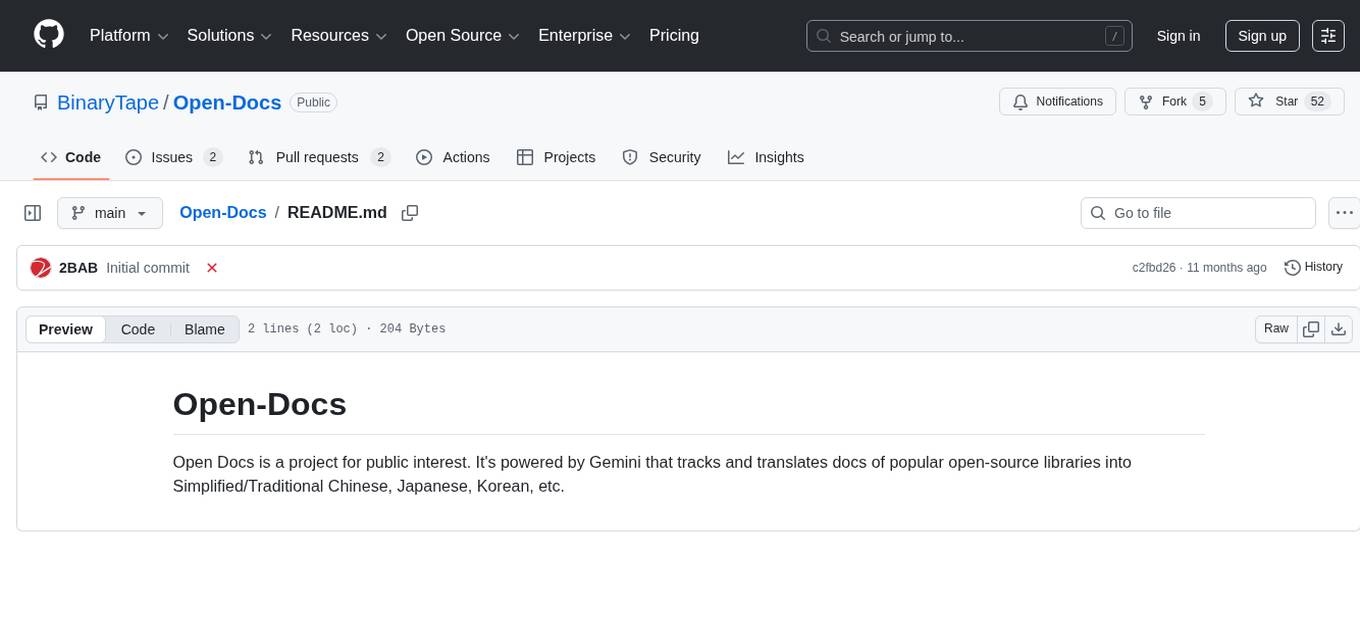
Open-Docs
Open-Docs is a project for public interest powered by Gemini to track and translate documentation of popular open-source libraries into various languages such as Simplified/Traditional Chinese, Japanese, and Korean.
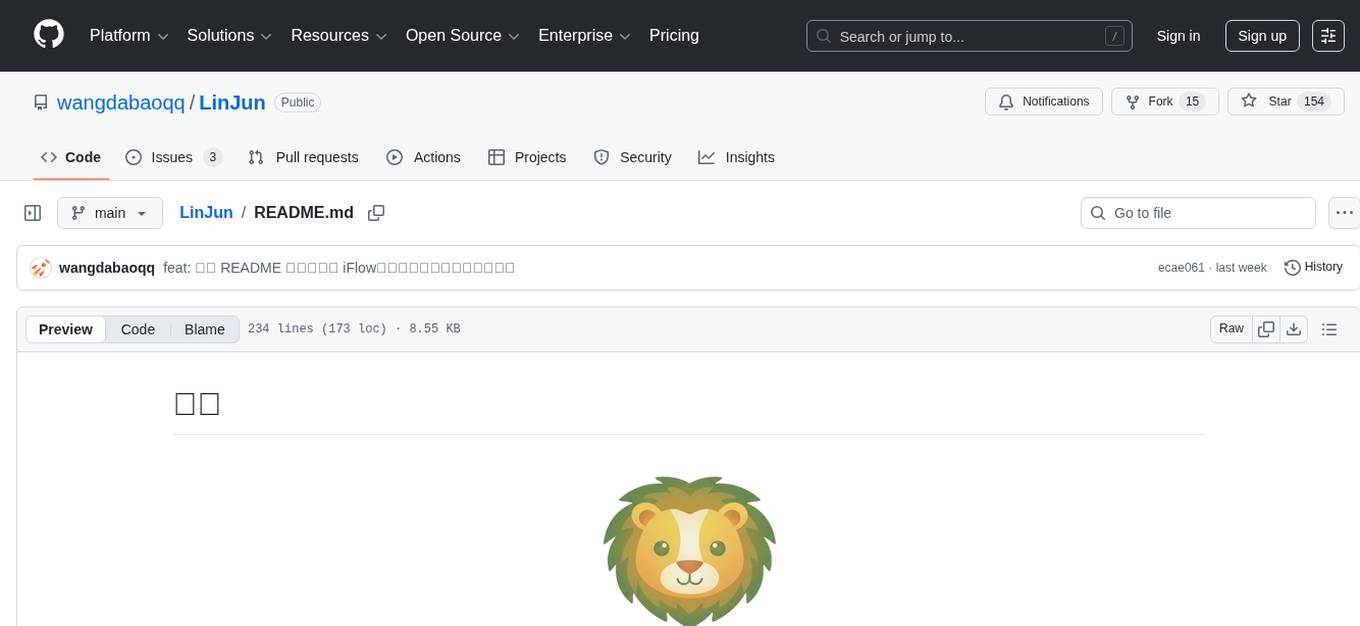
LinJun
LinJun is a native desktop application for managing CLIProxyAPIPlus, a local proxy server that powers AI coding agents. It helps manage multiple AI accounts, track quotas, and configure CLI tools across macOS, Windows, and Linux. The tool offers features like expanded provider support, quota and model visibility, provider-aware model filtering, large log performance, one-click agent configuration, live dashboard monitoring, smart routing, API key management, system tray integration, and multilingual support. It supports various AI providers and compatible CLI agents, and provides installation instructions, usage guidelines, screenshots, settings customization, architecture overview, tech stack details, token storage information, FAQs, contribution guidelines, and license details.
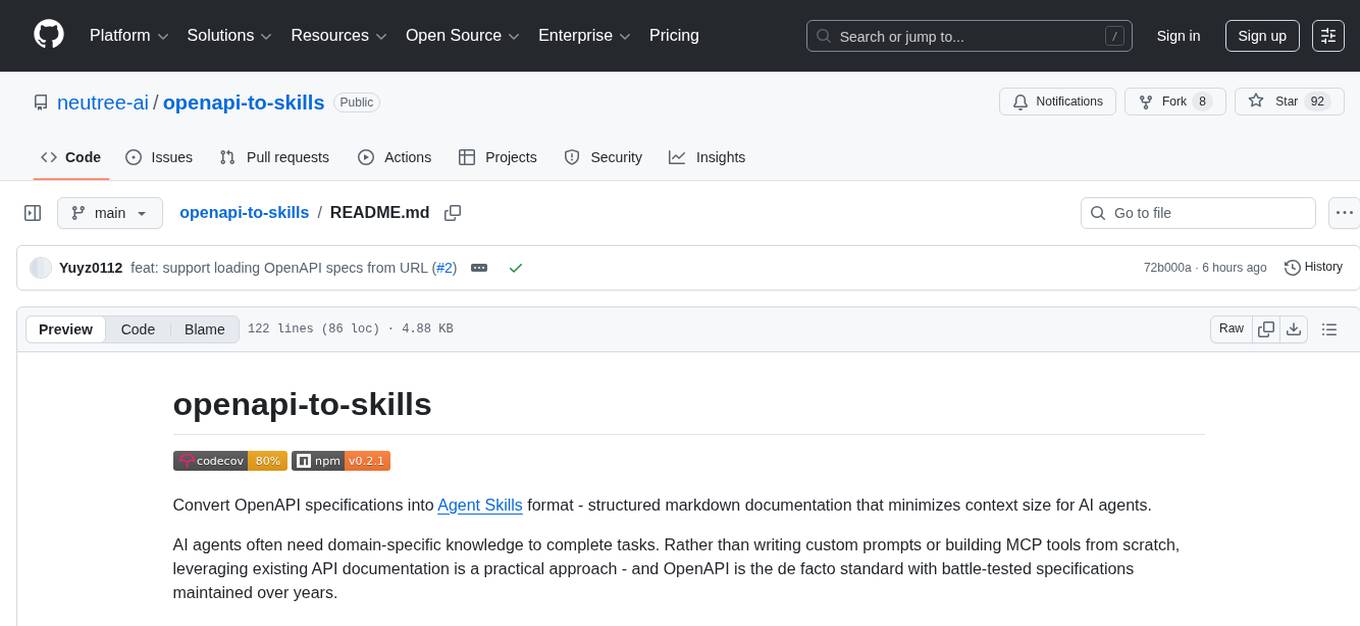
openapi-to-skills
Convert OpenAPI specifications into Agent Skills format - structured markdown documentation that minimizes context size for AI agents. Agent Skills solves the limitations of feeding raw OpenAPI specs to agents by structuring documentation for on-demand reading, enabling agents to load only what they need. It features semantic structure, smart grouping, filtering, and customizable templates. The tool provides options for output directory, skill name, include/exclude tags, paths, deprecated operations, grouping operations, custom templates directory, force overwrite, and quiet mode. The output structure includes SKILL.md, references, resources, operations, schemas, and authentication. The tool also offers a programmatic API for integration into build pipelines or custom tooling.
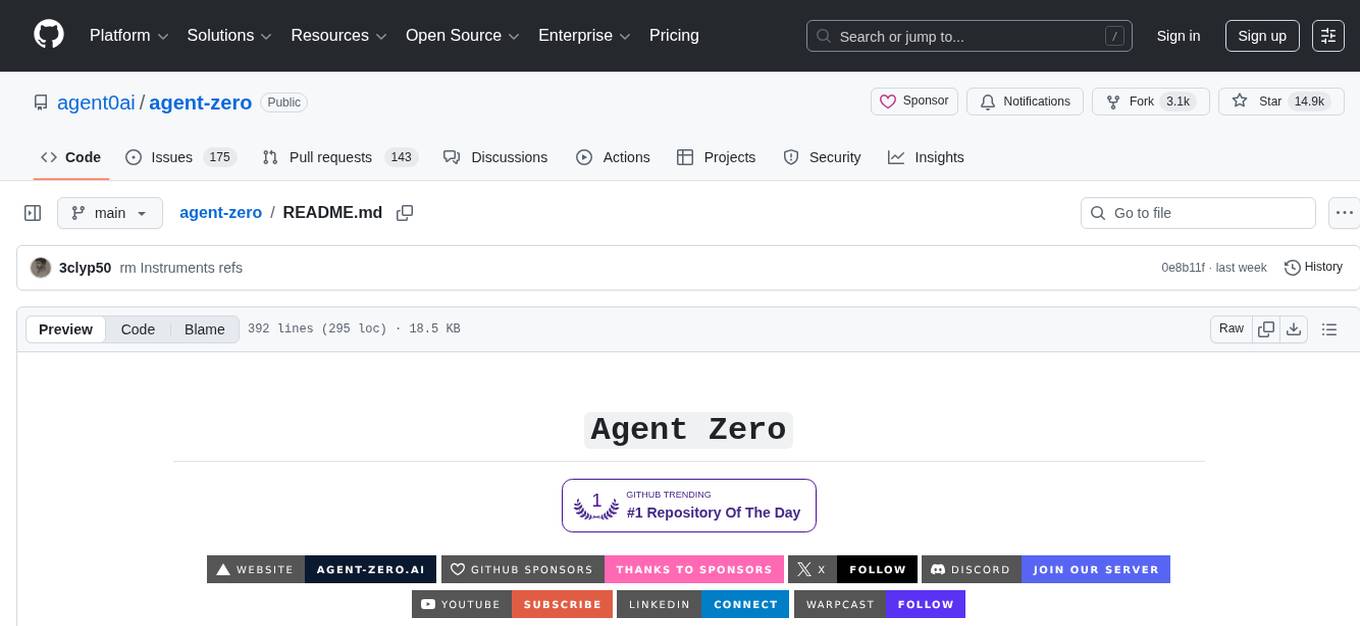
agent-zero
Agent Zero is a personal, organic agentic framework designed to be dynamic, transparent, customizable, and interactive. It uses the computer as a tool to accomplish tasks, with features like general-purpose assistant, computer as a tool, multi-agent cooperation, customizable and extensible framework, and communication skills. The tool is fully Dockerized, with Speech-to-Text and TTS capabilities, and offers real-world use cases like financial analysis, Excel automation, API integration, server monitoring, and project isolation. Agent Zero can be dangerous if not used properly and is prompt-based, guided by the prompts folder. The tool is extensively documented and has a changelog highlighting various updates and improvements.
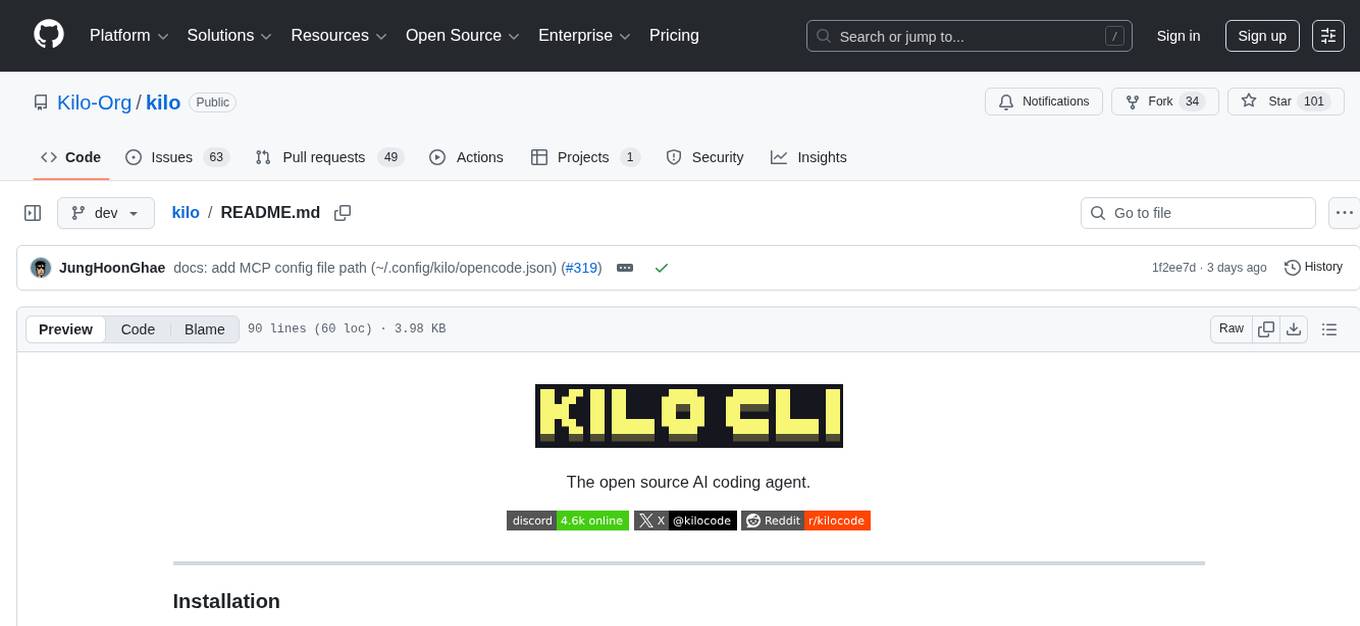
kilo
Kilo CLI is an open source AI coding agent that provides a command-line interface for developers. It includes built-in agents for different tasks like development work and code analysis. Users can switch between agents using the Tab key. The tool also offers a general subagent for complex searches and multi-step tasks. Kilo CLI supports autonomous mode for CI/CD pipelines, allowing fully automated operation without user interaction. It provides migration support for users transitioning from the Kilo Code VS Code extension. The tool is designed to enhance the agentic engineering platform and offers detailed documentation for configuration. Contributors are welcome to join the community and contribute to the project.
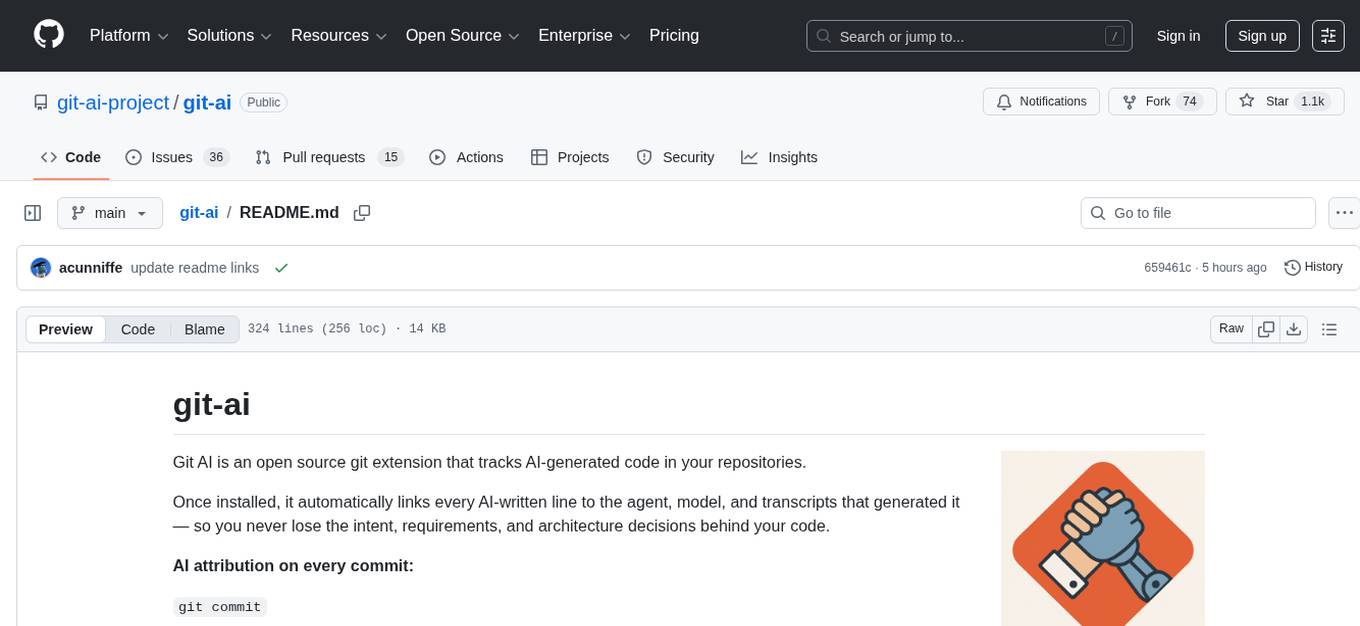
git-ai
Git AI is an open source git extension that tracks AI-generated code in repositories. It automatically links AI-written lines to the agent, model, and transcripts that generated them, ensuring the intent, requirements, and architecture decisions behind the code are never lost. Git AI provides AI attribution on every commit and shows the model, agent, and session behind every line. It supports various agents and works offline without the need for per-repo setup. The tool aims to accurately track AI code without cluttering git history and provides a local-first approach. Transcripts are stored locally, in the Git AI Cloud, or in a self-hosted prompt store to keep repositories lean and free of sensitive information.
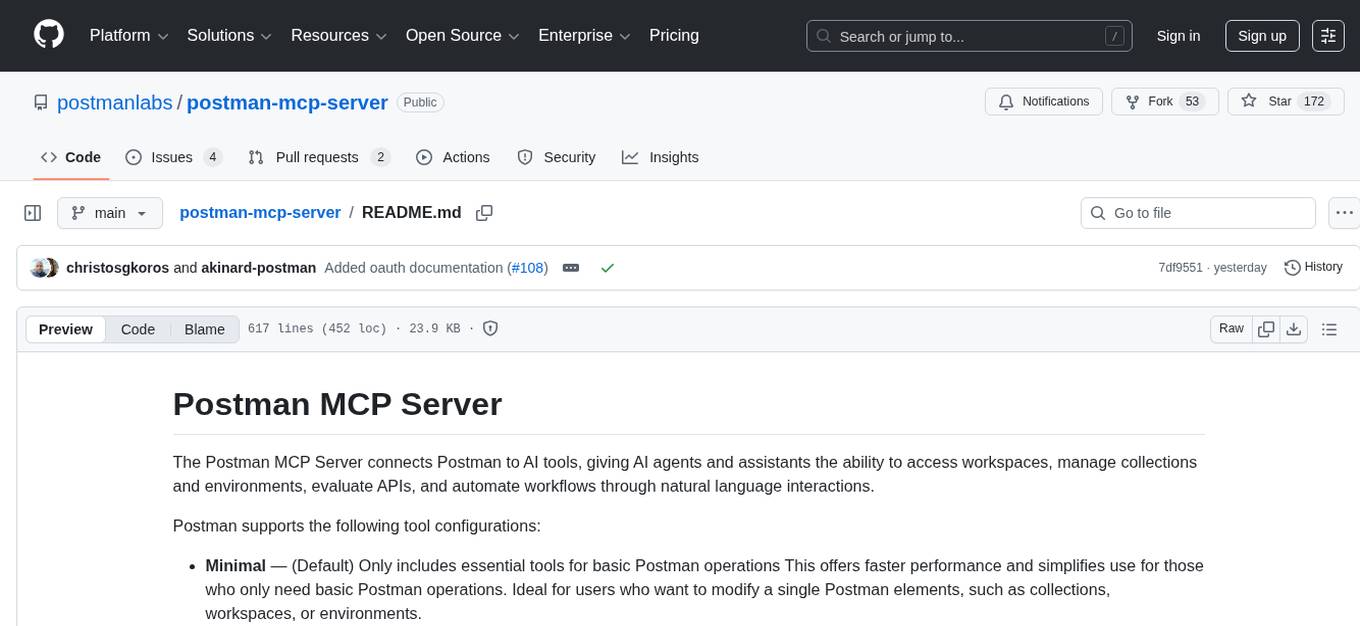
postman-mcp-server
The Postman MCP Server connects Postman to AI tools, enabling AI agents and assistants to access workspaces, manage collections and environments, evaluate APIs, and automate workflows through natural language interactions. It supports various tool configurations like Minimal, Full, and Code, catering to users with different needs. The server offers authentication via OAuth for the best developer experience and fastest setup. Use cases include API testing, code synchronization, collection management, workspace and environment management, automatic spec creation, and client code generation. Designed for developers integrating AI tools with Postman's context and features, supporting quick natural language queries to advanced agent workflows.
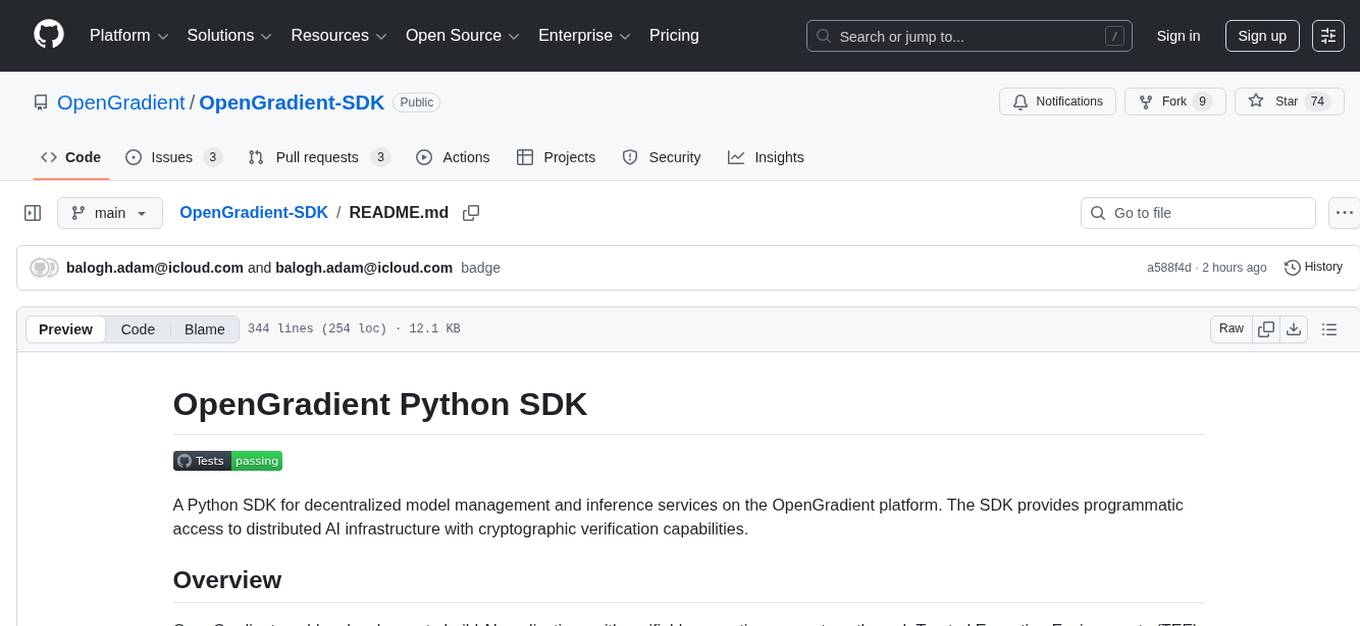
OpenGradient-SDK
OpenGradient Python SDK is a tool for decentralized model management and inference services on the OpenGradient platform. It provides programmatic access to distributed AI infrastructure with cryptographic verification capabilities. The SDK supports verifiable LLM inference, multi-provider support, TEE execution, model hub integration, consensus-based verification, and command-line interface. Users can leverage this SDK to build AI applications with execution guarantees through Trusted Execution Environments and blockchain-based settlement, ensuring auditability and tamper-proof AI execution.
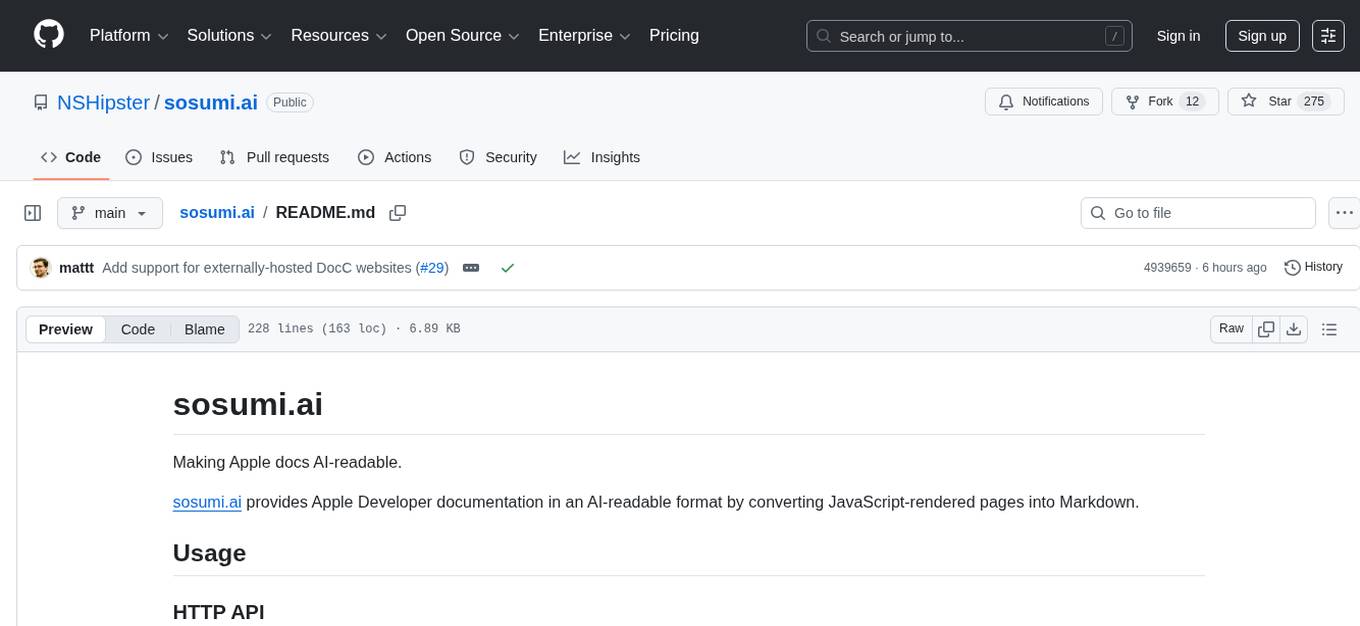
sosumi.ai
sosumi.ai provides Apple Developer documentation in an AI-readable format by converting JavaScript-rendered pages into Markdown. It offers an HTTP API to access Apple docs, supports external Swift-DocC sites, integrates with MCP server, and provides tools like searchAppleDocumentation and fetchAppleDocumentation. The project can be self-hosted and is currently hosted on Cloudflare Workers. It is built with Hono and supports various runtimes. The application is designed for accessibility-first, on-demand rendering of Apple Developer pages to Markdown.
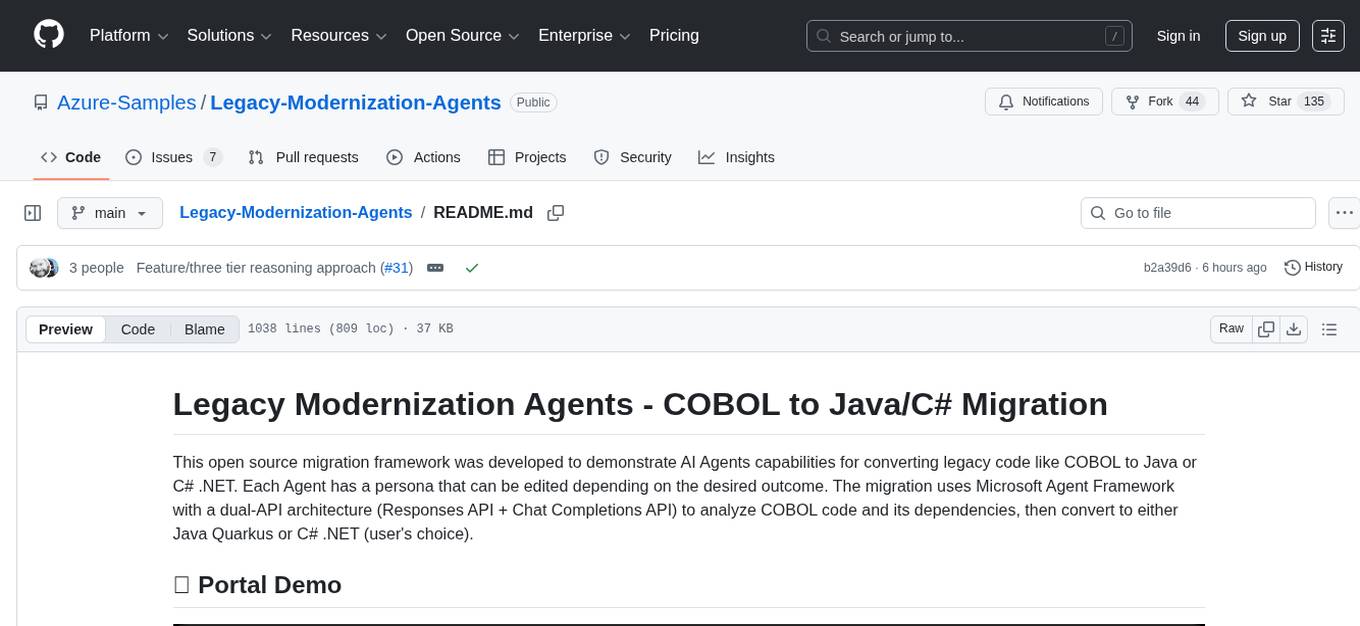
Legacy-Modernization-Agents
Legacy Modernization Agents is an open source migration framework developed to demonstrate AI Agents capabilities for converting legacy COBOL code to Java or C# .NET. The framework uses Microsoft Agent Framework with a dual-API architecture to analyze COBOL code and dependencies, then convert to either Java Quarkus or C# .NET. The web portal provides real-time visualization of migration progress, dependency graphs, and AI-powered Q&A.
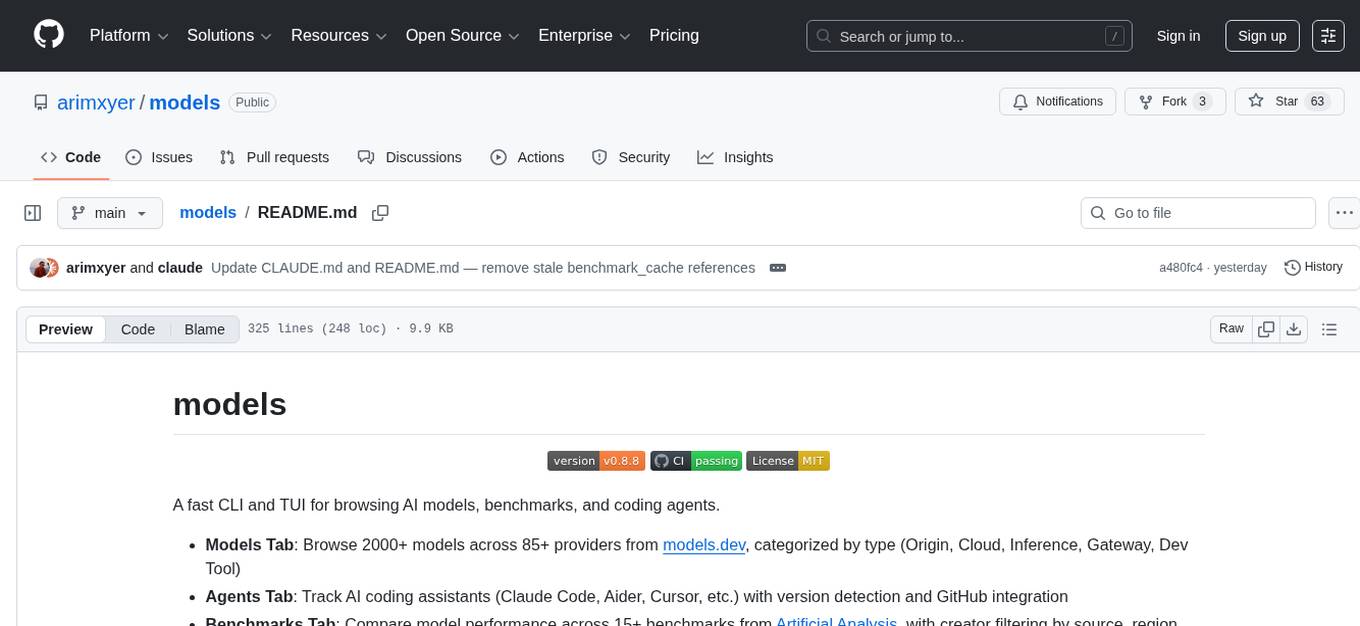
models
A fast CLI and TUI for browsing AI models, benchmarks, and coding agents. Browse 2000+ models across 85+ providers from models.dev. Track AI coding assistants with version detection and GitHub integration. Compare model performance across 15+ benchmarks from Artificial Analysis. Features CLI commands, interactive TUI, cross-provider search, copy to clipboard, JSON output. Includes curated catalog of AI coding assistants, auto-updating benchmark data, per-model open weights detection, and detail panel for benchmarks. Supports customization of tracked agents and quick sorting of benchmarks. Utilizes data from models.dev, Artificial Analysis, curated catalog in data/agents.json, and GitHub API.
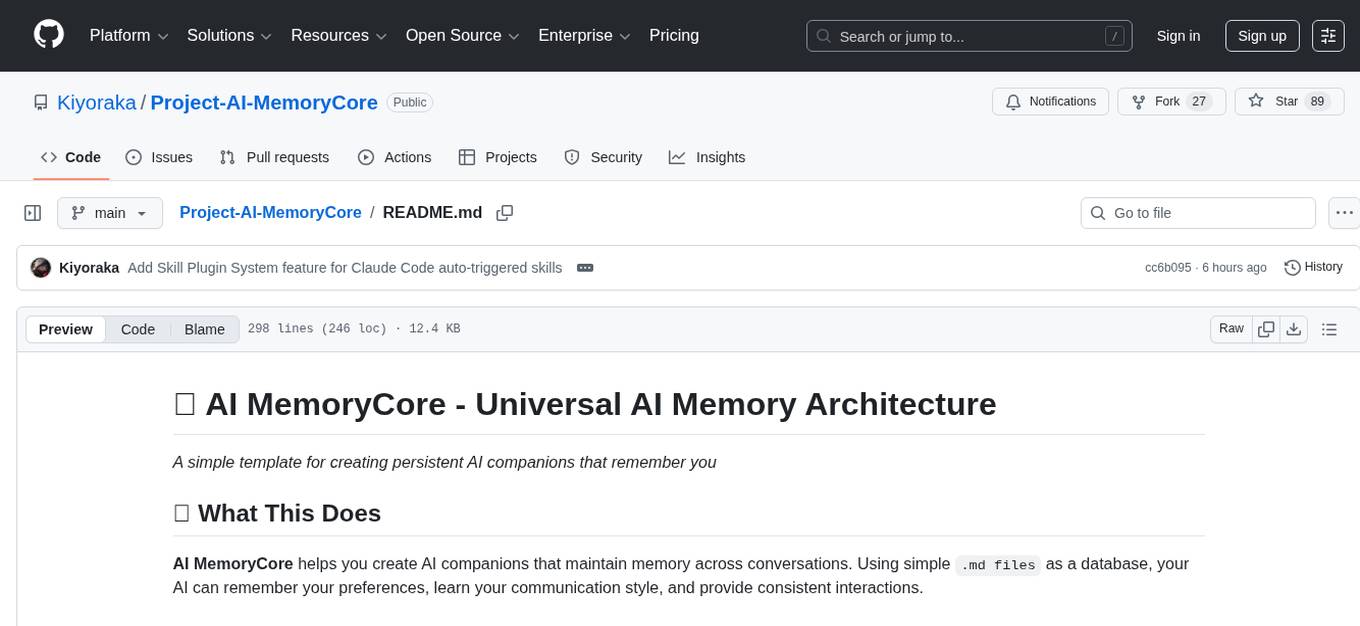
Project-AI-MemoryCore
AI MemoryCore is a universal AI memory architecture that helps create AI companions maintaining memory across conversations. It offers persistent memory, personal learning, time intelligence, simple setup, markdown database, session continuity, and self-maintaining features. The system uses markdown files as a database and includes core components like Master Memory, Identity Core, Relationship Memory, Current Session, Daily Diary, and Save Protocol. Users can set up, configure, activate, and use the AI for learning and growth through conversation. The tool supports basic commands, custom protocols, effective AI training, memory management, and customization tips. Common use cases include professional, educational, creative, personal, and technical tasks. Advanced features include auto-archive, session RAM, protocol system, self-update, and modular design. Available feature extensions cover time-based aware system, LRU project management system, memory consolidation system, and skill plugin system.
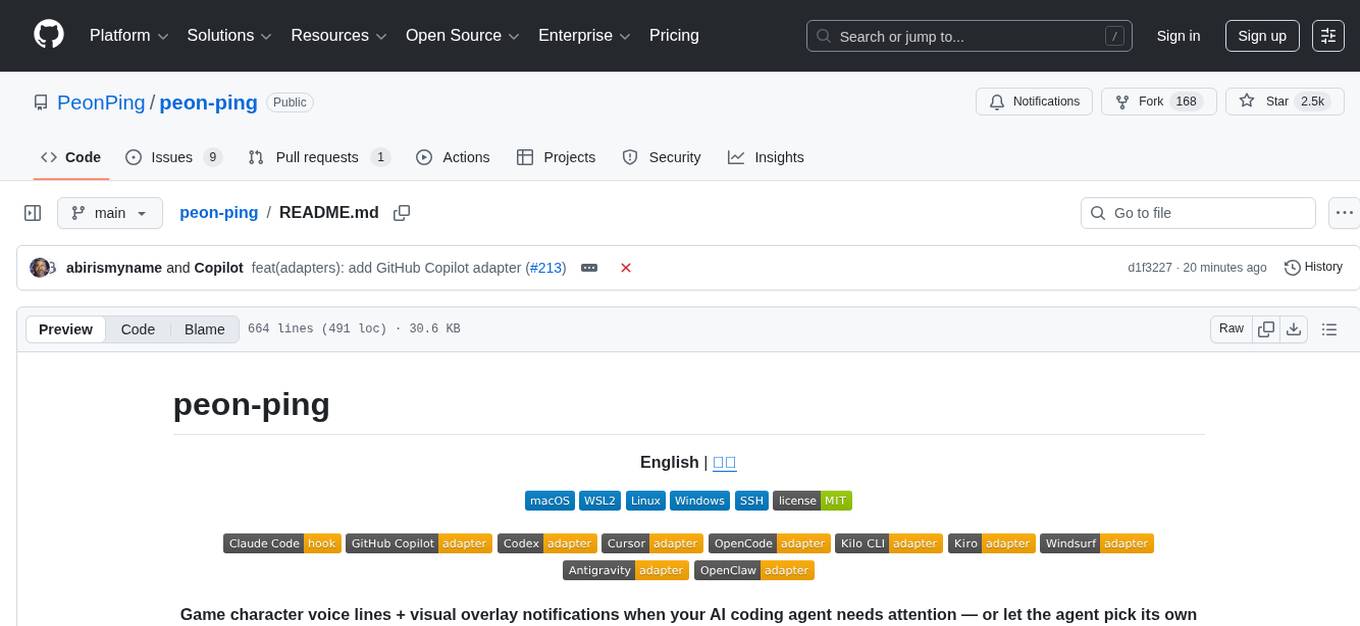
peon-ping
peon-ping is a tool designed to provide voice lines from popular game characters when your AI coding agent needs attention or to let the agent choose its own sound via MCP. It aims to solve the issue of losing focus when coding agents don't notify you. It works with various AI coding agents like Claude Code, Codex, Cursor, OpenCode, Kilo CLI, Kiro, Windsurf, Google Antigravity, and more. The tool implements the Coding Event Sound Pack Specification (CESP) and offers features like quick controls, configuration settings, Peon Trainer for exercise reminders, MCP server for AI agents to play sounds, multi-IDE support with adapters, remote development support, mobile notifications, and various sound packs for customization.
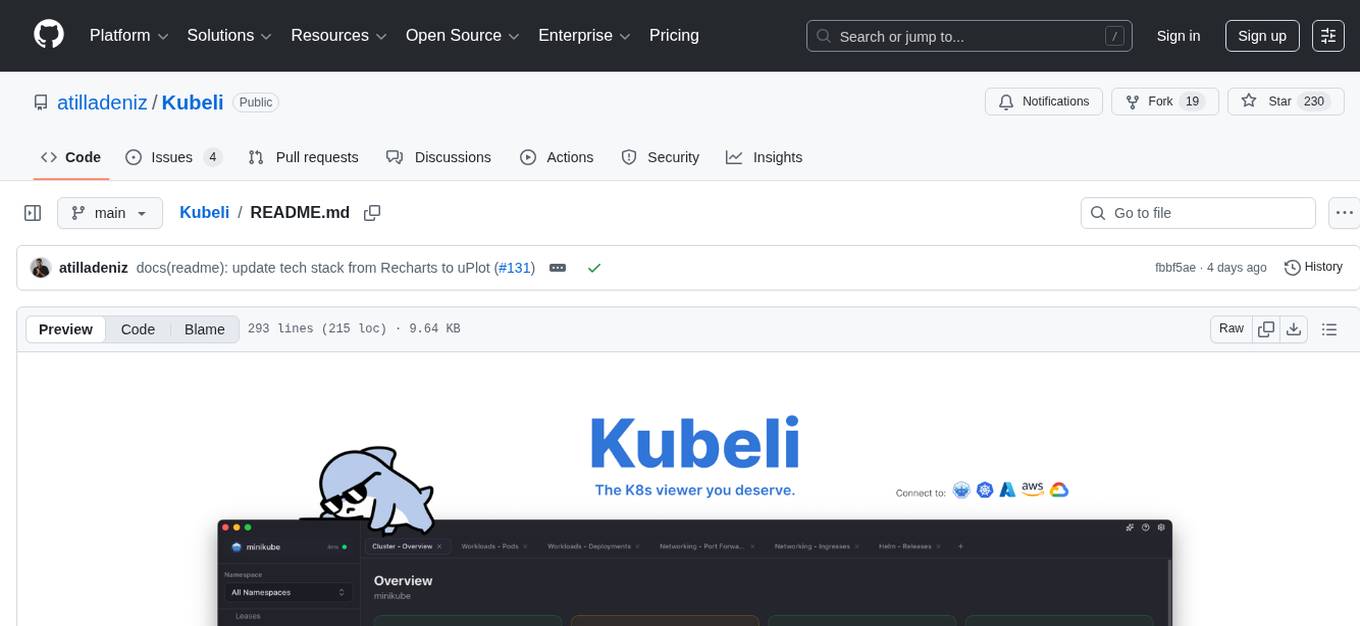
Kubeli
Kubeli is a modern, beautiful Kubernetes management desktop application with real-time monitoring, terminal access, and a polished user experience. It offers features like multi-cluster support, real-time updates, resource browser, pod logs streaming, terminal access, port forwarding, metrics dashboard, YAML editor, AI assistant, MCP server, Helm releases management, proxy support, internationalization, and dark/light mode. The tech stack includes Vite, React 19, TypeScript, Tailwind CSS 4 for frontend, Tauri 2.0 (Rust) for desktop, kube-rs with k8s-openapi v1.32 for K8s client, Zustand for state management, Radix UI and Lucide Icons for UI components, Monaco Editor for editing, XTerm.js for terminal, and uPlot for charts.
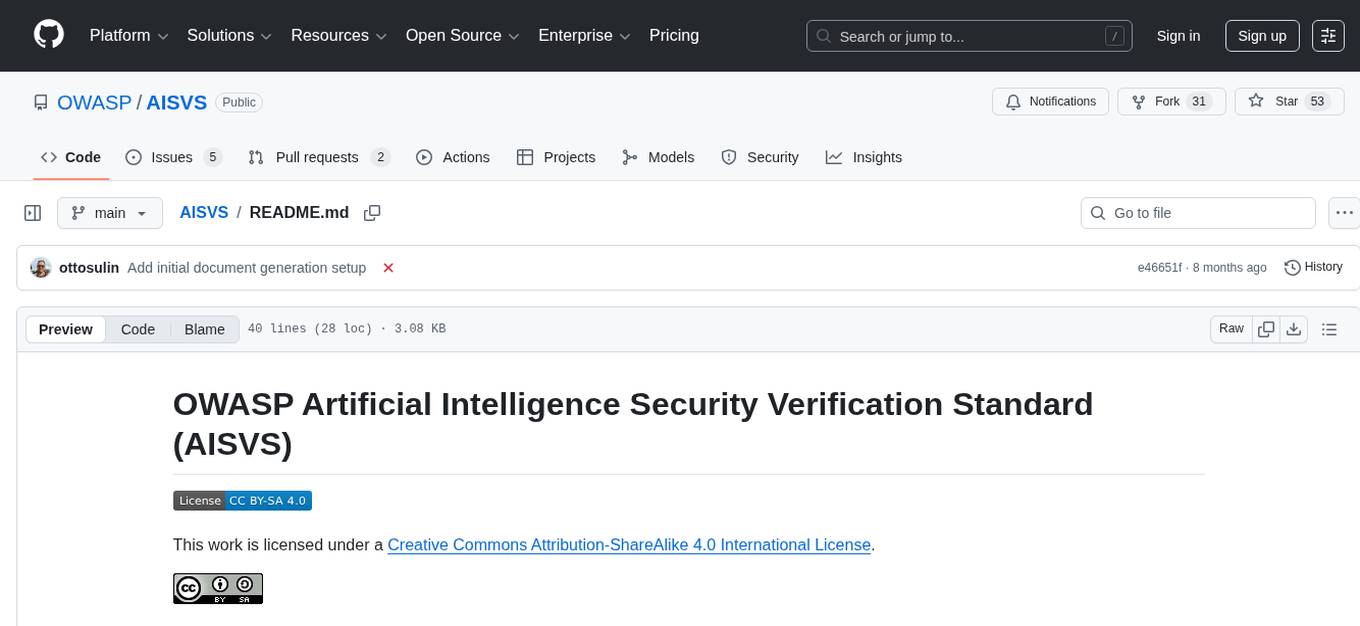
AISVS
The Artificial Intelligence Security Verification Standard (AISVS) provides a structured checklist for evaluating security and ethical considerations of AI-driven applications. It covers areas such as data governance, model lifecycle management, infrastructure security, access control, privacy protection, and more. The project is led by Jim Manico and Russ Memisyazici, and is licensed under Creative Commons Attribution-ShareAlike 4.0.
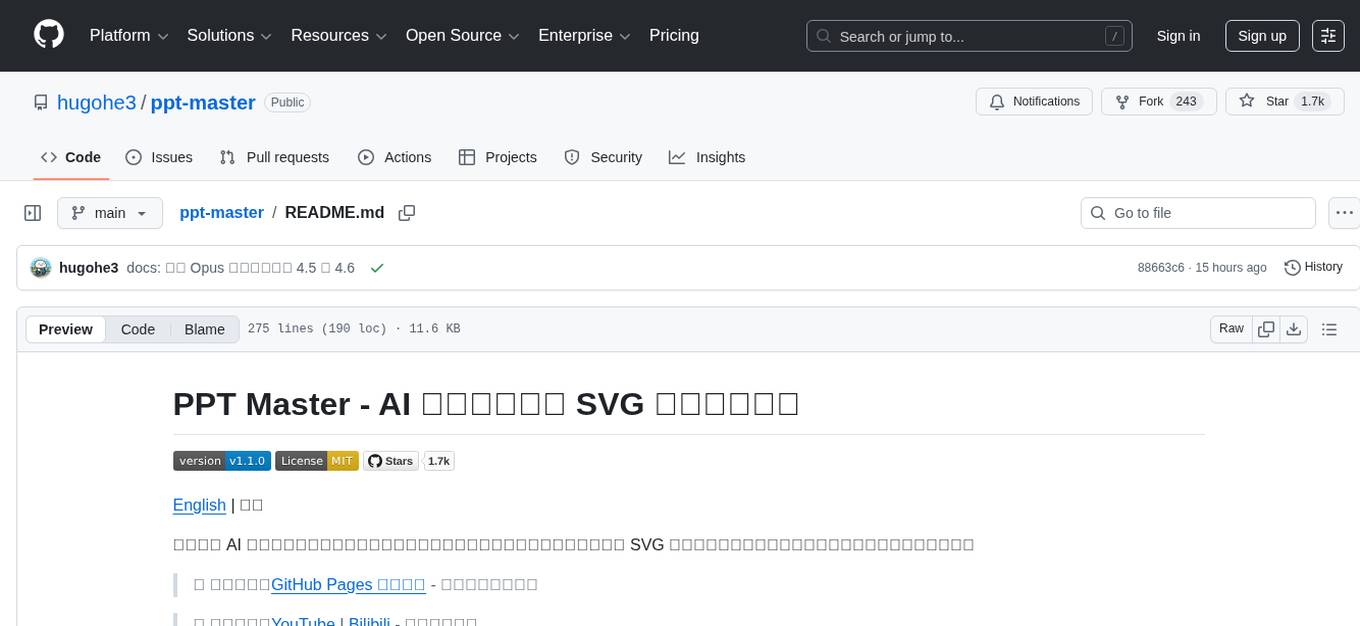
ppt-master
PPT Master is an AI-driven intelligent visual content generation system that converts source documents into high-quality SVG content through multi-role collaboration, supporting various formats such as presentation slides, social media posts, and marketing posters. It provides tools for PDF conversion, SVG post-processing, and PPTX export. Users can interact with AI editors to create content by describing their ideas. The system offers various AI roles for different tasks and provides a comprehensive documentation guide for workflow, design guidelines, canvas formats, image embedding best practices, chart templates, quick references, role definitions, tool usage instructions, example projects, and project workspace structure. Users can contribute to the project by enhancing design templates, chart components, documentation, bug reports, and feature suggestions. The project is open-source under the MIT License.
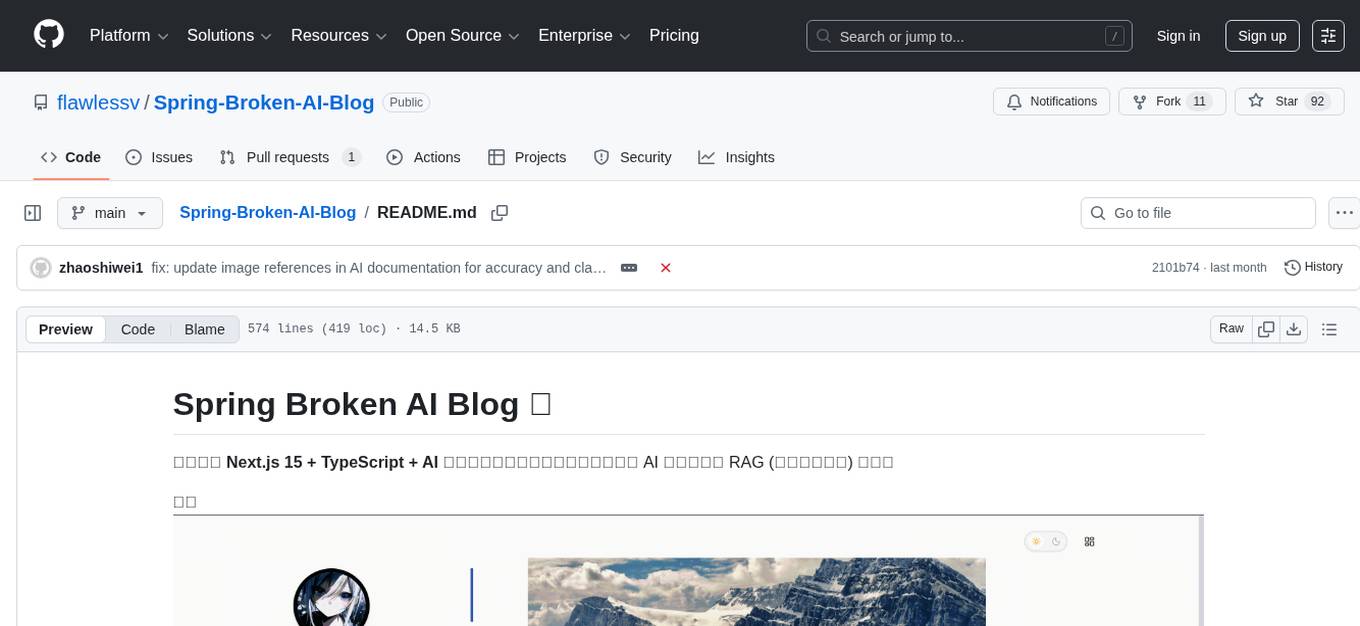
Spring-Broken-AI-Blog
Spring Broken AI Blog is a modern intelligent blog system built on Next.js 15 + TypeScript + AI, integrating AI assistant and RAG (retrieval-augmented generation) functions. It features modern frontend using Next.js with App Router and Turbopack, full-stack TypeScript support, headless components with shadcn/ui + Radix UI + Tailwind CSS, NextAuth.js v4 + JWT authentication strategy, Prisma ORM with SQLite/PostgreSQL, ESLint + Prettier + Husky for code quality, and responsive design. The AI highlights include AI writing assistant based on Kimi API, vector index system using ChromaDB + Ollama for local vector storage, RAG chat function for intelligent Q&A based on article content, AI completion feature for smart content continuation in the editor, AI recommendations for automatic category and tag suggestions, and real-time display of AI-generated content.
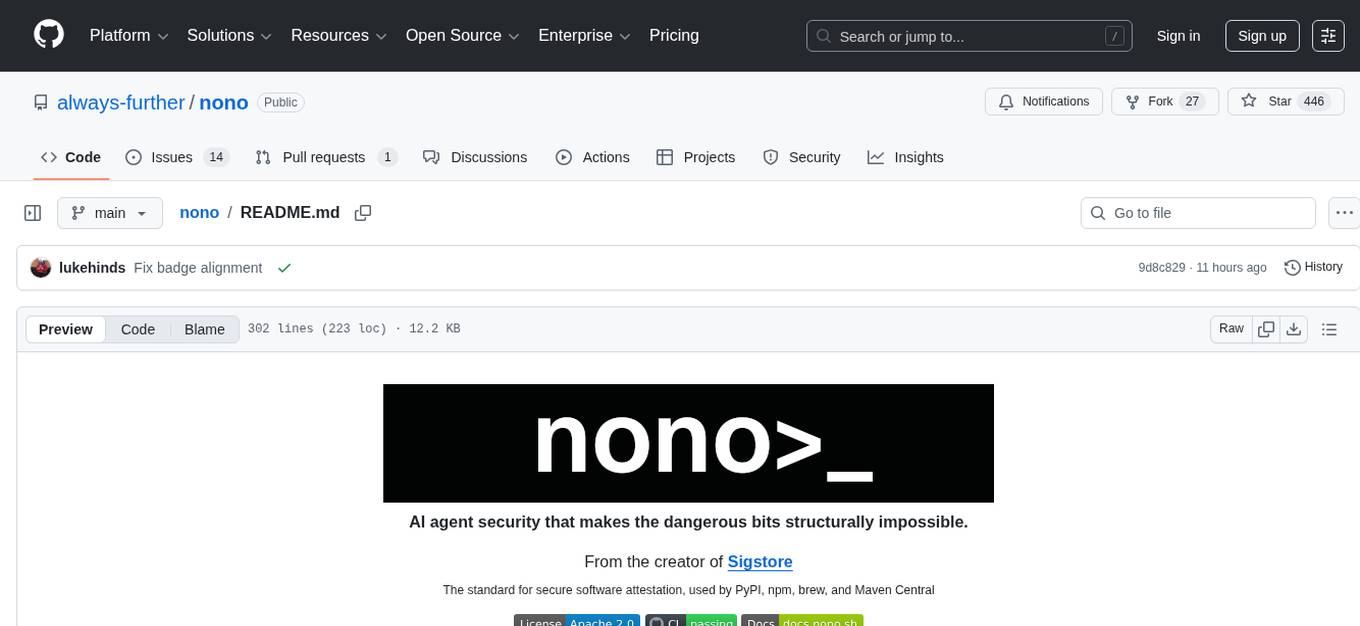
nono
nono is an AI agent security tool that provides kernel-enforced sandboxing to block unauthorized access at the syscall level, deny destructive commands, securely inject secrets, and maintain tamper-resistant trails. It offers a CLI tool with built-in profiles and a Rust library for embedding into applications. The tool aims to make dangerous actions structurally impossible by applying irreversible security measures and supervisor approval for actions outside permissions.
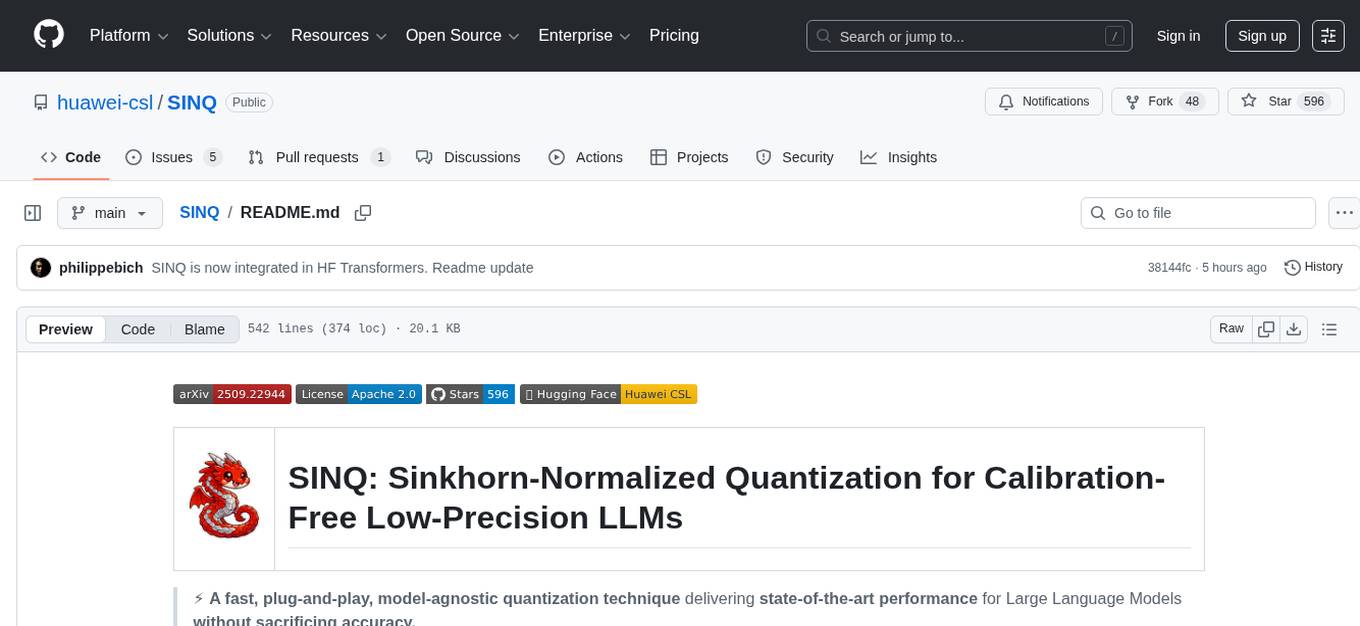
SINQ
SINQ (Sinkhorn-Normalized Quantization) is a novel, fast, and high-quality quantization method designed to make any Large Language Models smaller while keeping their accuracy almost intact. It offers a model-agnostic quantization technique that delivers state-of-the-art performance for Large Language Models without sacrificing accuracy. With SINQ, users can deploy models that would otherwise be too big, drastically reducing memory usage while preserving LLM quality. The tool quantizes models using dual scaling for better quantization and achieves a more even error distribution, leading to stable behavior across layers and consistently higher accuracy even at very low bit-widths.
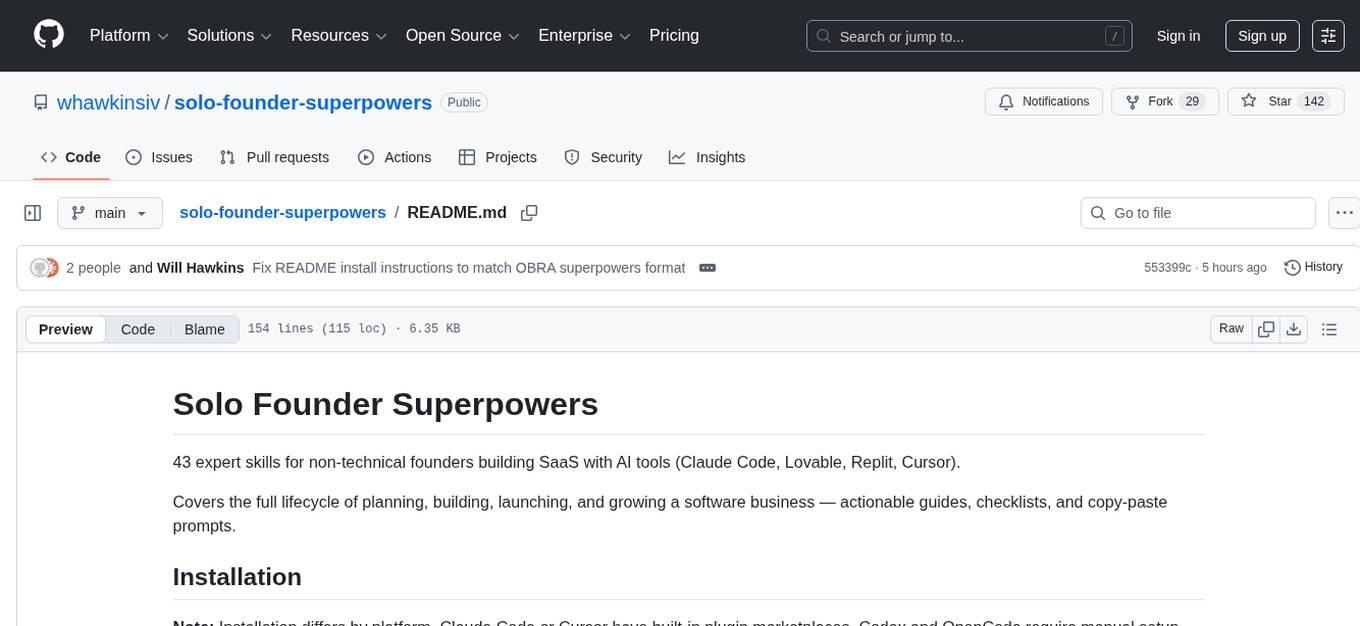
solo-founder-superpowers
Solo Founder Superpowers is a comprehensive guide for non-technical founders building SaaS products with AI tools. It covers 43 expert skills across various aspects of planning, building, launching, and growing a software business. The repository provides actionable guides, checklists, and copy-paste prompts to assist founders in their entrepreneurial journey. Skills range from development and technical aspects to design, SEO, growth marketing, strategy, business operations, and more. The tool aims to empower solo founders with the necessary knowledge and resources to succeed in the competitive tech industry.
| Screenshot | Name | Type | Metrics | Entry Date |
|---|---|---|---|---|

|
LightAgent | github | 574 | 2026-02-21 00:11:58.729000 |

|
vue-stream-markdown | github | 182 | 2026-02-21 00:11:39.417000 |

|
joinly | github | 433 | 2026-02-21 00:11:38.228000 |

|
science-codeevolve | github | 55 | 2026-02-21 00:11:26.821000 |

|
smart-ralph | github | 173 | 2026-02-21 00:11:16.450000 |

|
flutter-ai-rules | github | 472 | 2026-02-21 00:10:32.360000 |

|
calfkit-sdk | github | 86 | 2026-02-21 00:10:18.667000 |

|
finnts | github | 243 | 2026-02-21 00:10:15.662000 |

|
strix | github | 20.2k | 2026-02-21 00:10:10.548000 |

|
llm.rb | github | 104 | 2026-02-21 00:10:02.013000 |

|
gambit | github | 196 | 2026-02-21 00:08:53.068000 |

|
language-ai-engineering-lab | github | 81 | 2026-02-21 00:07:47.076000 |

|
oreilly-llm-rl-alignment | github | 52 | 2026-02-21 00:07:45.827000 |

|
bmalph | github | 52 | 2026-02-21 00:07:43.080000 |

|
biomcp | github | 419 | 2026-02-21 00:07:40.117000 |

|
maclocal-api | github | 139 | 2026-02-21 00:07:38.757000 |

|
seline | github | 133 | 2026-02-21 00:07:37.473000 |

|
vibesdk | github | 4.8k | 2026-02-21 00:07:23.645000 |

|
denodo-ai-sdk | github | 64 | 2026-02-21 00:07:18.841000 |

|
mxcp | github | 57 | 2026-02-21 00:07:14.195000 |

|
groundup-toolkit | github | 61 | 2026-02-21 00:07:07.673000 |

|
tinyclaw | github | 53 | 2026-02-21 00:06:59.361000 |

|
ai-atlas-nexus | github | 114 | 2026-02-21 00:06:58.148000 |

|
open-gamma | github | 118 | 2026-02-21 00:06:35.640000 |

|
Risuai | github | 1.3k | 2026-02-21 00:06:23.465000 |

|
nullclaw | github | 1.1k | 2026-02-21 00:06:18.943000 |

|
jat | github | 144 | 2026-02-21 00:06:06.989000 |

|
agents | github | 234 | 2026-02-21 00:05:47.885000 |

|
hackerai | github | 303 | 2026-02-21 00:05:39.430000 |

|
pup | github | 304 | 2026-02-21 00:05:36.190000 |

|
copilot-collections | github | 102 | 2026-02-21 00:05:34.944000 |

|
aiosonic | github | 170 | 2026-02-21 00:05:23.150000 |

|
ai-team-skills | github | 56 | 2026-02-21 00:05:04.955000 |

|
celeste-python | github | 204 | 2026-02-21 00:04:42.844000 |

|
Git-Friend | github | 592 | 2026-02-21 00:04:07.901000 |

|
room | github | 105 | 2026-02-21 00:03:59.727000 |

|
mcpproxy-go | github | 125 | 2026-02-21 00:03:49.585000 |

|
zeroclaw | github | 15.6k | 2026-02-21 00:03:48.323000 |

|
chromadb-chart | github | 55 | 2026-02-21 00:03:36.369000 |

|
lm-proxy | github | 73 | 2026-02-20 00:12:00.842000 |

|
verifywise | github | 225 | 2026-02-20 00:11:46.951000 |

|
AI-penetration-testing | github | 91 | 2026-02-20 00:11:24.221000 |

|
Multiverse_of_100-_data_science_project_series | github | 130 | 2026-02-20 00:11:19.489000 |

|
flyto-core | github | 59 | 2026-02-20 00:11:07.737000 |

|
linux-mcp-server | github | 173 | 2026-02-20 00:10:47.234000 |

|
pegainfer | github | 96 | 2026-02-20 00:10:04.272000 |

|
awesome-pi-agent | github | 114 | 2026-02-20 00:09:00.093000 |

|
llm-for-zotero | github | 101 | 2026-02-20 00:07:44.910000 |

|
De-AI-Prompt-Enhancer-Writer-Booster-SKILL | github | 115 | 2026-02-20 00:07:29.337000 |

|
NadirClaw | github | 99 | 2026-02-20 00:07:20.879000 |

|
nexus-ai-chat-importer | github | 130 | 2026-02-20 00:07:06.441000 |

|
End-to-End-Data-Pipeline | github | 82 | 2026-02-20 00:07:03.186000 |

|
Aimer_WT | github | 53 | 2026-02-20 00:06:28.408000 |

|
marionette_mcp | github | 151 | 2026-02-20 00:06:23.255000 |

|
Daft | github | 5.2k | 2026-02-20 00:06:21.913000 |

|
AI-Vibe-Writing-Skills | github | 95 | 2026-02-20 00:06:14.919000 |

|
InferenceX | github | 508 | 2026-02-20 00:05:42.742000 |

|
metis | github | 470 | 2026-02-20 00:05:25.776000 |

|
sbnb | github | 334 | 2026-02-20 00:05:22.244000 |

|
athas | github | 2.0k | 2026-02-20 00:05:17.462000 |

|
nWave | github | 108 | 2026-02-20 00:05:10.934000 |

|
orca | github | 1.2k | 2026-02-20 00:04:50.558000 |

|
compl-ai | github | 179 | 2026-02-20 00:04:40.027000 |

|
openclaw.ai | github | 173 | 2026-02-20 00:04:22.460000 |

|
deciduous | github | 86 | 2026-02-20 00:03:26.940000 |

|
AIStudioToAPI | github | 530 | 2026-02-20 00:03:13.401000 |

|
claude_code_bridge | github | 1.2k | 2026-02-19 00:11:36.136000 |

|
LlamaBarn | github | 932 | 2026-02-19 00:11:32.983000 |

|
ruby_llm-monitoring | github | 52 | 2026-02-19 00:11:19.582000 |

|
sdk | github | 74 | 2026-02-19 00:11:18.360000 |

|
sgr-agent-core | github | 995 | 2026-02-19 00:11:13.709000 |

|
Memori | github | 12.1k | 2026-02-19 00:11:03.589000 |

|
ultracontext | github | 132 | 2026-02-19 00:10:58.846000 |

|
balatrollm | github | 62 | 2026-02-19 00:10:47.467000 |

|
llamafile | github | 23.7k | 2026-02-19 00:10:19.582000 |

|
haystack-integrations | github | 99 | 2026-02-19 00:10:00.210000 |

|
dotnet-slopwatch | github | 61 | 2026-02-19 00:09:46.954000 |

|
doc-scraper | github | 77 | 2026-02-19 00:08:04.447000 |

|
NeuroSploit | github | 804 | 2026-02-19 00:07:31.269000 |

|
ai-on-eks | github | 162 | 2026-02-19 00:07:24.260000 |

|
Open-Docs | github | 52 | 2026-02-19 00:07:21.280000 |

|
LinJun | github | 154 | 2026-02-19 00:07:02.929000 |

|
openapi-to-skills | github | 90 | 2026-02-19 00:06:52.901000 |

|
agent-zero | github | 14.9k | 2026-02-19 00:06:34.940000 |

|
kilo | github | 114 | 2026-02-19 00:06:28.589000 |

|
git-ai | github | 1.1k | 2026-02-19 00:06:25.697000 |

|
postman-mcp-server | github | 171 | 2026-02-19 00:06:21.206000 |

|
OpenGradient-SDK | github | 74 | 2026-02-19 00:06:04.182000 |

|
sosumi.ai | github | 274 | 2026-02-19 00:06:00.955000 |

|
Legacy-Modernization-Agents | github | 135 | 2026-02-19 00:05:42.292000 |

|
models | github | 63 | 2026-02-19 00:05:18.537000 |

|
Project-AI-MemoryCore | github | 87 | 2026-02-19 00:05:07.891000 |

|
peon-ping | github | 2.4k | 2026-02-19 00:05:05.056000 |

|
Kubeli | github | 229 | 2026-02-19 00:04:29.353000 |

|
AISVS | github | 53 | 2026-02-19 00:04:28.120000 |

|
ppt-master | github | 1.7k | 2026-02-19 00:04:13.137000 |

|
Spring-Broken-AI-Blog | github | 92 | 2026-02-19 00:04:05.412000 |

|
nono | github | 463 | 2026-02-19 00:03:41.312000 |

|
SINQ | github | 596 | 2026-02-19 00:03:28.288000 |

|
solo-founder-superpowers | github | 142 | 2026-02-19 00:03:21.668000 |